Addressing Racism in Our School Sports





Last year, America mourned the tragic suicides of two Black men who were celebrated for their exceptional talents and renowned for their achievements in the entertainment world and their links to Hollywood. The first was Stephen “tWitch” Boss, a co-executive producer and guest DJ on the Ellen DeGeneres Show. The second
was Ian Alexander Jr., who was the son of Academy Awardwinning actress Regina King. Away from national headlines, tens of thousands of families across the United States are grieving over loved ones who took their own lives – with men outnumbering women four to one as states across the country – including California – report alarming suicide rates every year.
See SUICIDE page 24
By Jaivon Grant CALIFORNIA BLACK MEDIA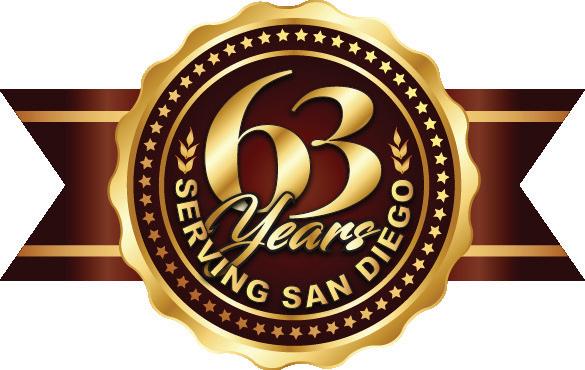

Prejudice, loneliness, isolation, rejection by their peers, high rates of bullying, low social integration and learning difficulties are just some of the negative experiences autistic people live through every day, researchers who study autism spectrum disorder (ASD) report.
Earlier this year, the Centers for Disease Control and Prevention (CDC) reported that the rate of ASD occurrence is increasing among African Americans across the country—and here in California, too. ASD advocates say those findings are alarming because Black families have historically been excluded, overlooked and under-informed when it comes to receiving resources and services for their loved ones living with the condition.


Janet Jones-Jordan, Senior Director of
Community Inclusion for Autism Speaks says that although ASD affects people of all races and ethnicities, there are disparities that make it difficult for Black families— especially those who may be low-resourced or underserved—to have access to care and equity of resources.



“The cost of diagnostic tests for autism can be an issue because they cost $4,000 to $6,000, and most private facilities do not accept insurance for those initial tests,” says Jones-Jordan. “Food insecurity can also be a barrier because if families are more concerned about their housing needs and how they’re going to feed their families, healthcare may be delayed to ensure other pertinent needs are addressed.”


See AUTISM page 24
 By Associated Press
By Associated Press



Black teen Ralph Yarl was shot twice, in the head and arm, after going to the wrong home in Kansas City, Missouri, to pick up his younger brothers.

Andrew Lester, an 84-year-old white man, told police he fired at honors student Yarl, 16, out of fear on Thursday, April 13. But whether Lester will ultimately claim self-defense in court has yet to be seen. The case raises anew questions about race relations in the United States.


Here’s a look at what happened, where the criminal case stands, how the teen is faring and the role gun laws in Missouri could play in the case.
Yarl mixed up an address. Instead of going to 115th Terrace to pick up his twin brothers Thursday night, Yarl
• Making Mental Health and Wellness a Priority so All Students Can Thrive
• Connecting Families with Medical and Mental Health Care, Food Assistance, and More


• Providing Counseling Support for Students
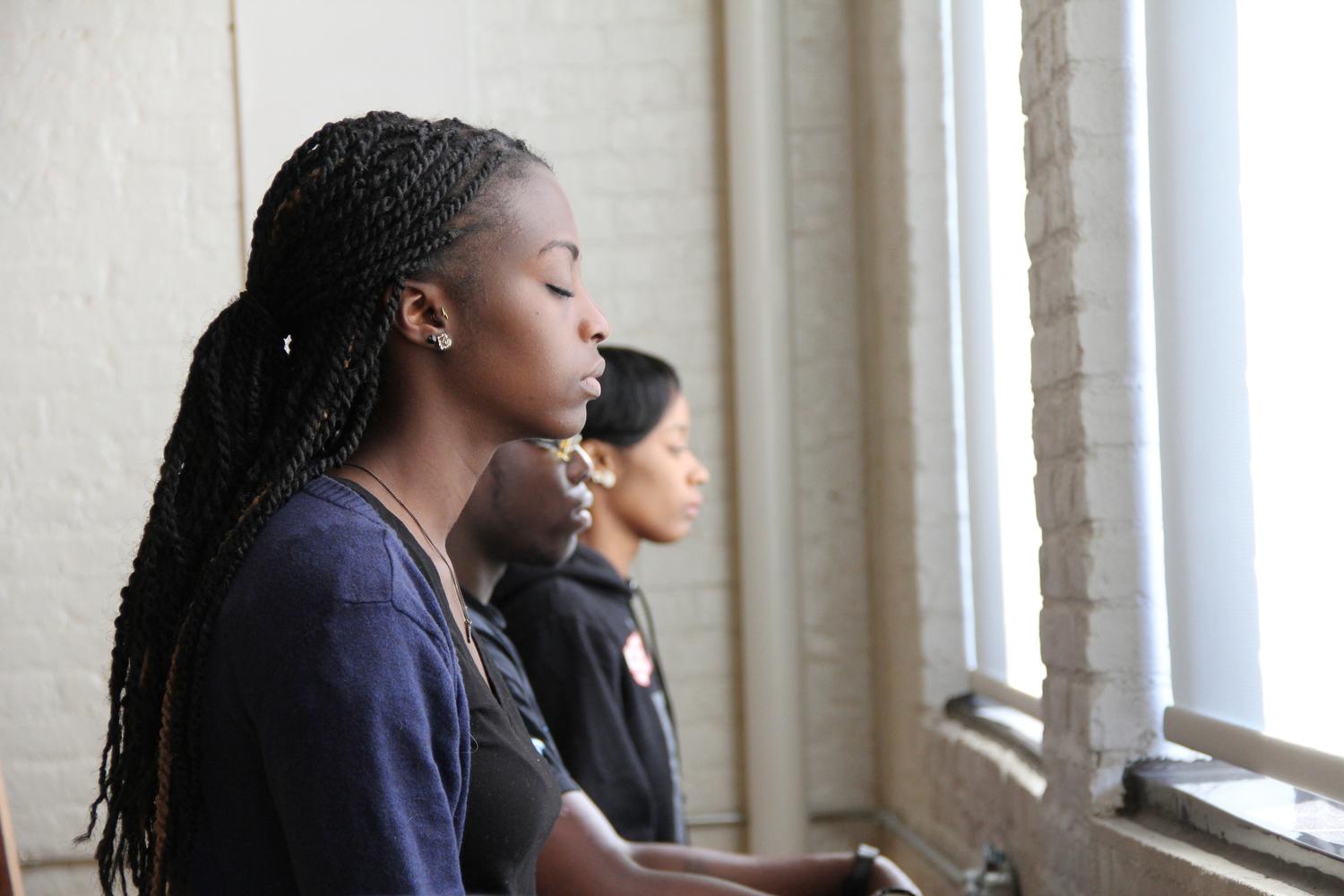
• Creating Community Schools with Health and Wellness Resources for Students and Families

• Offering Free, Nutritious School Meals for All Students to Support Healthy Brains & Bodies
• Teaching Students Healthy Lifestyle Habits through Physical Education and Nutrition Education
• Prioritizing Staff Wellbeing with Generous Benefits Packages and Health and Wellness Resources Year-Round
San Diego Unified School District is Committed to Supporting the Physical and Mental Health of our Students, Staff, and our School Communities
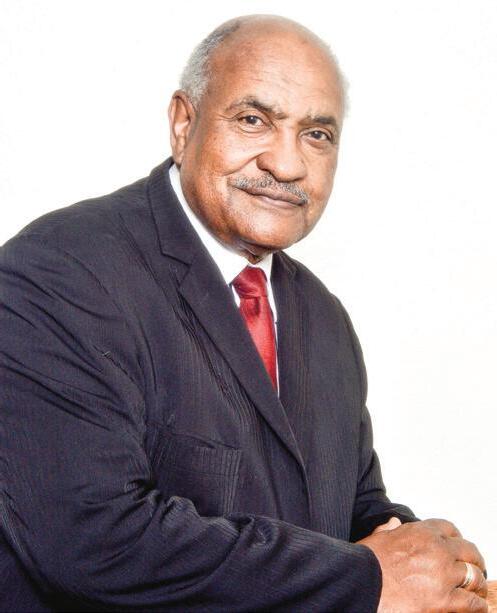
This Fifth Annual Minority Health Special Issue contains some information that expands upon what we have done in the last four years by not only providing some key updates on Blacks and African Americans as well as the other major ethnic groups, but also including a number of excerpts from surveys, articles and reports concerning Minority Health. This
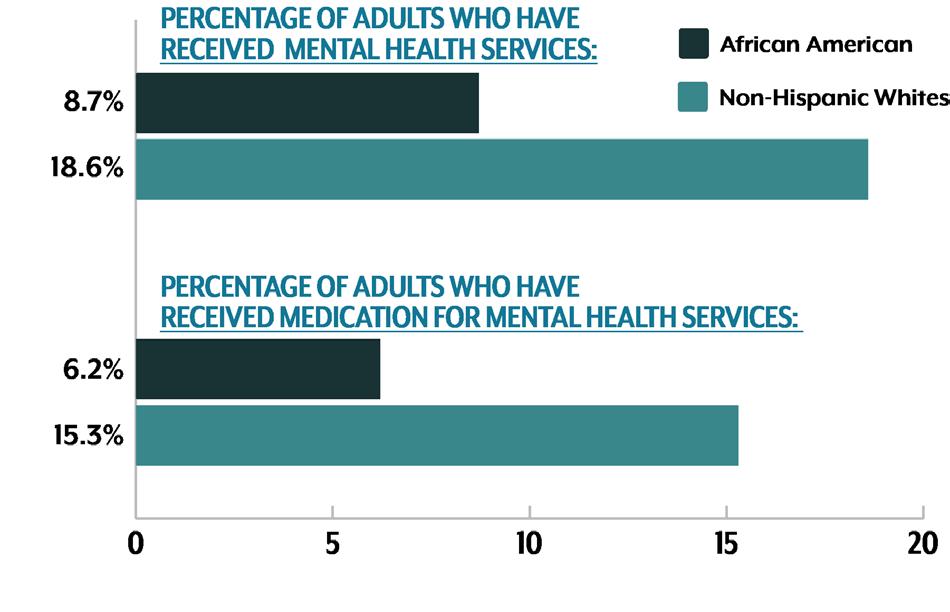
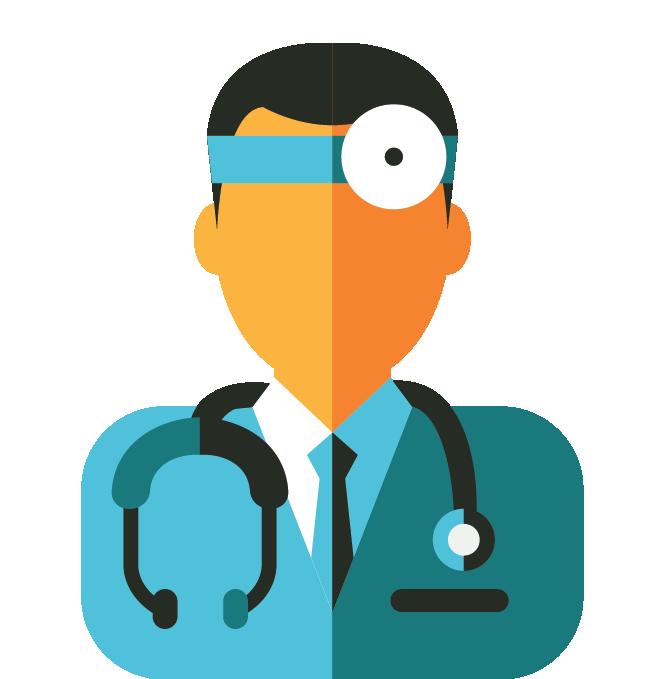
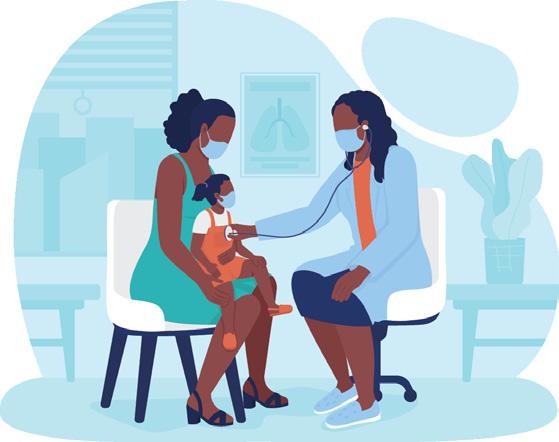

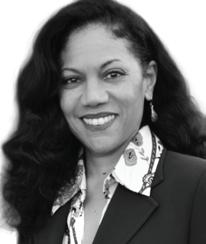
issue is a compilation of information gathered from a number of sources such as the Office of Minority Health within the U.S. Department of Health and Human Services, the Centers for Disease Control and Prevention, the San Diego County Department of Health and Human Services, as well as other resources listed below. All of our information is in the public domain.

The San Diego Voice & Viewpoint has enjoyed a partnership with



the San Diego County Health and Human Services Agency which has allowed us to not only share information during the pandemic and since in all areas of healthcare. This year we are providing more information on mental health because of the growth in need and services referred to as behavioral science. While, this year, we continue looking at the five major minority groups in our discussions of minority health, we are still seriously missing more detailed information on our African populations, even though we refer to Black and
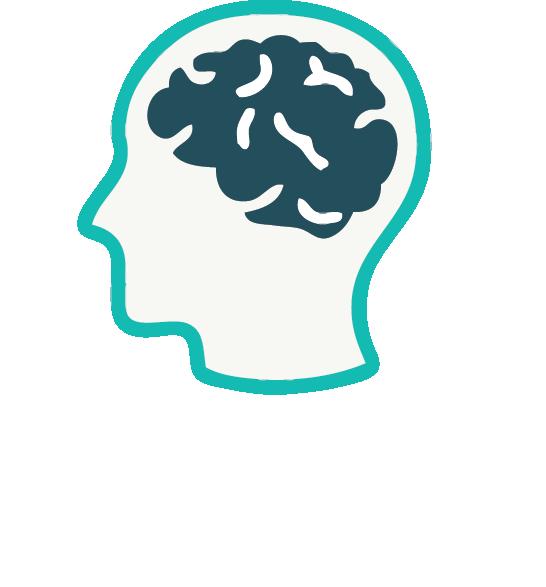
African American people when referring to the research.
The groups identified in this issue are Black/African American, Asian American, American Indian/Alaska Native, and Native Hawaiian/ Pacific Islander. Members of these groups can be found here in San Diego County and all are affected by the health issues we are about to discuss. To follow is a brief profile of each group. This will better help us understand the health disparities experienced by each of them.
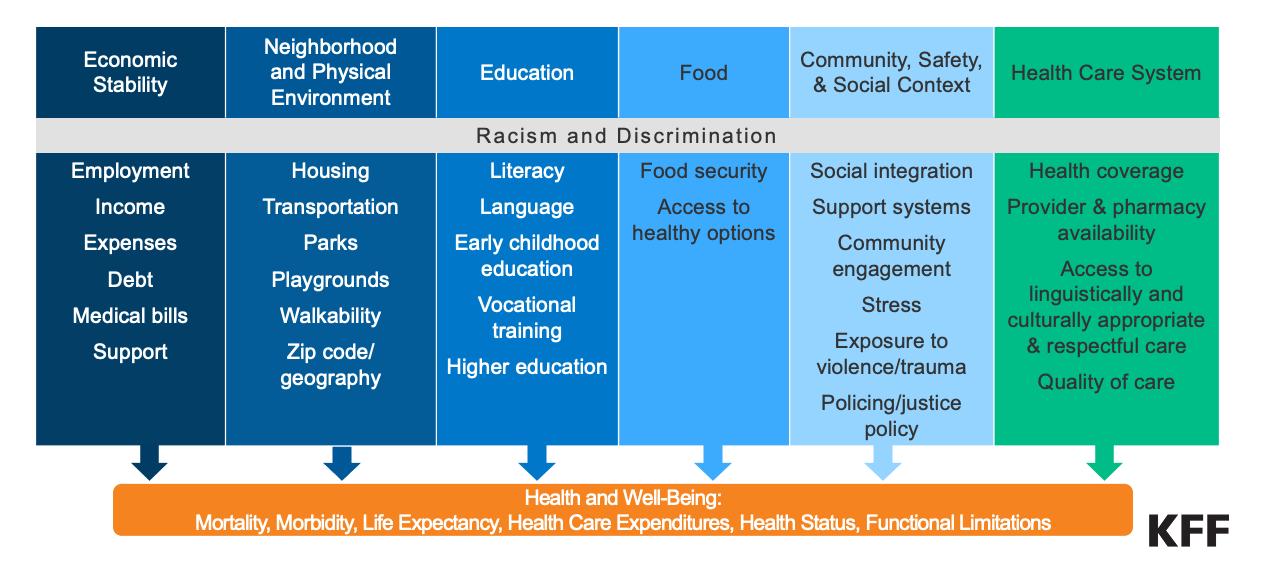
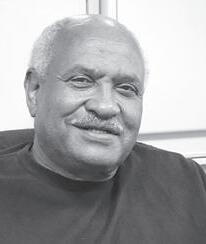
The COVID-19 pandemic has exploded into a global crisis with
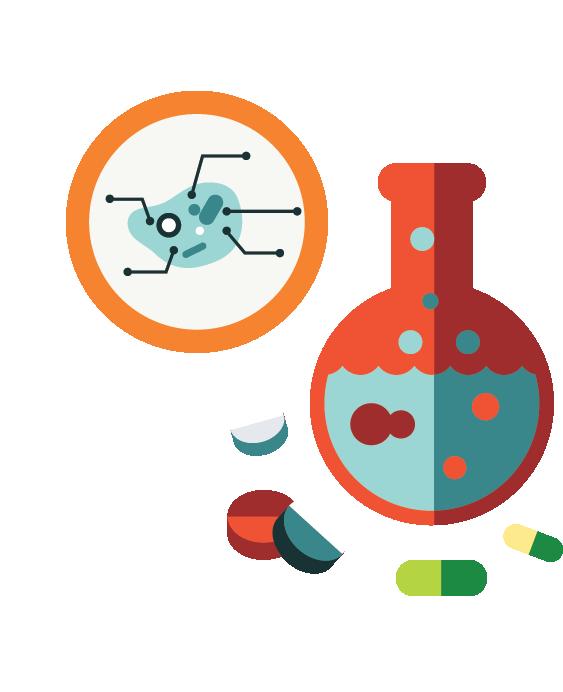
particular impact on people of color. As you probably know by now, the death rate has been highest among many of those who were frontline workers. Many of these were people of color. We have covered some of the economic impacts.
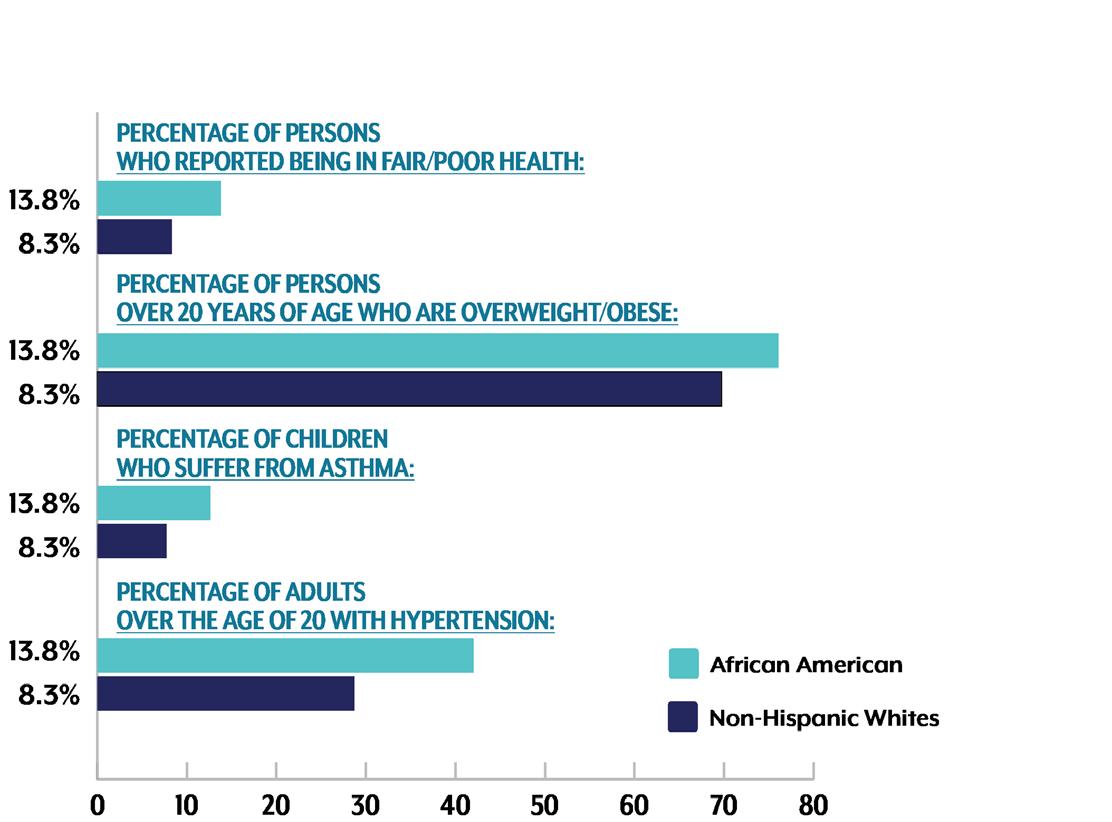

The Voice & Viewpoint deeply appreciates the assistance and support it has received from the San Diego County Health and Human Services Agency in particular and all those who have contributed to this particular issue. We welcome your feedback and remind you that this issue is available online.
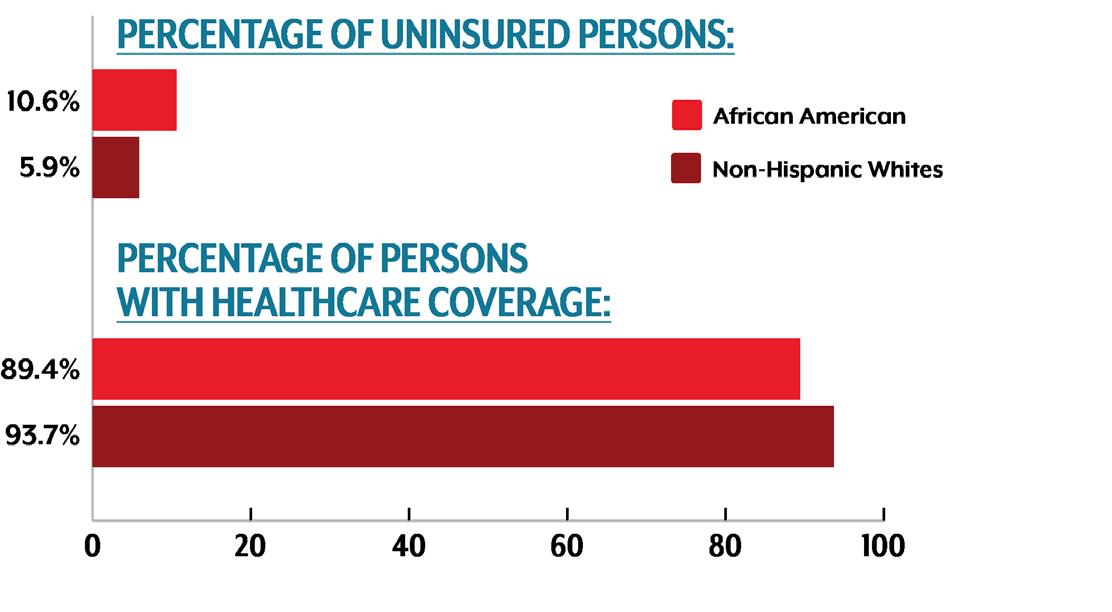
Black people make up 12% of the population in the United States as of 2021

The Black population has grown by nearly 30% since 2000, with the increase in foreign born Black people playing a significant role in this growth. As the population has grown, it has become more diverse, with an increase in the share of Black people who identify as multiracial and/or Hispanic.
The share of the population who identified as people of color has been growing over time, with the largest growth occurring among those who identify as Hispanic or Asian. The racial diversity of the population is expected to continue to increase, with people of color projected to account for over half of the population by 2050. Proposed changes to how data on race/ethnicity are collected and reported may also influence measures of the diversity of the population, as recent refinements in these questions and how they were coded have led to a growing share of people identifying as some other race or multiracial.
Demographic Overview: In 2021, 40.1 million people in the United States were non-Hispanic black alone, or 12.1 percent of the total population of 331.9 million. Blacks/African Americans are the second largest minority population in the United States, following the Hispanic/Latino population. In 2021, most of the US population lived in the South (38.4 percent of the total U.S. population). The ten states with the largest non-Hispanic black population in 2020 were Alabama, Arkansas, Delaware, Georgia, Louisiana, Maryland, Mississippi, North Carolina, South Carolina, and Virginia.
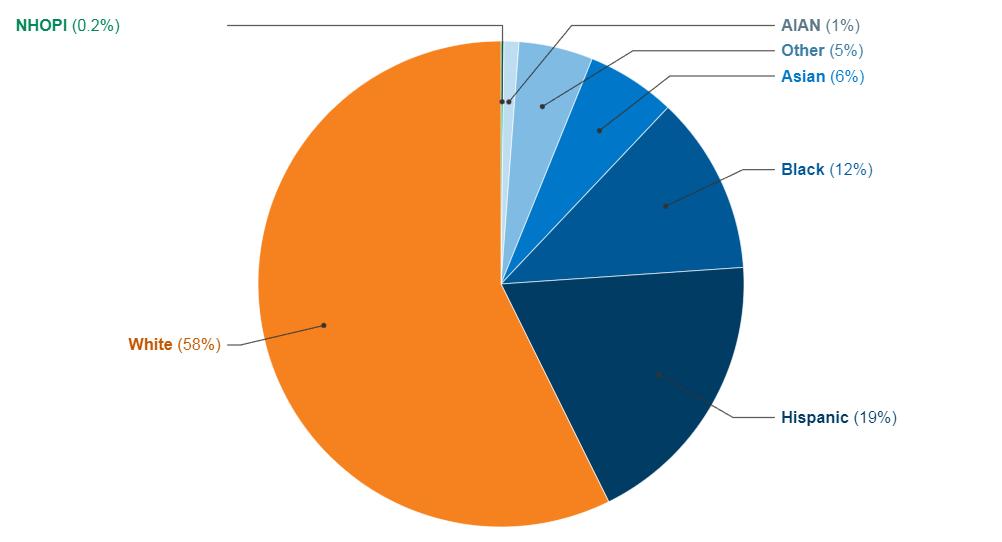
Educational Attainment: In 2021, as compared to non-Hispanic whites 25 years and over, 87.9 percent of non-Hispanic blacks had earned at least a high school diploma, and 24.7 percent had a bachelor’s degree or higher. More black women than black men had earned at least a bachelor’s degree (16.0 percent vs 14.0 percent). 9.8 percent of non-Hispanic blacks have a graduate or advanced professional degree, as compared to 15.0 percent of the non-Hispanic white population.
Economics: According to the Census Bureau in 2021, the average non-Hispanic black median household income was $48,297 in comparison to $77,999 for non-Hispanic white households. 19.5 percent of non-Hispanic blacks in comparison to 10.0 percent of non-Hispanic whites were living at the poverty level. In 2020, the unemployment rate
for non-Hispanic blacks 25 years and over was higher than that of non-Hispanic whites (9.9. percent and 6.4 percent, respectively).
Insurance Coverage: In 2021, 55.1 percent of non-Hispanic blacks in comparison to 73.2 percent of non-Hispanic whites used private
ment. Studies on urban American Indian and Alaska Native populations have documented a frequency of poor health and limited health care options. 2020 Census Bureau projections suggest life expectancies at birth are 78.4 years, with 81.1 years for women, and 75.8 years for men*. Significantly, American
health insurance. Also in 2021, 42.7 percent of non-Hispanic blacks in comparison to 34.6 percent of non-Hispanic whites relied on Medicaid or public health insurance. Finally, 9.0 percent of non-Hispanic blacks in comparison to 5.2 percent of non-Hispanic whites were uninsured.
Health: According to Census Bureau projections, the 2021 life expectancies at birth for blacks are 70.8 years, with 74.8 years for women, and 66.7 years for men. For non-Hispanic whites, the projected life expectancies are 76.4 years, with 79.2 years for women, and 73.7 years for men*. The death rate for Blacks/African Americans is generally higher than whites for COVID-19, heart disease, stroke, cancer, asthma, influenza and pneumonia, diabetes, HIV/AIDS, and homicide.


Demographics/Health Overview: This population includes people having origins in any of the original peoples of North, South America, and Central America, who maintain tribal affiliation or community attach -
Black people make up 12% of the population in the United State as of 2021. The Black population has grown by nearly 30% since 2000, with the increase in foreign born Black people playing a significant role in this growth.
Black people face increased barriers to accessing and utilizing health care. Black people are more likely to report financial barriers to receiving health care. While the implementation of the Affordable Care Act and pandemic-era policies have helped narrow some disparities in health coverage, Black people are more likely to face social and economic challenges that adversely
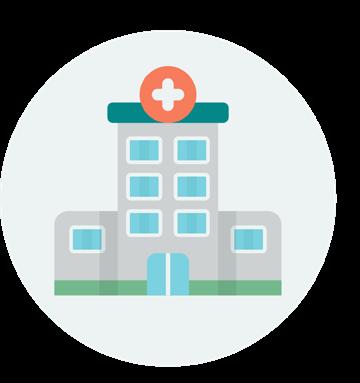
impact health, including higher rates of poverty and food insecurity. Black adults are also more likely than White adults to report being treated unfairly because of
or family members. Reflecting these inequities, Black people report having worse health outcomes compared to White people.
Indians/Alaska Natives frequently contend with issues (cultural barriers, geographic isolation, inadequate sewage disposal, and low income) that prevent them from receiving quality medical care. Leading diseases and causes of death among AI/AN are heart disease, cancer, unintentional injuries (accidents), diabetes, and stroke. AI/ANs also have a high prevalence and risk factors for mental health and suicide, unintentional injuries, obesity, substance use, sudden infant death syndrome (SIDS), teenage pregnancy, diabetes, liver disease, and hepatitis, and a 2019 tuberculosis rate almost 7 times higher than the white population.
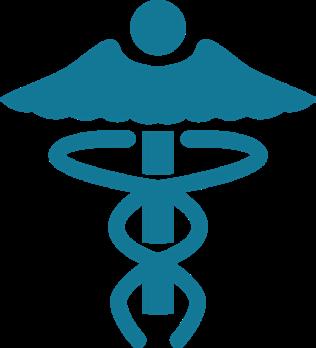
Asian Americans
Demographics/Health Overview: This racial group is defined as people having origins in any of the original peoples of East Asia, Southeast Asia, or the Indian subcontinent. 2020 Census Bureau projections included life expectancies at birth for Asian Americans are 80.7 years, with 82.7 years for women, and 78.4 years for men*. Some negative factors influencing Asian American health include infrequent medical visits, language and cultural barriers, and lack of health insurance.
their race/ethnicity while seeking care for themselves
Black people have the highest rates of infant mortal -
ity and maternal mortality across all racial and ethnic groups for which data were available and experienced the largest increase in maternal mortality when compared to pre-pandemic levels.
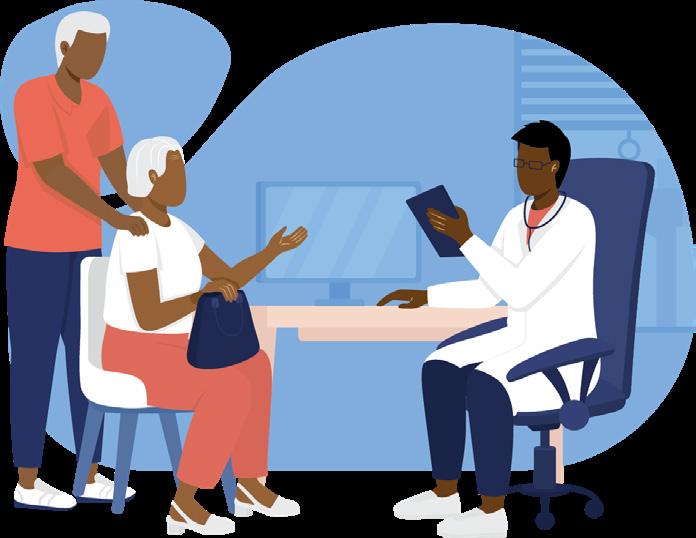
Ongoing racism and discrimination, police violence against and killings of Black people, and gun violence also negatively impact health and well-being of Black people. Black people’s repeated and chronic expo -
Asian Americans are most at risk for: cancer, heart disease, stroke, unintentional injuries (accidents), and diabetes, with a high prevalence and risk factors for chronic obstructive pulmonary disease, hepatitis B, HIV/AIDS, smoking, tuberculosis, and liver disease. In 2019, tuberculosis was 33 times more common among Asians.
Demographics/Health Overview: This racial group refers to people having origins in any of the original peoples of Hawaii, Guam, Samoa or other Pacific Islands. 2020 Census Bureau projections included life expectancies at birth for Native Hawaiians/ Pacific Islanders were 80.8 years, with 83.2 years for women, and 78.5 years for men*. Significantly, in comparison to other ethnic groups, Native Hawaiians/ Pacific Islanders have higher rates of smoking, alcohol consumption, and obesity. They also have less access to cancer prevention and control programs. Leading causes of death include: cancer, heart disease, unintentional injuries (accidents), stroke and diabetes. Other prevalent health conditions and risk factors among Native Hawaiians/Pacific Islanders are hepatitis B, HIV/AIDS, and tuberculosis, with 2019 tuberculosis rates at 37 times the U.S. white population.
Demographics/Health Overview: This ethnic group includes any person of Cuban, Mexican, Puerto Rican, South or Central American, or other Spanish culture or origin, regardless of race. The 2020 Census Bureau projects the 2060 life expectancies at birth for Hispanics are 86.5 years, with 88.2 years for women, and 84.8 years for men. For non-Hispanic whites, the projected life expectancies are 85.6 years, with 87.4 years for women, and 84.0 years for men. Some negative health factors include language/cultural barriers, lack of access to preventive care, and the lack of health insurance. In 2020, the leading cause of death for Hispanics was COVID-19. Other significant causes of mortality for Hispanics include chronic lower respiratory diseases (including asthma and chronic obstructive pulmonary disease), liver disease, influenza and pneumonia, suicide, and kidney disease. Hispanics have higher rates of obesity than non-Hispanic whites.

*For non-Hispanic whites the projected life expectancies are 80.6 years, with 82.7 years for women, and 78.4 years for men.


sure to stressors associated with racism and discrimination drive rapid biological


aging and poorer health outcomes. Exposure to police violence has been found to have negative mental health outcomes for Black people and Black youth have been disproportionately affected by gun violence, which can adversely affect the mental health and well-being of children.
Heart disease is the leading cause of death in the United States. The term “heart disease” refers to several types of heart conditions. In the United States, the most common type of heart disease is coronary artery disease (CAD), which can lead to heart attack. You can reduce your risk for heart disease through lifestyle changes and, in some cases, medicine.
How Does Heart Disease / High Blood Pressure Affect African Americans?*
• In 2019, African Americans were 30 percent more likely to die from heart disease.
• We are 30 percent more likely to have high blood pressure, and are less likely to have it under control.
• African American women are nearly 50 percent more likely to have high blood pressure.
What is Cancer?
Lowering Risk:
• Nutrition: Eat healthy diet (increase fresh fruits and vegetables and lower salt intake)
• Weight: Maintain a healthy weight
• Exercise: Be physically active (seek advice from your doctor)
• Smoking: Do not smoke
• Alcohol: Limit alcohol intake
Heart Disease & African Americans
Cancer and African American Men
How Does ASTHMA Affect African Americans?*
• From 2018-2020, 4.0 million non-Hispanic Blacks (adults and children) reported that they currently have asthma.
• We were 30 percent more likely to have asthma in 2019.
• In 2020, we were almost three times more likely to die from asthma related causes.
• In 2020, Black children had a death rate 7.6 times that of non-Hispanic white children.
• Black children were 4.5 times more likely to be admitted to the hospital for asthma.
• While all the causes of asthma remain unclear, children exposed to second -
What is Diabetes?
Cancer is a term used for diseases in which abnormal cells divide without control and can take over other tissues. Cancer cells can spread to other parts of the body through the blood and lymph systems. Cancer is not just one disease, but many diseases.
How Does Cancer Affect African Americans?*
Black/African Americans have the highest mortality rate of any racial and ethnic group for all cancers combined and for most major cancers. Death rates for all major causes of death are higher than for non-Hispanic whites, contributing in part to a lower life expectancy for both Black/African American men and women.
Lowering Risk:
• Making healthy choices, keeping a healthy weight
• Avoiding tobacco
• Limiting alcohol intake
• Protecting your skin. Screening tests can find some cancers early, when treatment works best.

• Vaccines (shots) can help prevent or reduce your cancer risk (example: HPV, hepatitis)
What is Mental and Behavioral Health?
According to the Centers for Disease Control and Prevention (CDC), mental health includes our emotional, psychological, and social well-being. It affects how we think, feel, and act. It also helps determine how we handle stress, relate to others, and make healthy choices. Mental health is important at every stage of life, from childhood and adolescence through adulthood. Behavioral health has more to do with the specific actions people take. It is about how people respond in various scenarios. Behavioral health can be influenced by an individual’s mental health.
How Does Heart Disease / High Blood Pressure Affect African Americans?*
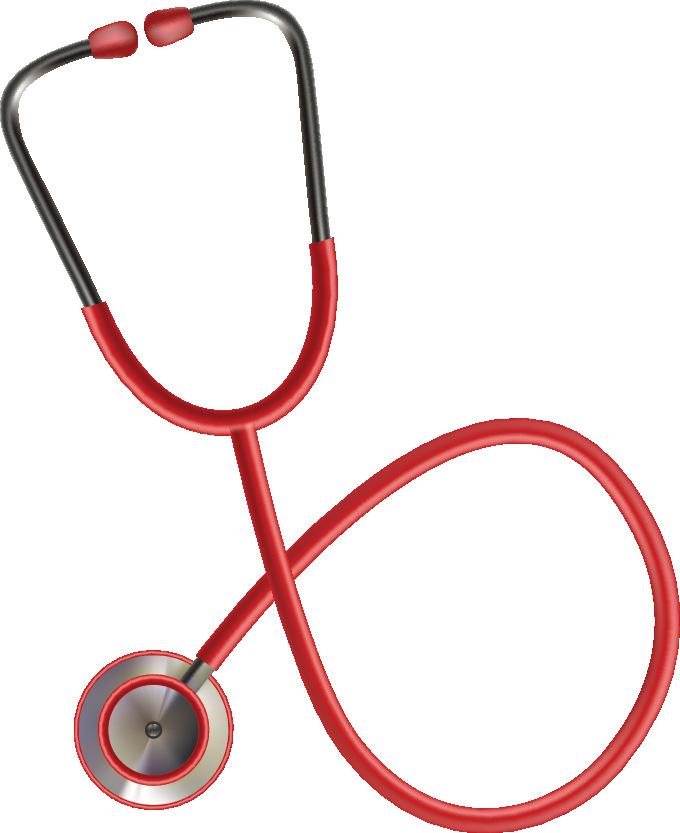
• In 2020, suicide was the third leading cause of death, respectively, for Blacks or African Americans, ages 15 to 24.
• The death rate from suicide for men was four times greater than for women, in 2018.
• Black females, grades 9-12, were 60 percent more likely to attempt suicide in 2019, as compared to non-Hispanic white females of the same age.
• Poverty level affects mental health status. Black or African Americans living below the poverty level are twice as likely to report serious psychological distress.
hand tobacco smoke exposure are at increased risk for acute lower respiratory tract infections, such as bronchitis. Children living below or near the poverty level are more likely to have high levels of blood cotinine, a breakdown product of nicotine.
• Vaccines (shots) can help prevent or reduce your cancer risk (example: HPV, hepatitis)
Asthma and African American Children
DEATH RATE FOR CHILDREN 0-17 YEARS OF AGE, 2020 (DEATHS PER 1,000,000)
Non-Hispanic Non-Hispanic 10.7 1.4
Diabetes is a chronic (long-lasting) health condition that affects how your body turns food into energy. Your body breaks down most of the food you eat into sugar (glucose) and releases it into your bloodstream. When your blood sugar goes up, it signals your pancreas to release insulin. Insulin acts like a key to let the blood sugar into your body’s cells for use as energy. Over time, diabetes can cause serious health problems, such as heart disease, vision loss, and kidney disease. There is currently no cure.
How Does DIABETES Affect African Americans?*
• In 2019, we were twice as likely to die from diabetes.
• In 2018, African American adults were 60 percent more likely to be diagnosed with diabetes by a physician.
• In 2019, we were 2.5 times likely to be
What is OBESITY?
hospitalized with diabetes and associated long-term complications.
Lowering Risk:
• Losing weight
• Eating healthy food
• Being active
• Taking medication as prescribed; receiving diabetes self-management education and support; and being consistent with your medical appointments
DIABETES & African Americans
AGE-ADJUSTED DIABETES DEATH RATES PER 100,000 (2019)
Obesity presents a risk to health. An adult who has a body mass index (BMI) of 30 or higher is considered obese. Among children, overweight is defined on CDC growth charts as a BMI at or above the 85th percentile and lower than the 95th percentile. Obesity is defined as having a BMI at or above the 95th percentile. BMI is based on an individual’s weight and height. Obesity is serious and is associated with the leading causes of death, including deaths from diabetes, heart disease, stroke, and some types of cancer.
How Does OBESITY Affect African Americans?*
• African American women have the highest rates of obesity or being over-
What is Stroke?
weight compared to other groups in the United States. About 4 out of 5 African American women are overweight or obese.
• In 2018, African Americans were 20% less likely to engage in active physical activity.
ADOLESCENT OBESITY & African Americans
PERCENTAGE OF HIGH SCHOOL STUDENTS WHO WERE OBESE, 2019
A stroke, sometimes called a brain attack, occurs when something blocks blood supply to part of the brain or when a blood vessel in the brain bursts. Parts of the brain become damaged or die. A stroke can cause lasting brain damage, long-term disability, or even death.
How Does Stroke Affect African Americans?*
• We are 50% more likely to have a stroke (cerebrovascular disease).
• Black men are 70 percent more likely to die from a stroke
• African American women are twice as likely to have a stroke.
Executive Summary:
California, home to the most culturally diverse population in the country and the fifth-largest Black population of any state, has a major opportunity to be a leader in health equity. But, again and again, research has shown that racism and structural barriers in the health care system prevent Black Californians from achieving the health they actively seek.
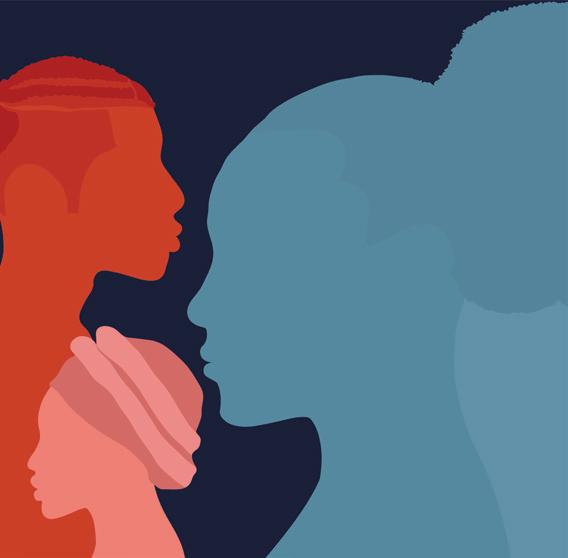
key findings:
Black Californians are highly intentional in their pursuit of physical and mental healtH. Most Black Californians report focusing on their mental health (79%); getting appropriate screenings or preventive care (77%); and tracking health indicators, such as blood pressure and cholesterol (71%); and working to reach or maintain a healthy weight (71%). A strong majority (79%) focus a great deal or quite a bit on their mental health.
Most Black Californians are insured, have a regular provider, and have had at least one visit with a health care provider in the last year. Nine in ten Black Californians (90%) say they currently have health insurance coverage, and 83% have access to a regular provider. Over 9 in 10 Black Californians (92%) have seen a doctor or health care provider in the last year.
Nearly one in three Black Californians has been treated unfairly by a health care provider because of their race or ethnicity. This experience occurs particularly for Black Californians with mental health conditions (47%); for those who identify as LGBTQIA+ (43%); for those with disabilities (40%); and for women (40%). A significant number of Black Californians overall (38%) and of Black women in particular (47%) say there has been a time when a health care provider did not treat their pain adequately.
More than one in four Black Californians avoids care due to concerns that they will be treated unfairly or with disrespect. Even higher numbers of Black Californians who identify as LGBTQIA+ (41%) and those enrolled in Medi-Cal (35%) report having avoided care.
Many Black Californians adopt measures to mitigate potential negative experiences in preparation for a health care visit. Two-thirds (66%) of Black Californians report researching a health condition or concern before meeting with a health care provider, and over one-third (35%) say they have tailored their speech and/or behavior to make a provider feel at ease.


Black Californians agree on the importance of strengthening the patient-provider relationship. Black Californians have clear opinions on how to make the healthcare system work better for them. A strong majority of respondents believe it is extremely important or very important to have access to skilled, equitable healthcare.
98%
Have a provider who listens
73% 97%
Develop more holistic approaches to health care

Have a provider who spends the time needed to answer questions
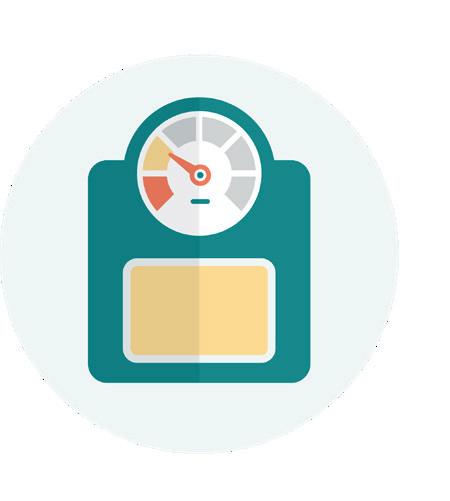

93%
Have a provider who discusses specific health goals

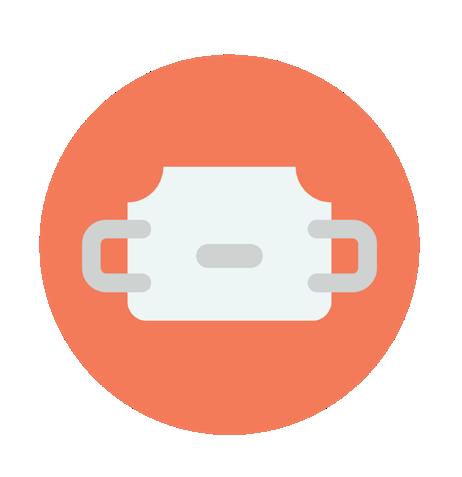
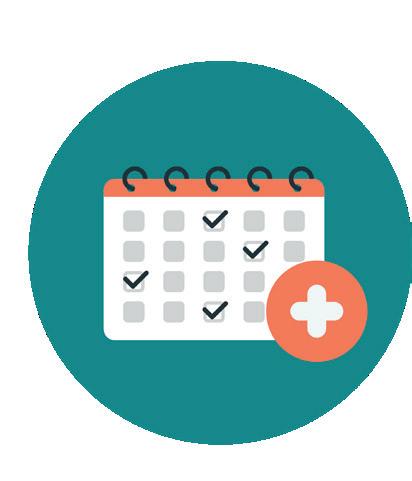

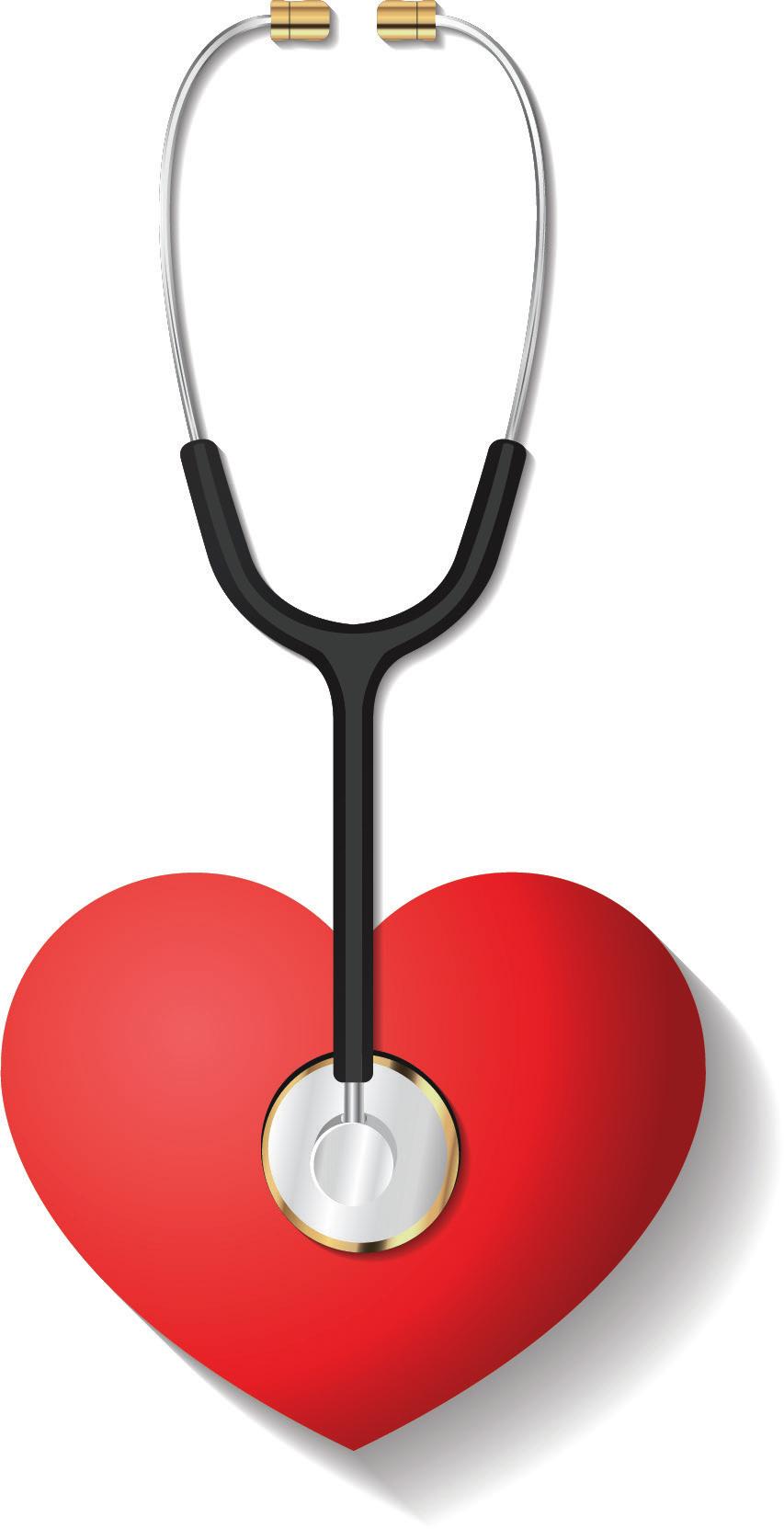
For Black Americans, it is extremely important or very important to:
85%
Increase Black representation among health care leadership
80% 80% 84%
Increase Black representation in the healthcare workforce
Establish more Black-led, community-based clinics
A young mother in California’s Antelope Valley bathes her children and dresses them in neat clothes, making sure they look their very best — at medical appointments. “I brush their teeth before they see the dentist. Just little things like that to protect myself from being treated unfairly,” she told researchers.
A 72-year-old in Los Angeles, mindful that he is a Black man, tries to put providers at ease around him. “My actions will probably be looked at and applied to the whole race, especially if my actions are negative,” he said. “And especially if they are perceived as aggressive.”

Many Black Californians report adjusting their appearance or behavior — even minimizing questions — all to reduce the chances of discrimination and bias in hospitals, clinics, and doctors’ offices. Of the strategies they describe taking, 32% pay special attention to how they dress; 35% modify their speech or behavior to put doctors at ease. And 41% of Black patients signal to providers that they are educated, knowledgeable, and prepared.
The ubiquity of these behaviors is captured in a survey of 3,325 people as part of an October 2022 study titled “Listening to Black Californians: How the Health Care System Undermines Their Pursuit of Good Health,” funded by the California Health Care Foundation.
“If you look at the frequency with which Black Californians are altering their speech and dress to go into a health care visit,” said Shakari Byerly, whose research firm, Evitarus, led the study, “that’s a signal that something needs to change.”
One-third of Black patients report bringing a companion into the exam room to observe and advocate for them. And, the study found, more than a quarter of Black Californians avoid medical care simply because they believe they will be treated unfairly.
“The system looks at us differently, not only in doctors’ offices,” said Dr. Michael LeNoir, who was not part of the survey.
LeNoir, an Oakland allergist and pediatrician who founded the African American Wellness Project nearly two decades ago to combat health disparities, found the responses unsurprising, given that many Black people have learned to make such adjustments routinely. “There is general discrimination,” he said, “so we all learn the role.”

See BIAS page 27
Expand access to non-Western and alternative medicine
77%
Increase the number of Black community health care advocates
Expand community-based education on how to navigate the healthcare system and advocate for quality care
SOURCE: Listening to Black Californians: How the Healthcare System Undermines Their Pursuit of Good Health by Linda Cummings, PhD, California Care Foundation, October 4, 2022
69% When seeking medical care, Ovester Armstrong Jr. tries to find doctors accustomed to treating Black and other minority patients.
The COVID-19 pandemic has disproportionately impacted communities of color in America. Racial and ethnic disparities in health care are known factors contributing to the higher morbidity and mortality among people of color, as compared to white Americans. These disparities have a dual impact — not only are they resulting in differences in the actual care and treatment that COVID-19 patients receive, but they also put people in BIPOC communities at higher risk of contracting COVID19 in the first place:
Implicit bias refers to unconscious attitudes or stereotypes that affect our understanding, actions, and decisions. While we all have biases, the impact of those on others depends on our social and professional roles in society. Biases held by health care workers when treating COVID-19 patients can determine things like who gets admitted into the hospital versus getting sent home to rest, who gets rushed into testing versus sitting around in the waiting room, and who is put on the next available ventilator.
A key risk factor in getting severely ill from COVID-19 is having a(n) underlying health condition(s). Black, indigenous, and people of color are 1.5 to 2.0 times more likely than white people to develop many of the major chronic health conditions. Diabetes, lung diseases, and serious heart conditions have been particularly relevant to COVID-19 risk.
Stress has a physiological impact on the body’s immune system. It’s common to come down with a physical illness when you have a lot on your plate, but communities of color in America live with heightened levels of stress every day. Things like income inequality, discrimination, violence, and systemic racism contribute to chronic stress that can weaken immunity, making these populations more vulnerable to diseases like COVID-19 (and the underlying health conditions that increase the risk of COVID-19).
A disproportionately high number of Black and Latinx workers are unable to work remotely. This disparity is even more pronounced in the healthcare field – Black workers are 50 percent more likely to be in the healthcare and social assistance industries and 40 percent more likely to work in hospitals than white workers.
Black people make up 13-15 percent of the United States population, but about 27 percent of COVID-19 cases in the US. (2020).
n Black Americans are dying from COVID-19 at nearly 2.5 times the rate of white people (61.6 deaths compared to 26.2 deaths per 100,000 people). This is the highest mortality rate of any racial/ethnic group and, since data started being reported, has consistently been over twice as high as any other group (2020).
n About 11.9 percent of employees in the US are Black, but they make up 17 percent of “front-line” (essential) workers, further increasing the disproportionately high rates of COVID-19 infection and death.


n Black Americans who are not essential workers are more likely to have lost their jobs because of COVID-19 than white people and other racial minorities. Economists call this a “first fired, last hired” phenomenon — Black people tend to lose work early on, and their unemployment rate continues to rise despite the employment market recovering for white workers.
n Nearly half (49 percent) of the Latinx population say they or someone in their household had to take a pay cut or lost their job (or both) due to COVID-19, compared to 33 percent of all US adults.
n The Latinx demographic in the US largely works in essential and service jobs; due to COVID-19, these industries either crashed (like the hotel/travel industry) leading to lost jobs or required employees to be on the front lines and risk infection (workplaces like hospitals and grocery stores.
n When adjusted for age (as COVID-19 deaths rise with age), the mortality rate for Latinx people is 2.5 times higher than white people.
n The Navajo Nation has the highest infection rate of COVID19 per capita in the U.S. when compared with any individual state.
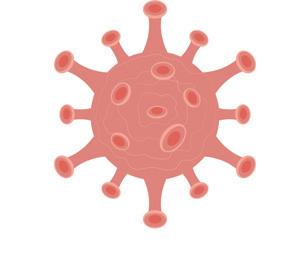


n Indian Health Service hospitals only have 625 beds across the country, with six ICU beds and 10 ventilators to care for over 2.5 million Native Americans from 574 tribes. Some tribes have additional health services in their communities, but these only add another 772 beds, totaling 1,397.
n Even though data shows that COVID-19 is hitting indignous communities hard, it’s likely that the numbers are worse than we know. Many state health departments categorize Native American and indigenous people as “other”, ` suggesting the severity of COVID-19 on these communities is being underreported.
n Racist physical and verbal attacks on Asian and Pacific Islander people have spiked worldwide since the start of COVID-19 outbreaks.
n The increased racism and xenophobia alone are enough to cause accumulated trauma, which can have a devastating psychological impact now and well into the future for anyone with Asian heritage. This is only exacerbated for those who have been physically and/or psychologically attacked.
n Asian American businesses across the US reported decreased business as early as January 2020; many owners attribute this to misplaced fear about the origins of COVID-19.
The longstanding racial gap in U.S. stroke death rates widened dramatically during the COVID-19 pandemic, government researchers said Thursday, April 20.
Stroke death rates increased for both Black and white adults in 2020 and 2021, according to the Centers for Disease Control and Prevention study. But the difference between the two groups grew about 22%, compared with the five years before the pandemic.
“Any health inequity that existed before seems to have been made larger during the pandemic,’’ said Dr. Bart Demaerschalk, a stroke researcher at the Mayo Clinic in Phoenix who was not involved in the new study. “This is another example of that.”
During a stroke, something blocks or reduces blood flow to part of the brain or a blood vessel in the brain bursts. It can result in brain damage or long-term disability and is the nation’s fifth leading cause of death.
Until about a decade ago, the U.S. stroke death rate was falling because of improved treatment and reduced smoking rates. The decline halted in 2013 at about 70 per 100,000 adults 35 and older. Experts think increases in obesity and related conditions finally offset some of things that had been driving stroke deaths down.
It climbed the last few years, rising to nearly 77 in 2021. Black Americans have long had a higher stroke death rate than their white counterparts, a gap that was fairly steady for decades.
In 2021, according to the new study, the Black stroke death rate for Americans aged 35 and older rose from about 101 per 100,000 before the pandemic to about 113. The white rate rose from about 70 per 100,000 to 75. The difference between those two measures rose from 31 to 38, a 22% increase.
The paper joins a growing number of studies that detected a disproportionately large increase in minority stroke death rates since the pandemic began.
What drove the increases?
Doctors say COVID-19 infection can raise the risk of stroke. This mainly happens in severe COVID-19 illness, and the problem is worse in people that already have partially blocked blood vessels because of other conditions.
Patients with diabetes, high blood pressure, high cholesterol and a history of smoking seemed to be at the highest risk, according to a study led by Demaerschalk that was published last year.
But the virus probably wasn’t the only factor, Demaerschalk said.

Obesity may have worsened, he said. People probably saw their doctors less often. And many were reluctant to go to a hospital when stroke symptoms developed - especially in the early days of the pandemic, when fear of catching the new virus may have surpassed concerns about stroke symptoms, he added.
“Time is absolutely of the essence” in treating strokes, Demaerschalk said.
So people were less likely to get medical care at the same time the risk of stroke was rising. And that “mismatch” may have been more pronounced for some Black people, because of lack of access of medical care and risk factors for COVID-19 and stroke, he said.
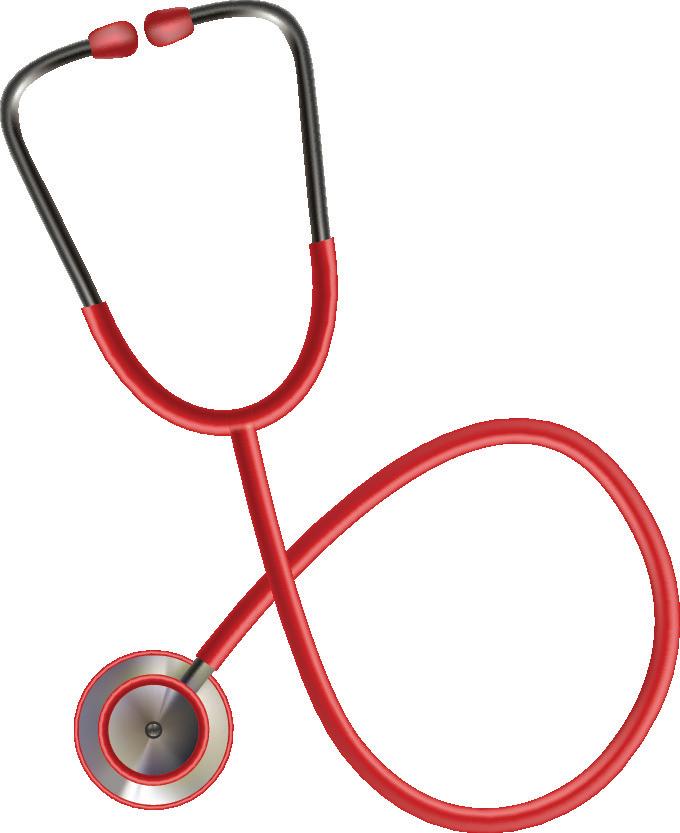
According to the Centers for Disease Control and Prevention (CDC), infant mortality is the death of an infant before his or her first birthday. The infant mortality rate is the number of infant deaths for every 1,000 live births. In addition to giving us key information about maternal and infant health, the infant mortality rate is an important marker of the overall health of a society.
HOW DOES INFANT MORTALITY AFFECT AFRICAN AMERICAN POPULATIONS?
• Non-Hispanic blacks/African Americans have 2.4 times the infant mortality rate as non-Hispanic whites.
• Non-Hispanic black/African American infants are almost four times as likely to die from complications related to low birthweight as compared to non-Hispanic white infants.
• Non-Hispanic black/African American infants had 2.9 times the sudden infant death syndrome mortality rate as non-Hispanic whites, in 2020.
• In 2020, non-Hispanic black/African American mothers were twice as likely to receive late or no prenatal care as compared to non-Hispanic white mothers.
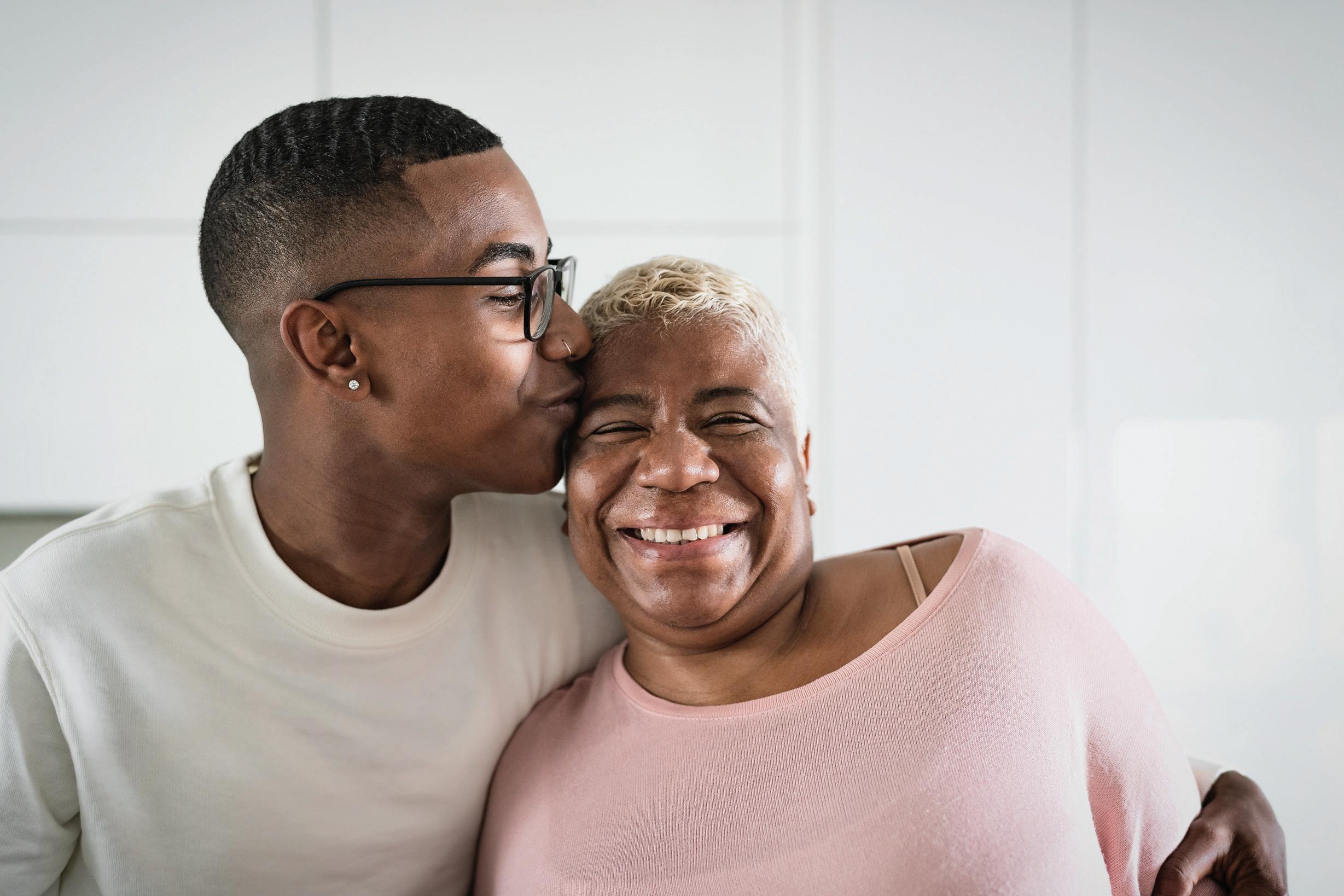

10.4 4.4 BLACK WHITE + A F R I C A N AMERICAN I N F A NT MORTALIT Y R A T E * + 2:4 RATIO
Stark racial disparities in maternal and infant health in the U.S. have persisted for decades despite continued advancements in medical care. The disparate impact of the COVID-19 pandemic for people of color has brought a new focus to health disparities, including the longstanding inequities in maternal and infant health. Additionally, with Roe v. Wade now overturned, increased barriers to abortion for people of color may widen the already existing large disparities in maternal and infant health.
This issue brief, based on analysis of publicly available data from CDC WONDER online database, the National Center for Health Statistics (NCHS)
National Vital Statistics
Approximately 700 women die in the U.S. each year as a result of pregnancy or its complications. Pregnancy-related deaths are deaths that occur within one year of pregnancy.
Black and AIAN women have pregnancy-related mortality rates that are about three and two times higher, respectively, compared to the rate for White women (41.4 and 26.5 vs. 13.7 per 100,000 live births).These disparities increase by maternal age.
Maternal death rates increased during the COVID-19 pandemic and racial disparities widened for Black women. Black women had the highest maternal mortality rates across racial and ethnic groups during the pandemic in 2020 and 2021 and also experienced the largest increase when compared to the year before the pandemic in 2019.
PEOPLE AND THEIR FAMILIES CAN:
Black Maternal Health Week is recognized each year from April 11-17 to bring attention and action in improving Black maternal health. Everyone can play a role in working to prevent pregnancy-related deaths and improving maternal health outcomes.


Each year in the United States, hundreds of people die during pregnancy or in the year after. Thousands more have unexpected outcomes of labor and delivery with serious short- or longterm health consequences. Every pregnancy-related death is tragic, especially
HISPANIC
Percentage of mothers who received late or no prenatal care, 2020
discusses the factors that drive these disparities, and provides an overview of recent efforts to address them.
Black and American Indian and Alaska Native (AIAN) women have higher rates of pregnancy-related death compared to White women.
Pregnancy-related mortality rates among Black and AIAN women are over three and two times higher, respectively, compared to the rate for White women (41.4 and 26.2 vs. 13.7per100,000).Black, AIAN, and Native Hawaiian and Other Pacific Islander (NHOPI) women also have higher shares preterm births, low birthweight births, or births for which they received late or no prenatal care compared to White women.
and access to care play a role in driving worse maternal and infant health outcomes for people of color. However, inequities in broader social and economic factors and structural and systemic racism and discrimination are primary drivers for maternal and infant health.
The COVID-19 pandemic has exacerbated longstanding disparities in health and health care for people of color, including stark disparities in maternal and infant health.
Despite continued advancements in medical care, rates of maternal mortality and morbidity and pre-term birth have been rising in the U.S.
disparities in these areas. Reflecting these increased risk factors, infants born to women of color are at higher risk for mortality compared to those born to White women. Infant mortality is defined as the death of an infant within the first year of life, but most cases occur within the first month after birth.
THE PRIMARY CAUSES OF INFANT
MORTALITY:
• Birth defects
• Preterm birth and low birthweight
• Maternal pregnancy complications
STATUS OF RACIAL DISPARITIES IN MATERNAL AND INFANT HEALTH BLACK WHITE *Non-Hispanic
Reports, CDC Pregnancy Mortality Surveillance System and a report from the US Government Accountability Office (GAO), provides analysis of racial and ethnic disparities across selected measures of maternal and infant health,
Maternal and infant health disparities are symptoms of broader underlying social and economic inequities that are rooted in racism and discrimination. Differences in health insurance coverage
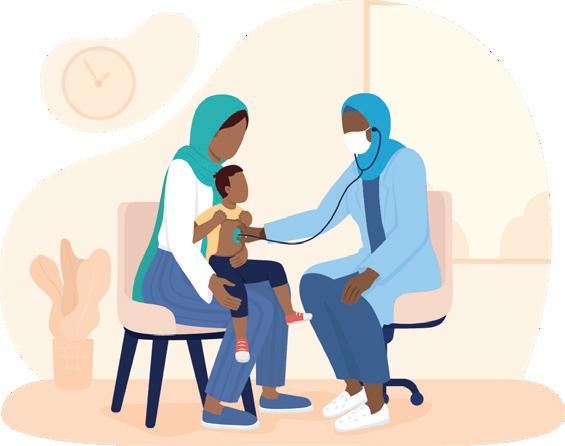
With the overturning of Roe v. Wade, increased barriers to abortion for people of color may widen the already existing large disparities in maternal and infant health. Together these factors have contributed to growing attention and efforts to improve overall maternal and infant health and reduce
NONHISPANIC BLACK
9.1
because more than 80% of pregnancy-related deaths in the U.S. are preventable. Recognizing urgent maternal warning signs, providing timely treatment, and delivering respectful, quality care can prevent many pregnancy-related deaths.

RACIAL DISPARITIES EXIST Black women are three times more likely to die from a pregnancy-related cause than White women. Multiple factors contribute to these disparities, such as variation in quality healthcare, underlying chronic conditions, structural racism, and implicit bias. Social determinants of health prevent many people from racial and ethnic minority groups from having fair opportunities for economic, physical, and emotional health.
TALK TO A HEALTHCARE PROVIDER IF ANYTHING DOESN’T FEEL RIGHT OR IS CONCERNING. KNOW AND SEEK IMMEDIATE CARE IF EXPERIENCING ANY OF THE URGENT MATERNAL WARNING SIGNS, INCLUDING SEVERE HEADACHE, EXTREME SWELLING OF HANDS OR FACE, TROUBLE BREATHING, HEAVY VAGINAL BLEEDING OR DISCHARGE, OVERWHELMING TIREDNESS, AND MORE THESE SYMPTOMS COULD INDICATE A POTENTIALLY LIFETHREATENING COMPLICATION.

• IDENTIFY AND ADDRESS UNCONSCIOUS BIAS IN HEALTHCARE.
STANDARDIZE COORDINATION OF CARE + RESPONSE TO EMERGENCIES.

• IMPROVE DELIVERY OF QUALITY PRENATAL + POSTPARTUM CARE.
• TRAIN NON-OBSTETRIC CARE PROVIDERS TO ASK ABOUT PREGNANCY HISTORY IN THE PRECEDING YEAR.
HEALTHCARE PROVIDERS CAN: ASK QUESTIONS TO BETTER UNDERSTAND THEIR PATIENT AND THINGS THAT MAY BE AFFECTING THEIR LIVES.

SPECIAL ISSUE MIN RITY HEALTH M NTH Infant deaths and mortality rates for the top 5 leading causes of death for African Americans, 2020 (Rates per 100,000 live births) BLACK DEATH RATE * 214 133 107 89 71 64 56 31 30 20 WHITE DEATH RATE *
• Sudden infant death syndromes
• Injuries
Infants born to Black women are over twice as likely to die relative to those born to White women (10.4 vs. 4.4 per 1,000), and the mortality rate for infants born to AIAN and NHOPI women (7.7 and 7.2 per 1,000) is nearly twice as high.
THE BLACK IMMIGRANT POPULATION IN THE U.S. INCREASED FROM 816,000 IN 1980 TO OVER 4.2 MILLION BY 2016. 39% WERE FROM AFRICA AND NEARLY HALF WERE FROM THE CARIBBEAN.
Demographics/Societal Issues
• More than 1 in 5 lived in poverty as of 2018.
• Roughly 30% are women-head of household homes, compared to 9% of white homes.
• Despite progress made over the years, racism, negative stereotypes and attitudes of rejection, though decreased, continue to occur with measurable, adverse consequences.
Prevalence - Black and African Americans are more likely to:

• Report serious psychological distress (twice as likely if living below the poverty level).

• Have feelings of sadness, hopelessness, and worthlessness.
• To die from suicide at all ages. (teenagers attempt suicide more than their White peers - 9.8% v. 6.1%.
According to SAMHSA’s 2018 National Survey on Drug Use
• Serious mental illness (SMI) rose for all ages 2008 and 2018.
• Major depressive episode and suicidal thoughts, plans, and attempts are rising among Black and African American young adults.

• Binge drinking, smoking (cigarettes and marijuana), illicit drug use and prescription pain reliever misuse are more frequent among Black and African American adults with mental illnesses.
Attitudes
According to a study conducted by Ward, Wiltshire, Detry, and Brown in 2013:
• Black and African American hold beliefs related to stigma, psychological openness, and help-seeking, which in turn affects their coping behaviors. The participants in this study were not very open to acknowledging psychological problems, but they were somewhat open to seek mental health services.
• Black and African American men are particularly con cerned about stigma.
Treatment Issues - Black and African Americans are:
• Over-represented in our jails and prisons, nearly 40% in the prison population.
• Ill-served - less than 2% of American Psychological Association members are Black or African American, leading some to worry that mental health care practitioners are not culturally competent enough to treat Black or African Americans’ specific issues.
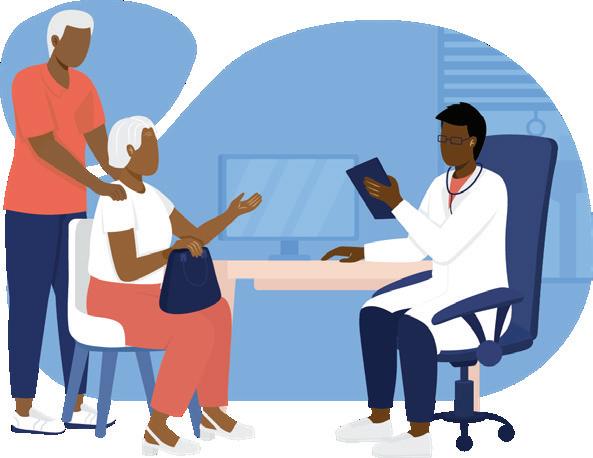
• Subject to stigma and judgment, research indicates that Blacks and African Americans believe that mild depression or anxiety would be considered “crazy”. Many believe that discussions about mental illness would not be appropriate even among family.
National Minority Mental Health Awareness Month is observed each July to bring awareness to the challenges that some racial and ethnic minority groups face regarding mental health.

Obstacles to Mental Health for Racial and Ethnic Minority Groups
The mental health of some racial and ethnic minority groups has worsened since the start of the COVID-19 pandemic relative to that of non-Hispanic white people.
Racial and ethnic minority groups have been placed at higher risk for COVID-19 infection, COVID-19 severe illness or death, and pandemic-related stressors. These stressors can cause emotional distress and may lead to new or worsening mental health issues.
Not sure if you or someone you know is living with mental health problems?
The following feelings or behaviors can be an early warning sign of a problem:
EATING OR SLEEPING TOO MUCH OR TOO LITTLE
PULLING AWAY FROM PEOPLE AND USUAL ACTIVITIES
HAVING LOW OR NO ENERGY
FEELING NUMB OR LIKE NOTHING MATTERS
Access/Insurance For Black and African Americans:

• Disparities in access to care and treatment have persisted over time.
Partnerships And Resources
The following organizations are among those that offer additional information, with a focus on outreach to Black and African American communities:
• National Black Nurses Association
• National Medical Association
• Lee Thompson Young Foundation
HAVING UNEXPLAINED ACHES AND PAINS
FEELING HELPLESS OR HOPELESS
SMOKING, DRINKING, OR USING DRUGS MORE THAN USUAL FEELING UNUSUALLY CONFUSED, FORGETFUL, ON EDGE, ANGRY, UPSET, WORRIED, OR SCARED
YELLING OR FIGHTING WITH FAMILY AND FRIENDS
EXPERIENCING SEVERE MOOD SWINGS THAT CAUSE PROBLEMS IN RELATIONSHIPS HAVING PERSISTENT THOUGHTS AND MEMORIES YOU CAN’T GET OUT OF YOUR HEAD
HEARING VOICES OR BELIEVING THINGS THAT ARE NOT TRUE
THINKING OF HARMING YOURSELF OR OTHERS
INABILITY TO PERFORM TASKS LIKE TAKING CARE OF YOUR KIDS/ GETTING TO WORK OR SCHOOL
Healthcare systems can

• Screen patients for depression and other mental health conditions and refer patients to accessible mental health care services.
We all have a role to play in promoting health equity:
• Ensure mental health programming incorporates perspectives, ideas, and decision-making from appropriately representative people of racial and ethnic minority groups at all stages of programming – from planning to implementation to evaluation.
• Consider the data when developing organizational priorities and programs.
• Prioritize action on and/or meaningfully account for the potential influence of social determinants of health when designing mental health programs.
• Measure the impact of racism and develop best practices for reducing racism and its consequences.
• Ensure mental health educational materials are culturally and linguistically appropriate and follow health equity principles such as using plain language.
• Take intentional steps to increase the reach of mental health information to racial and ethnic minority groups through culturally responsive communication outlets.
• Make mental health educational materials available to all patients during their appointments, via patient portals, and in waiting rooms.
• Make efforts to recruit mental healthcare providers that reflect the race and ethnicity of the populations they serve.
• Provide cultural humility training to mental healthcare providers.
• Ensure mental healthcare services are culturally and linguistically appropriate.
Mental health equity is the state in which everyone has a fair and just opportunity to reach their highest level of mental health and emotional well-being.
In San Diego County and across the nation, AfricanAmerican infant mortality rates are drastically higher than many other race/ethnic groups. Infant mortality, defined as the death of an infant before their first birthday, is an important marker of the overall health of a community.
The leading causes of infant mortality are birth defects; complications of pregnancy; disorders related to prematurity and low birth weight; and sudden infant death syndrome, which many refer to as SIDS. Infant mortality has significantly declined for all San Diegans and among local African Americans over the past two decades.
On average, from 2000-2002, there were 14.3 AfricanAmerican infant deaths in San Diego County for every 1,000 live births. By 2018-2020, that number had fallen to 8.7 per 1,000, a 40 percent decrease.
Unfortunately, despite these declines, African-American newborns remain about two to four times more likely to die before their first birthday as compared to whites –representing a persistent and
unmistakable health disparity. Many factors contribute to this gap, such as differences in access to medical care, low socioeconomic status, low educational status, substance abuse, racism, stress, and environmental issues.
To improve the health and well-being of mothers and reduce the risk of infant mortality among AfricanAmerican infants, the San Diego County Black Infant Health (BIH) program offers resources and services at no-cost to pregnant AfricanAmerican women in designated service areas. The program uses a group-based approach with complementary client-centered case management to empower women, build resilience, reduce stress, and increase social support.
In San Diego County, California Perinatal Equity Initiative (PEI) funds, approved by the state in 2018, have been used to increase understanding of and identify factors associated with racial inequities related to African-American maternal and infant mortality rates. The PEI Community Advisory Board, comprised of community members and agencies, guides PEI activ-
ities by providing broadbased input and is inclusive of voices from the community and County partners.
PEI funding covers activities that include the Black Legacy Now media campaign and website aimed to increase awareness of AfricanAmerican preterm births and maternal health, and what can be done to reverse trends. Other PEI components include Implicit Bias trainings to healthcare professionals serving pregnant African-American women and a Fatherhood program to promote paternal involvement and support during pregnancy and the first year of parenthood.
Other County of San Diego programs that link pregnant women to providers and provide additional education and support during pregnancy include the Perinatal Care Network (PCN) and the Comprehensive Perinatal Services Program (CPSP).
Women should obtain care before and during pregnancy to reduce the risk of poor birth outcomes. They also should practice behaviors to improve and main -
Post-pandemic life with its many changes, has been stressful for many. That and other societal shifts along with ongoing economic hardships and rising inflation continue to have notable negative effects on people’s overall physical and mental health.
tain health, including getting proper nutrition and exercise, reducing stress, and managing chronic health conditions. Safe infant sleep environments are very important. Pregnant women and parents are also encouraged to seek help and support when needed.
For more information, visit the Black Legacy Now website at blacklegacynowsd. com, the Black Infant Health program at www.sdbih.org, or Maternal, Child, and Family Health Services at www.sdmcfhs.org.
If you would like to get involved in the Perinatal Equity Community Advisory Board or the Black Infant Health Advisory Board, contact Rhonda Freeman at rhonda. freeman@sdcounty.ca.gov.
Courtesy of San Diego County Maternal, Child, and Family Health Services, Public Health Services.
Heart disease and stroke are among the top five leading causes of death in San Diego County, with hypertension (high blood pressure) being a leading risk factor for these conditions. Historically, we know that AfricanAmerican/Black adults have been burdened with higher rates of hypertension, heart disease, and stroke.

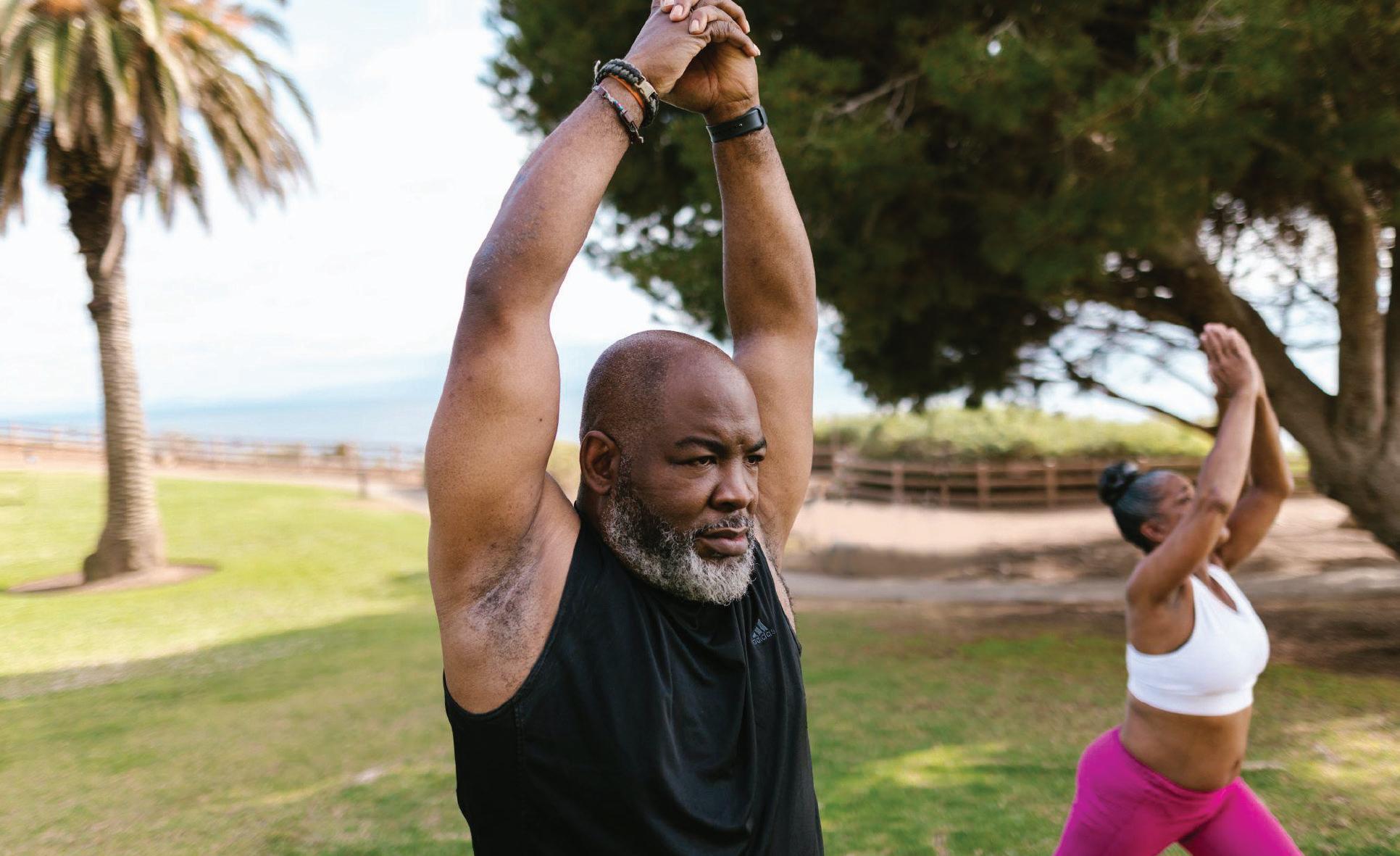
In partnership with San Diego County’s healthcare systems and community partners, the County of San Diego (County) is implementing more effective strategies to better identify and treat patients with high blood pressure, which will help prevent or control related chronic disease.
Each February, the County holds the annual Love Your Heart event to encourage our communities to take control of their heart health by getting a free blood pressure screening, knowing their blood pressure numbers, and knowing what they mean. Over time, the event has also expanded to include distribution of blood pressure cuffs to promote blood pressure self-measurement.
In 2022, over 46,400 people across the U.S. and Mexico participated, with over 6,000
blood pressure cuffs distributed.
During the pandemic, hypertension was consistently the most common underlying medical condition contributing to COVID-related deaths in San Diego County. And we know that many people were afraid to visit their doctor for an extended period.
The result is that control of high blood pressure has been lost for many people, so it is very important for you
to return for follow-up care if you have not been seen recently. Typically, there are no warning signs or symptoms —that’s why it is called the “silent killer”—so the best way to know if you have it is to get checked.
Make heart health a priority by scheduling an appointment with your primary care physician for a routine visit. Getting your numbers (especially blood pressure, blood cholesterol, glucose, and body mass index) checked
The good news is that resources are available to support people through difficult times.
May is Mental Health Matters Month, a time to highlight the importance of mental health. During the month you are encouraged to check-in, learn more, and get support for your own mental health or the mental health of a loved one.
Here are some local County-sponsored resources:
Check-in
To increase your basic awareness regarding mental health, visit the It’s Up to Us website at Up2SD.org. This website provides general information about mental health awareness and how you can help reduce stigma. It also has helpful tips and information to support mental health and wellbeing.
Learn more
The San Diego Mental Health First Aid program offers a free course to increase your personal mental health literacy. Contact the program at 619-543-0412 or visit their website at mhasd.org to sign up.
The San Diego Suicide Prevention Council (SPC) offers free “Question, Persuade, and Refer” Gatekeeper Trainings for Suicide Prevention. It is designed to give members of the public the basic skills necessary to recognize warning signs that someone may be contemplating suicide. They also provide free GLSEN (Gay, Lesbian, & Straight Education Network) Trainings for educators to help create safe spaces for lesbian, gay, bisexual, and transgender youth. Call the Suicide Prevention Council at 858-609-7960 for more information and to sign up for a training.
If you or your organization would like to host a presentation about mental health and wellbeing, contact the Breaking Down Barriers Program at 858-637-3301. This outreach and education program works with Black, Indigenous, and People of Color (BIPOC) and the LGBTQIA+ community to talk about mental wellness.
Get support
The County’s Access & Crisis Line (ACL) is a core, local resource that provides information about behavioral health, mental health, or substance use topics. It also can help people get access to crisis intervention and response services in the event someone is actively experiencing a crisis, including dispatching mobile Call 1-888-724-7240 and speak to an experienced counselor today. The ACL is operated 24/7 with language interpreter services available to provide help in 200 different languages.
The Elder Multicultural Access and Support Services (EMASS) program serves older adults in need of specialized support services with focused attention to Black, Chaldean, Iraqi, Filipino, Hispanic, and Somali seniors (60 years and older). Visit upacSD.com can click on services for more information.
See WELLBEING page 27
regularly and taking your medications, as prescribed, are important steps toward better health. And once you know your numbers, visit Love Your Heart @ Home Education for re=sources and tips to help you stay healthy.
Courtesy San Diego County Public Health Services.
Although high blood sugar is a well-known health risk, many people in San Diego County are not diagnosed.
Nearly half of all local adults may have untreated prediabetes, a condition where your blood sugar is higher than normal, but not at the level of diabetes. Of that group, as many as 90 percent are unaware of their situation or risks.
If left untreated, up to one-third of those with prediabetes will progress to diabetes within five years.
This is of particular concern for the African-American community. Rates for emergency department visits and hospitalizations, caused by diabetes, are more than double for the African-American community than that of the general population.
The urgency for treating these blood sugar conditions was elevated during the pandemic, as diabetes was the second most common condition, following hypertension, associated with death from COVID-19.

healthy habits that support positive food choices, active living, and not smoking are keys to reducing heart disease and stroke. PHOTO:RODNAE Productions via Pexels




FACT: The ingredients in COVID-19 vaccines are NOT dangerous. Nearly all the ingredients in COVID-19 vaccines are also ingredients in many foods – fats, sugars, and salts. COVID19 vaccines do NOT contain ingredients like preservatives, tissues (like aborted fetal cells), antibiotics, food proteins, medicines, latex, or metals. Exact vaccine ingredients vary by manufacturer. Pfizer-BioNTech and Moderna COVID19 vaccines also contain messenger RNA (mRNA) and the Johnson & Johnson/Janssen

COVID-19 vaccine contains a harmless version of a virus unrelated to the virus that causes COVID-19. These give instructions to cells in your body to create an immune response. This response helps protect you from getting sick with COVID-19 in the future. After the body produces an immune response, it discards all the vaccine ingredients just as it would discard any information that cells no longer need. This process is a part of normal body functioning. COVID-19 vaccines do NOT contain ingredients like preservatives, tissues (like aborted fetal cells), antibiotics, food proteins, medicines, latex, or metals.
FACT: The natural immunity you get from being sick with COVID-19 is NOT better than the immunity you get from COVID-19 vaccination. COVID-19 vaccination is a safer and more dependable way to build immunity to COVID-19. Getting a COVID-19 vaccine gives most people a high level of protection against COVID-19 and can provide added protection for people who already had COVID-19. Getting sick with COVID-19 can offer some protection from future illness (“natural immunity”) but the level of protection varies depending on age, time of infection, and severity of illness. If you get sick, you can spread COVID-19 to others. Getting sick with COVID-19 can cause severe illness or death, and we can’t reliably predict who will have mild or severe illness. You can also continue to have long-term health issues after COVID-19 infection.

FACT: COVID-19 vaccines DO NOT contain microchips. Vaccines are developed to fight against disease and are not administered to track your movement. Vaccines work by stimulating your immune system to produce antibodies, exactly like it would if you were exposed to the disease. After getting vaccinated, you develop immunity to that disease, without having to

FACT: COVID-19 vaccines DON’T create or cause COVID-19 variants. COVID-19 vaccines can help prevent new variants from emerging. New variants of the virus happen because it constantly changes through a natural ongoing process of mutation (change). As the virus spreads, it has more opportunities to change. High vaccination coverage in a population reduces the spread of the virus and helps prevent new variants from emerging.
FACT: m RNA vaccines, such as Pfizer-BioNTech and Moderna ARE REAL vaccines. They work differently than other types of vaccines, but they still trigger an immune response inside your body. This type of vaccine is new, but research and development on it has been underway for decades. The mRNA vaccines do not contain any live virus. Instead, they work by teaching our cells to make a harmless piece of a “spike protein,” Our immune system then recognizes that it does not belong there and responds to get rid of it. When an immune response begins, antibodies are produced, creating the same response that happens in a natural infection.

FACT: Receiving a COVID-19 vaccine will NOT make you magnetic, including at the site of vaccination (usually your arm). COVID-19 vaccines do not contain ingredients that can produce an electromagnetic field at the site of your injection. All COVID-19 vaccines are free from metals.
FACT: U.S. COVID-19 vaccines DO NOT shed or release their components. Vaccine shedding is the release or discharge of any of the vaccine components in or outside of the body and can only occur when a vaccine contains a live weakened version of the virus. None of the vaccines authorized for use in the U.S. contain a live virus. mRNA and viral vector vaccines are the two types of currently authorized COVID-19 vaccines available. After the body produces an immune response, it discards all the vaccine ingredients just as it would discard any information that cells no longer need. This process is a part of normal body functioning.
FACT: A COVID-19 vaccine CANNOT make you sick with COVID-19. Because none of the authorized COVID-19 vaccines in the United States contain the live virus that causes COVID-19, the vaccine cannot make you sick with COVID-19. COVID-19 vaccines teach our immune systems how to recognize and fight the virus that causes COVID-19. Sometimes this process can cause symptoms, such as fever. These symptoms are normal and are signs that the body is building protection against the virus that causes COVID-19.
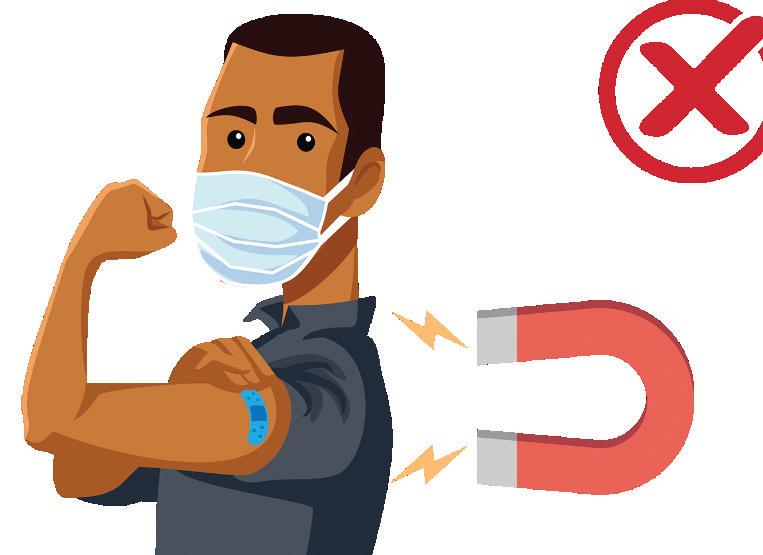
FACT: COVID-19 vaccines
DO NOT change or interact with your DNA in any way. Both messenger RNA (mRNA) and viral vector COVID-19 vaccines work by delivering instructions (genetic material) to our cells to start building protection against the virus that causes COVID19. The genetic material delivered by mRNA vaccines never enters the nucleus of your cells, which is where your DNA is kept. Viral vector COVID-19 vaccines deliver genetic material to the cell nucleus to allow our cells to build protection against COVID-19. However, the vector virus does not have the machinery needed to integrate its genetic material into our DNA, so it cannot alter our DNA.
FACT: COVID-19 vaccines will NOT affect fertility.
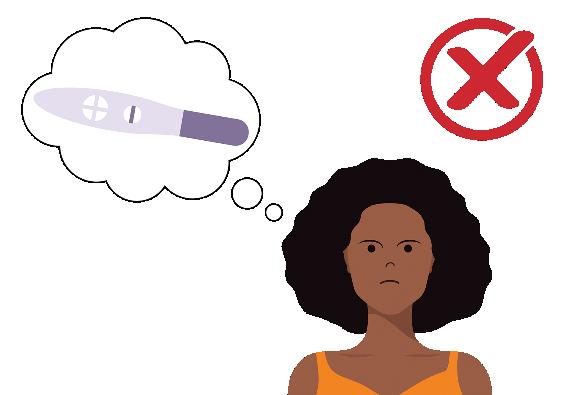
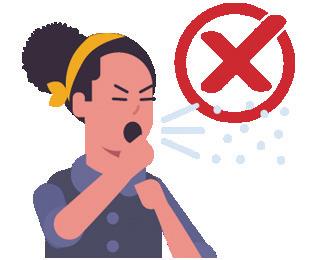
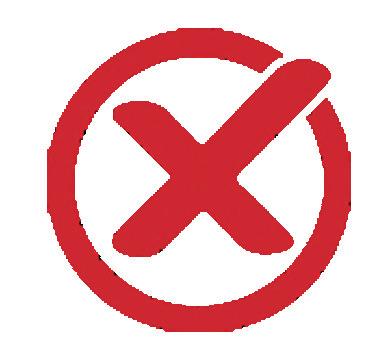

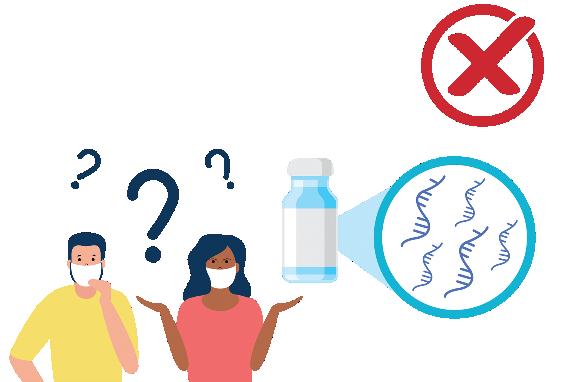

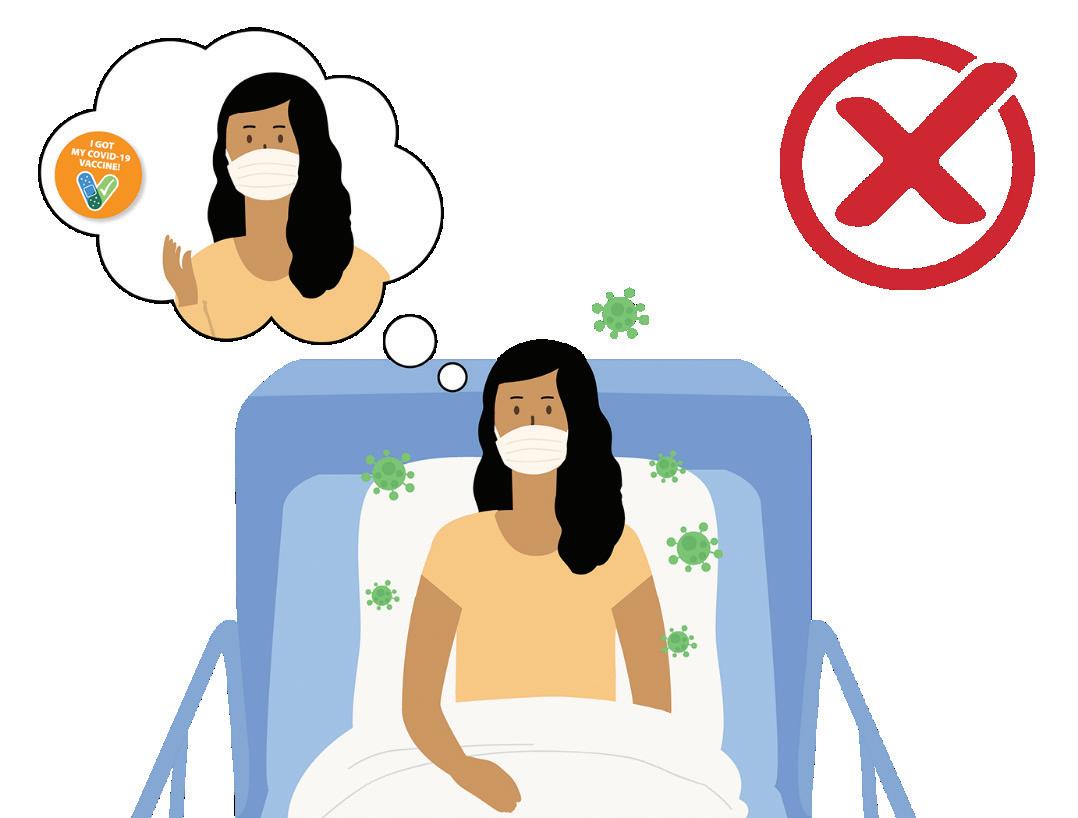

Currently no evidence shows that any vaccines, including COVID-19 vaccines, cause fertility problems (prob lems trying to get pregnant) in women or men. COVID-19 vaccination is recommended for people who are pregnant, trying to get pregnant now, or might become pregnant in the future, as well as their partners. Learn more about how COVID-19 vaccines work. Visit https://www.cdc.gov/coronavirus/ 2019-ncov/vaccines.
SOURCE: CDC.gov
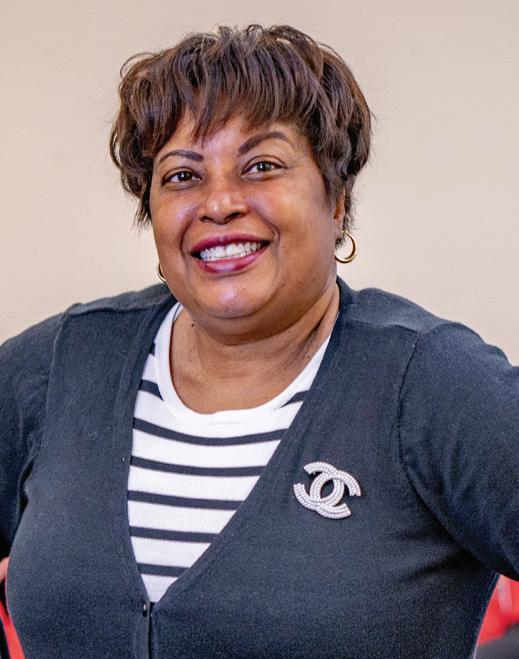
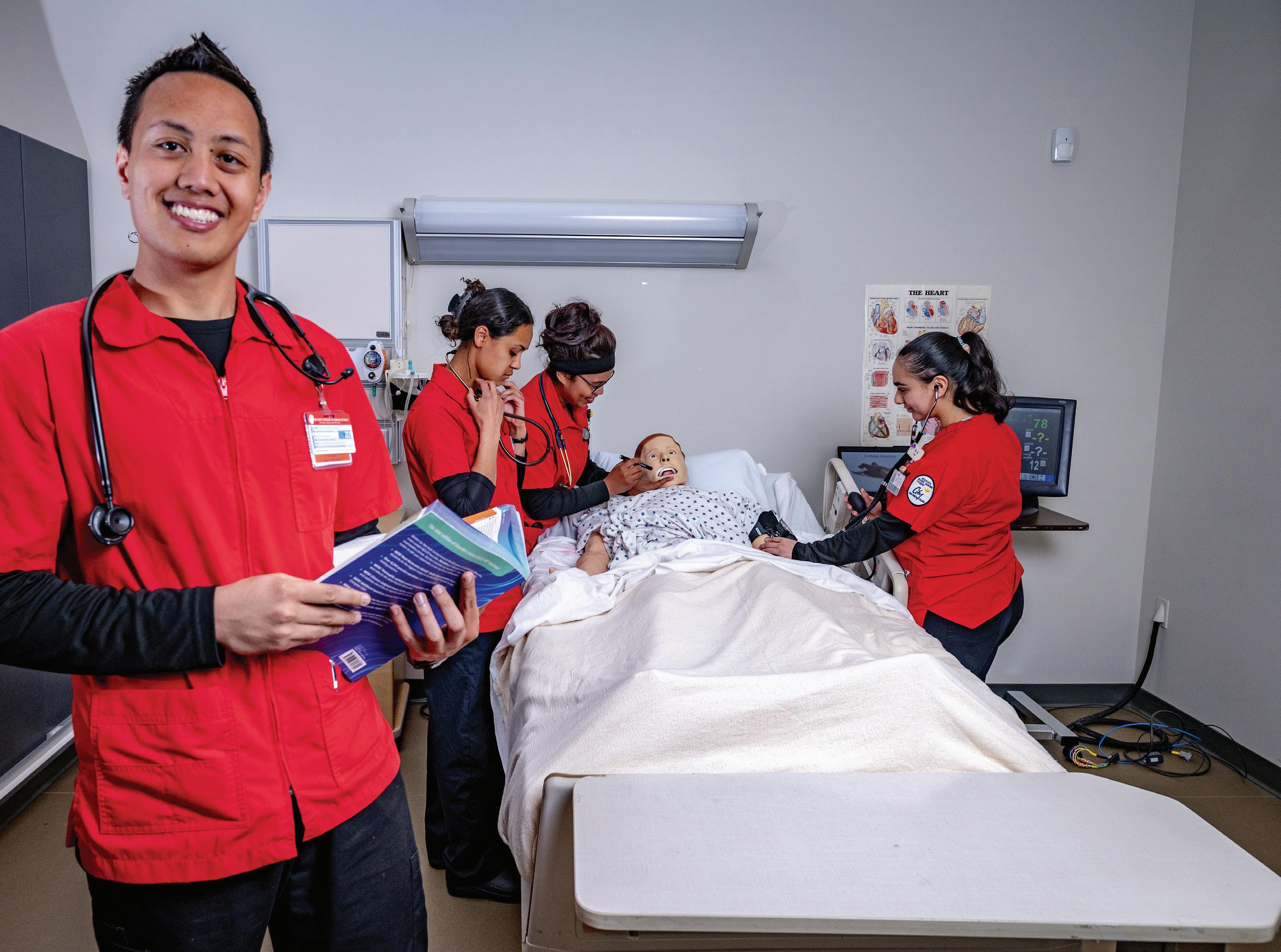
as
























over the












































































































































































































































3 c linical algorithms, tools, and treatment guidelines.
While some diseases have higher prevalence among individuals with certain genetic ancestry, genetic ancestry is poorly correlated with commonly used social racial categories. The use of race to inform clinical diagnoses and decision making may reinforce disproven notions of race as a biological construct and contribute to ongoing racial disparities in health and health care.
Use of Race to Explain Health Differences






espite race being a socio-political system of categorization without a biologic basis, race has historically and continues to play a role in medical teaching and clinical decision making within health care.Race permeates clinical decision making and treatment in multiple ways, including:
1 through providers’ attitudes and implicit biases
2 disease stereotyping and clinical nomenclature, and
Although race is not tied to biologic differences, understanding differences in health and health care by race and ethnicity remains important for identifying and addressing disparities in health and health care that stem from rac -

Only 5.7% of US Doctors Are Black

Seun Adebagbo, who was born in Nigeria and grew up in Boston, said that as a child, she often saw tensions between certain aspects of Western medicine and beliefs within Nigerian culture.
“I wanted to go into medicine because I felt like, ‘Who better to mediate that tension than someone like me, who knows what it’s like to exist in both?’ ” said Adebagbo, 26, who graduated from Stanford University and is now a third-year medical school student in Massachusetts.
“The deeper I got into my medical education, the more I realized, if I’m in the system, I know how it works,” she said of how in many Black and brown communities, there can be limited access to care and resources within the medical system.
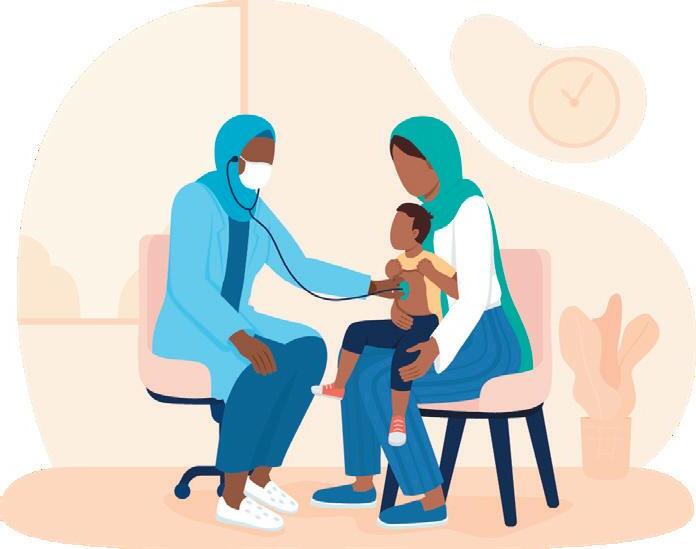
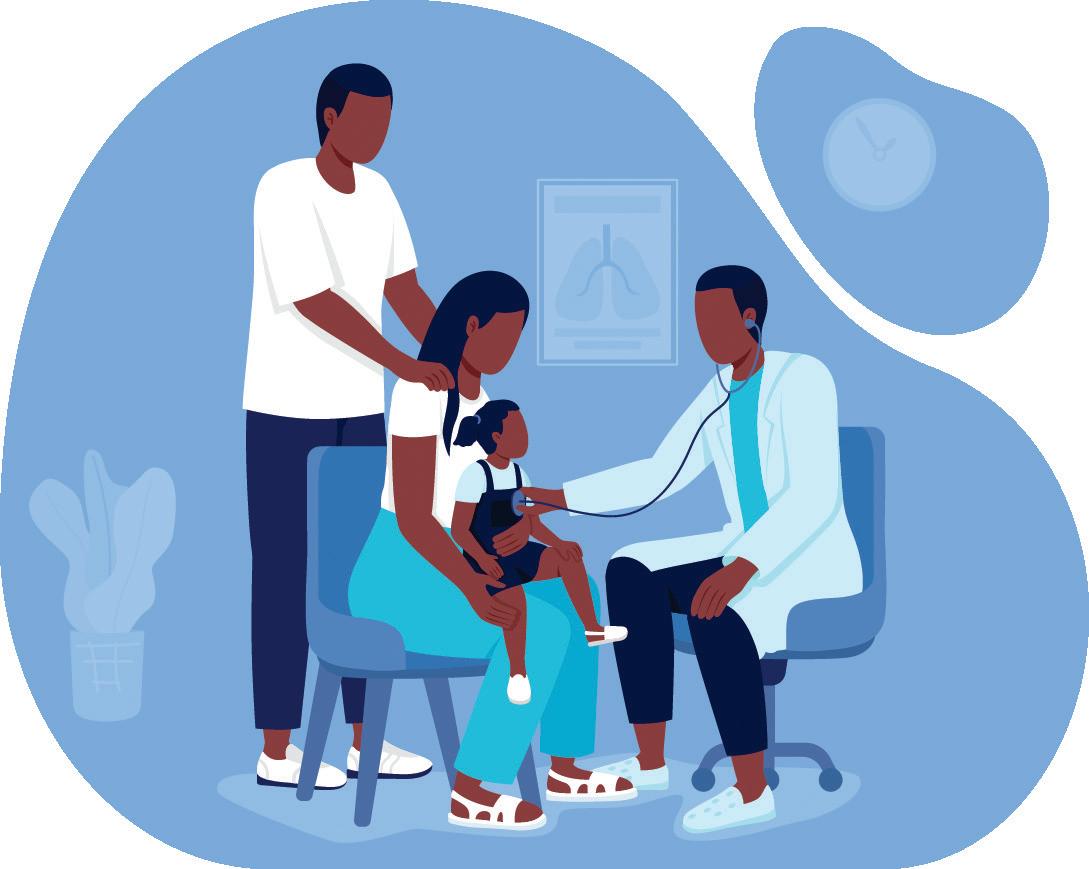 “We can improve our admissions to medical school, make them more holistic, try to remove bias from that, but that’s still not going to solve the problem.”
“We can improve our admissions to medical school, make them more holistic, try to remove bias from that, but that’s still not going to solve the problem.”
This has enabled Adebagbo to connect with patients of color in her rotations.
Only about 5.7% of physicians in the United States identify as Black or African American, according to the latest data from the Association of American Medical Colleges. This statistic does not reflect the communities they serve, as an estimated 12% of the US population is Black or African American. And while the proportion of Black physicians in the US has risen over the past 120 years, some research shows, it’s still extremely low. One reason why the percentage of US doctors who are Black remains far below that of the US population that is Black can be
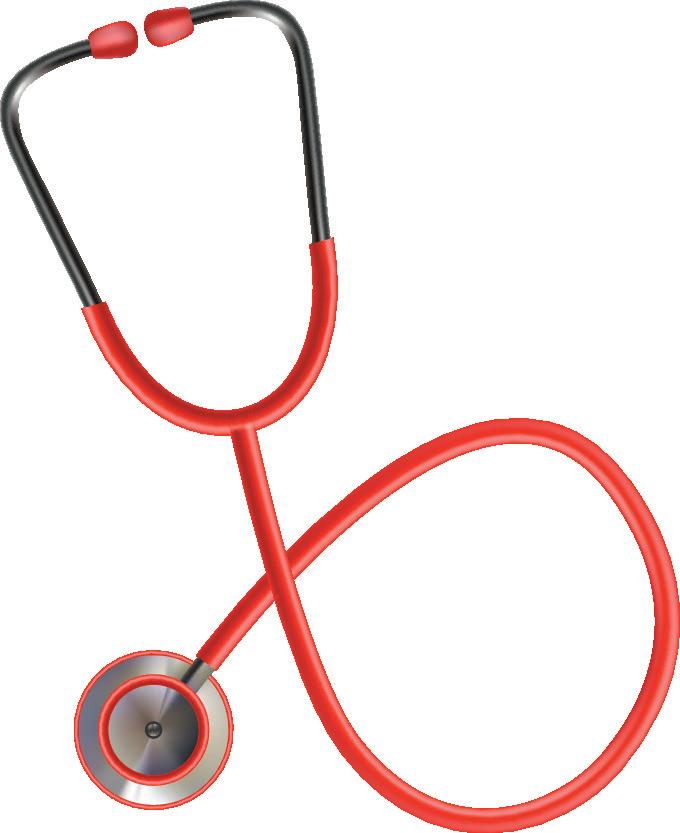
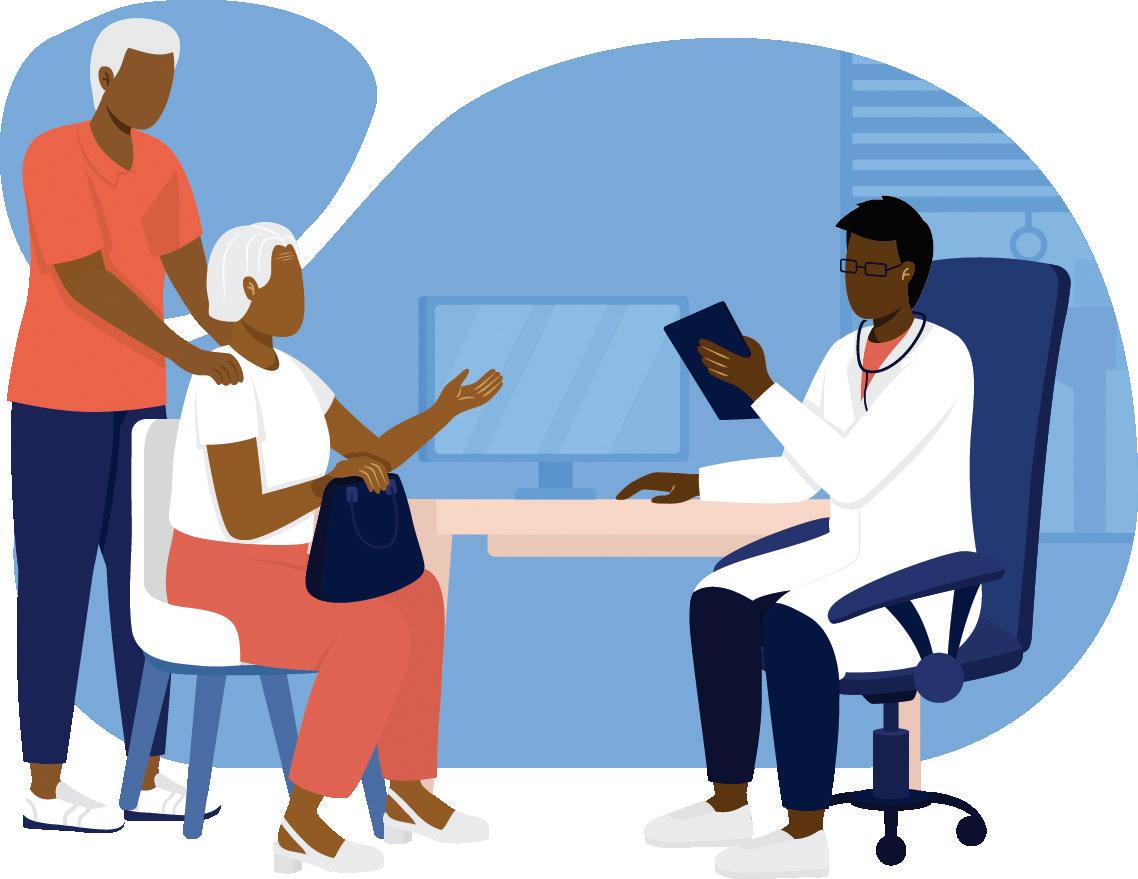
traced to how Black people have been “historically excluded from medicine” and the “institutional and systemic racism in our society,” said Michael Dill, the Association of American Medical Colleges’ director of workforce studies.
“We can improve our admissions to medical school, make them more holistic, try to remove bias from that, but that’s still not going to solve the problem,” Dill said.
Many US medical schools have a history of not admitting non-Whites. The first Black American to hold a medical degree, Dr. James McCune Smith, had to enroll at the University of Glasgow Medical School in Scotland. Smith received his MD in 1837, returned to New York City and went on to become the first Black person to own and operate a pharmacy in the United States, and to be published in US medical journals.
A few decades later, in 1900, 1.3% of physicians were Black, compared with 11.6% of the US population, according to a study published in the Journal of General Internal Medicine in 2021.
Around that time, seven medical schools were established specifically for Black students between 1868 and 1904, according to Duke University’s Medical Center Library & Archives. But by 1923, only two of those schools remained: Howard University Medical School in Washington and Meharry Medical School in Nashville.
In 1940, only 2.8% of physicians were Black, but 9.7% of the US population was Black; by 2018, 5.4% of physicians were Black, but 12.8% of the population was Black.
See DOCTORS page 14
YOU’RE
ism and social and economic inequities.
Complete and accurate race and ethnicity data is key for identify ing disparities and taking action to address them.
There are longstanding gaps and limitations in racial and ethnic data within health care . In addition to deficiencies in survey and administrative data, many institutions report gaps in electronic health record (EHR) data on race, with substantial misclassification of self-reported race and preferred language. The largest discrepancies between EHR demographic data and self-reported data are among individuals who identify as Hispanic.
Race in Clinical Decision-Making and Treatment
A significant and longstanding body of research suggests that provider and institutional bias
and discrimination are drivers of racial disparities in health, contributing to racial differences in diagnosis, prognosis, and treatment decisions. Prior work suggests that providers historically were more likely to perceive individual patient factors rather than provider or health system influences as causes for health disparities. For example, studies have found that providers view Black patients as less cooperative with medical treatment and that providers associate Hispanic patients with noncompliance and risky behavior. A 2015 systematic review of published studies showed that most health care providers appear to have implicit bias in terms of positive attitudes towards White people and negative
Black Student Success Week
APRIL 24-28, 2023
Join us daily for FREE virtual webinars to learn about how to pay for college, the jobs you can get after you graduate, the benefits of attending community college, and much more!

MONDAY, APRIL 24
Basic Needs Workshop
TUESDAY, APRIL 25
Meet the Employers
WEDNESDAY, APRIL 26
Community College Day

THURSDAY, APRIL 27
Cash for College Workshop
FRIDAY, APRIL 28
Financial Intelligence
JOIN

SPECIAL ISSUE
Continued from page 13
attitudes towards people of color. While some studies have found no link between bias and provider treatment behaviors, oth ers have demonstrated that provider bias correlates with poorer patient-provider interactions and is associated with disparities in pain management and empathy. Providers who en dorse false beliefs about biological differences by race report lower pain for Black patients compared to White patients, which has been linked to systematic undertreatment for pain of Black patients. Similarly, compared to White patients in emergency departments, Hispanic and Asian patients are less likely to receive pain assessments and appropriate pain medication.
Research also shows that patients report being treated unfairly because of their race/ethnicity while accessing health care. Black adults are more likely than White adults to report negative experiences with health care providers, including feeling a provider did not believe they were telling the truth, being refused a test or treatment they thought they needed, and being refused pain medication. In addition, Black and Hispanic adults are more likely than their White
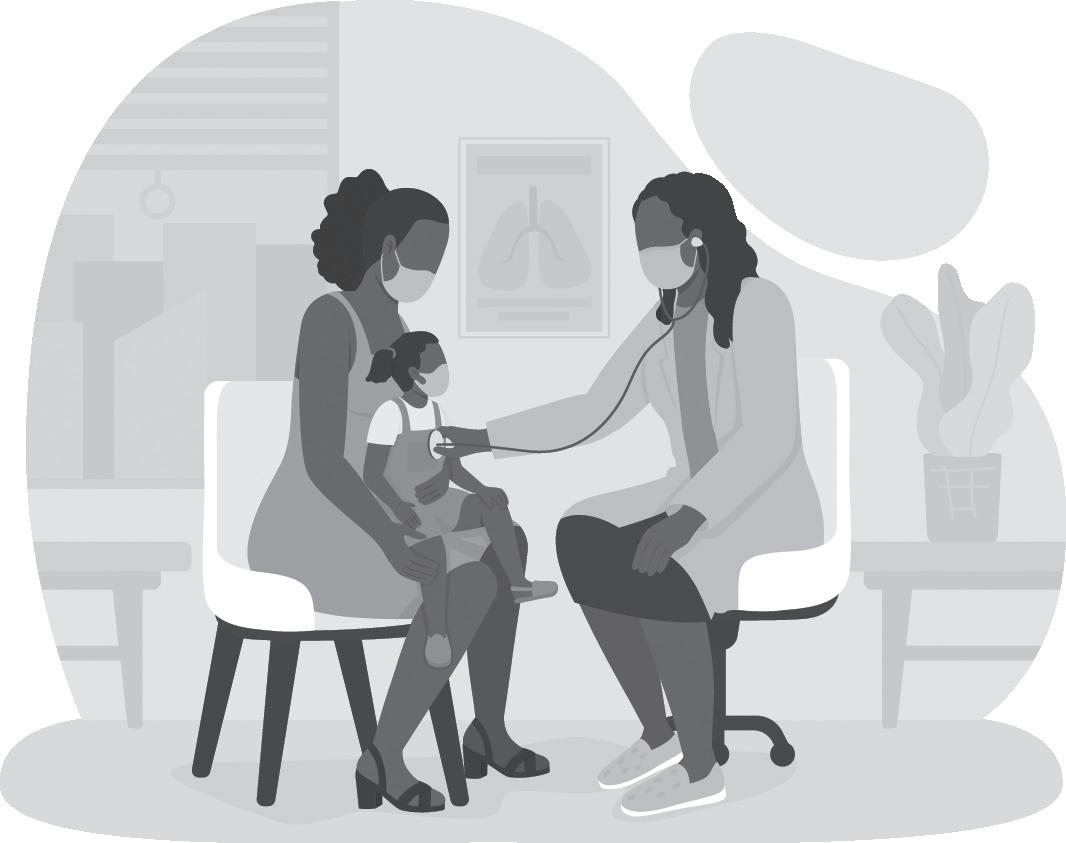

counterparts to say it is difficult to find a doctor who shares their background and experiences and one who treats them with dignity and respect.
Some medical training approaches and materials use imprecise labels conflating race and ancestry, portray diseases through racial stereotypes, and rely on racial heuristics (i.e., mental shortcuts or associations) for teaching clinical diagnosis. In some cases,
they inappropriately use race as a proxy for differences in socioeconomic status, health behaviors (such as diet), or other factors that may influence access to health care or risk of disease. In addition, lecture materials commonly present racial differences in disease burden without historical or social context, which may contribute to students connecting diseases with certain racial groups and ascribing differences to genetic predisposition.

While some diseases have higher prevalence among individuals with certain genet ic ancestry, the practice of using race within clinical calculators and screening metrics may contribute to health disparities. Prior work has identified a range of exam ples of clinical calculators that use race. One of the most well-known examples of this practice is within nephrology, where separate measures of kidney function (i.e., estimated glomerular filtration rates, eGFRs) are applied to Black patients compared to non-Black patients. However, sim -
Continued from page 13
Over more than four decades between 1978 and 2019, the proportion of medical school enrollees who identify as Black, Hispanic or members of other underrepresented groups has stayed “well below” the proportions that each group represented in the general US population, according to a 2021 report in The New England Journal of Medicine.
Diversity in some medical schools also was affected in states with bans on affirmative action programs, according to a study published last year in the Annals of Internal Medicine.
Now, the United States is reckoning with medicine’s history of racism.
ilar examples are seen across medicine. Preventing against racial bias will be important as use of artificial intelligence and algorithms to guide clinical decision-making continue to expand. The health care system is increasingly using artificial intelligence and algorithms to guide health decisions. Research has shown that these algorithms may have racial bias because the underlying data on which they are trained may be biased and/or may not reflect a diverse population. For example, one study found that an algorithm designed to identify patients with complex health needs resulted in Black patients being assigned the same level of risk as White patients despite being sicker. This unintended bias occurred because of underlying racial bias in how the algorithm was designed, implemented, and interpreted—the algorithm used health care costs to predict health care needs, but Black patients have lower health care costs in part because they face greater barriers to accessing health care.

SOURCE: Michelle Tong and Samantha Artiga, KFF December 2021
likely to withdraw from or be forced out of school.
Among White students, 2.3% left medical school in the academic years of 2014-15 and 2015-16, compared with 5.2% of Hispanic students, 5.7% of Black students and 11% of American Indian, Alaska Native, Native Hawaiian and Pacific Islander stu dents, the study found.
When Black patients see Black doctors
Service to patients and patient trust are both among the cornerstones critical to the status of public health, according to researchers.
Yet research suggests that when Black physicians are treating Black patients, that trust can be rebuilt.
For instance, the impact is so significant that having Black physicians care for Black patients could shrink the difference in cardiovascular deaths among White versus Black patients by 19%, according to a paper written by Alsan while she was attending Stanford University, along with colleagues Dr. Owen Garrick and Grant Graziani. It was published in 2019 in the American Economic Review.
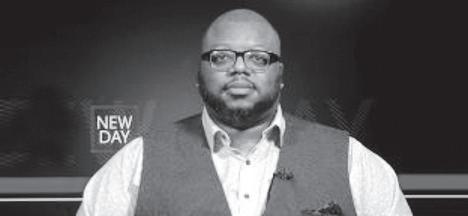
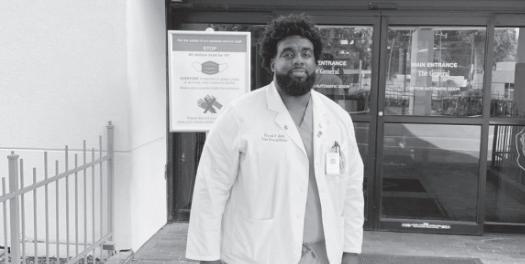
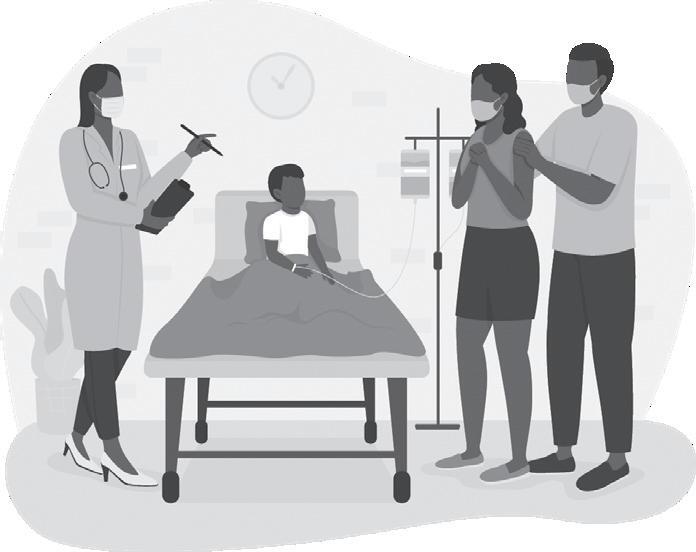
In 2008, the American Medical Association, the nation’s largest organization of physicians, issued an apology for its history of discriminatory policies toward Black doctors, including those that effectively restricted the association’s membership to Whites. In 2021, the US Centers for Disease Control and Prevention declared racism a “serious public health threat.”

One encouraging datapoint says that the number of Black or African American firstyear medical school students increased 21% between the academic years of 2020 and 2021, according to the Association of American Medical Colleges, which Dill said shows promise for the future. But some medical school students could leave their career track along the way.
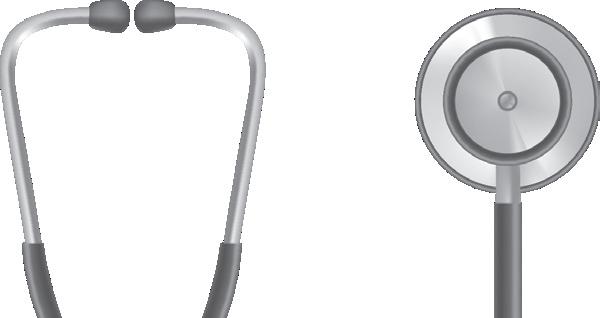

A paper published last year in JAMA Internal Medicine found that among a cohort of more than 33,000 students, those who identified as an underrepresented race or ethnicity in medicine –such as Black or Hispanic – were more
That research was conducted in the fall and winter of 2017 and 2018 in Oakland, California, where 637 Black men were randomly assigned to visit either a Black or a non-Black male doctor.
The researchers found that, when the patients and doctors had the opportunity to meet in person, the patients assigned to a Black doctor were more likely to demand preventive health care services, especially services that were invasive, such as flu shots or diabetes screenings that involve drawing blood.
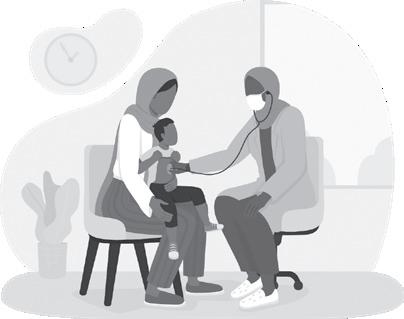
We have the right to a culture of health that values our whole wellbeing and allows us to achieve optimal health
This article calls attention to the concept of a “culture of health”—a term coined and widely disseminated by the Robert Wood Johnson Foundation—as a broad vision to characterize requirements for a society that enables and supports health and health equity. In this framework, a culture of health fosters: shared value for community and population health and well-being; partnerships and collaborations across different sectors of society; health systems and services that are better coordinated and delivered with all consumers in mind, proportionate to need; and healthier communities overall. 2

4We have the right to approach solutions to Black health from a strengths-based approach that incorporates a decolonized and intersectional lens to health equity.
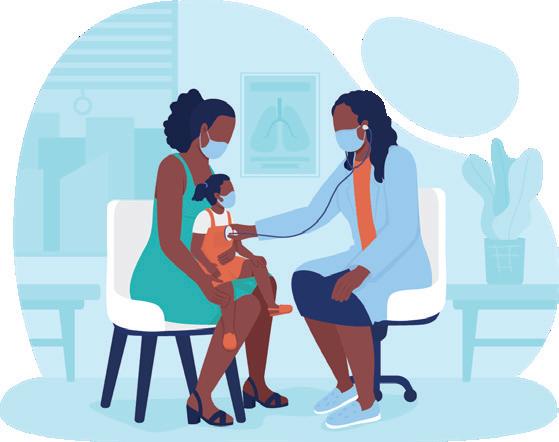
6We have the right to honor and incorporate lessons from our past, present, and future as a Pathway to restoring our health.
We have the right to receive respectful and dignified healthcare
Colonization typically refers to people who are subjugated to the control of outsiders who abuse their human rights and other rights. From a race/ethnicity perspective this most often refers to indigenous populations (Native Americans or First Nations) and in Africa it refers to Black people who were colonized by Europeans looking to expand their spheres of influence and wealth, claiming land, power, and sovereignty. Tools of colonization include oppressive laws, exploitation, cultural domination, and control of resources—including the means to health. https://theconversation.com/explainer-what-is-decolonisation131455
Black Americans have shown historic resilience in the face of incredible challenges. This history should be acknowledged and applauded but not viewed as an excuse for perpetuating such challenges. Black children should learn how historical narratives influence health practices in our communities, how these histories impact present day health outcomes, and about the many Black heroes in health research and health care, past and present. This should be an ongoing process as future accomplishments are recorded.
We have the right to healthcare that is culturally sensitive and that incorporates cultural humility and structural equity.
These terms reflect three important dimensions of the delivery of medical care and other health services.

Being a ‘patient’ is, by definition, a subordinate role in which health care providers have power and authority based on their roles and expertise and in which settings and the rules of engagement are determined by policies in medical practices, hospitals, and large health care systems. However, these systems are also obliged to respect individual value as human beings, honor their basic rights, and deliver care that preserves dignity and does not discriminate based on personal or group characteristics. In other words, the social hierarchy in which some people are automatically placed at the front of the line and given the best care while others are thought to deserve less and treated as such is unacceptable and untenable within the context of health care. 3
Culturally sensitive health care (also referred to as culturally appropriate or culturally competent) has been described as care that reflects “the ability to be appropriately responsive to the attitudes, feelings, or circumstances of groups of people that share a common and distinctive racial, national, religious, linguistic, or cultural heritage.”
Cultural humility raises the bar for health care provider behavior in working to remove disparities in care by calling for “a process of self-reflection and discovery in order to build honest and trustworthy relationships.”
Stuctural equity calls for fairness in all aspects of health care systems—awareness of and removal of barriers that impinge on equity in health care. Legal segregation of healthcare with Black people relegated to poorer or less care has ended but major efforts including stronger and more inclusive policies are still needed to elevate standards to fair and just levels for all. Health insurance systems, training of healthcare professionals, physical locations where care is delivered are just some of the issues that limit access to and quality of health care for Black Americans. Demands for showing dignity and respect for Black people also apply to how Black health care providers, researchers, and trainees are treated in the relevant settings.
The concept of colonization is also applied to the history of Black people in America in that many of the same motives and processes were involved. Effects of slavery did not end with emancipation. These effects are “intersectional” in their differential impacts on gender-age groups in Black communities. For Black Americans “decolonized” approaches means countering these longstanding effects— including biased assumptions, stereotypes, and misperceptions that continue to devalue Black health and Black lives, as well as overt and hidden structures that limit access to quality education, wealth, and other resources needed to achieve health equity.
5We have the right to transform our health by reclaiming our power and autonomy.

Following from Article 4, we must have opportunities to do more than remove health threats left over from slavery. In the spirit of self-determination, we must have the power, resources, and autonomy to create opportunities for optimal health and well-being. Optimal is defined as fulfilling our highest health potential—not by only referencing the health of the US white population. The US white population does not have optimal health when compared to white populations in other affluent countries.
In addition, there are many other aspects of African and Black American history that hold positive lessons, social and cultural assets, and traditions that can be safely and respectfully integrated into regular practice. Reuniting with Black identity through connections to brothers and sisters in the African Diaspora can deepen understanding of the shared history of African peoples globally.
7We have the right to have our full humanity honored and valued.
The principle that health is a human right is fundamental. The principle that all people are valued equally and that, therefore, Black people have full human rights is also fundamental but has not been established at the level needed. Constitutional amendments have been necessary to give rights as citizens to Black people. Black health statistics attest to a failure of American Society to recognize the full humanity of Black people. Health is a human right. Voting rights for Black people are still implicitly and sometimes explicitly in question. These human rights issues must be raised, repeatedly, in the dialogue about Black health.
SOURCE: Council on Black Health April 2021 info@councilbh.org – www.councilbh.org
In a 2019 study, it was shown that Southeast San Diego has the shortest life expectancy in the county. Its crucial that we focus our attention on ways to reverse these statistics.
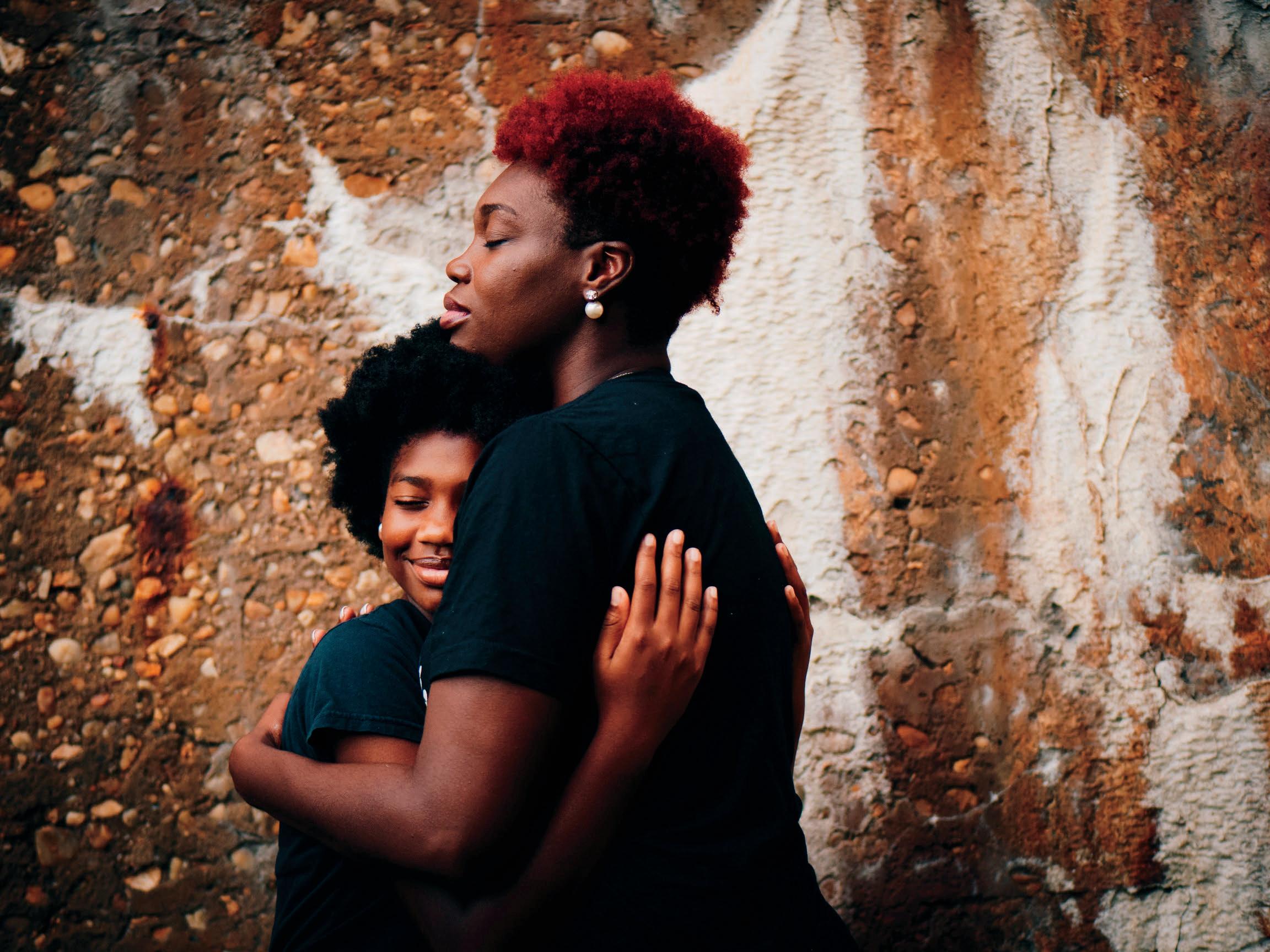

Providers is a dedicated team of community advocates with equity in healthcare at the forefront of our mission


Friday morning, April 21st, in Lincoln High School’s basketball gymnasium, Assemblywoman Akilah Weber, M.D. introduced Assembly Bill 1327 to address racism in high school sports–an historic moment for Lincoln, the Southeast community, the City of San Diego and California as a whole.
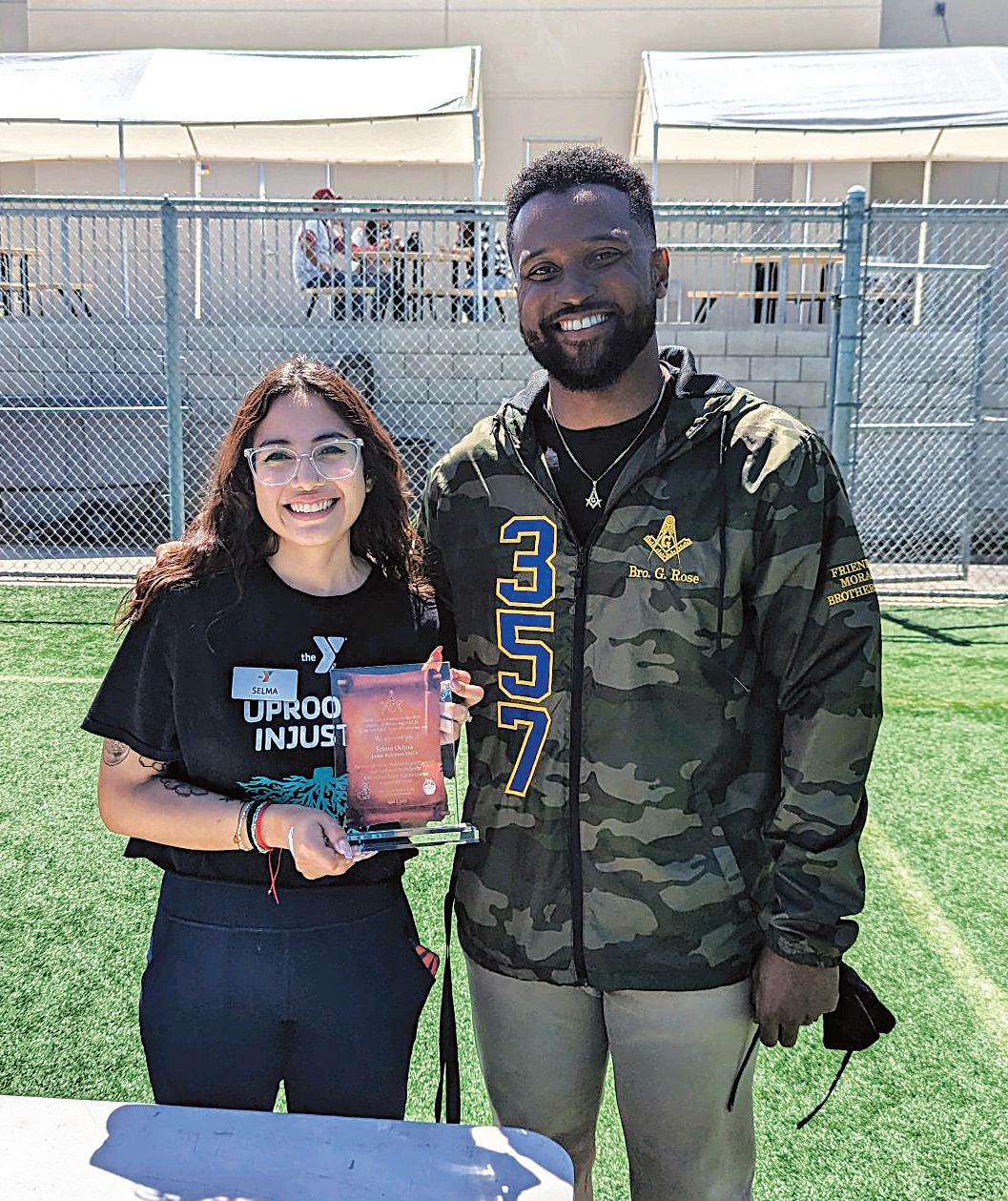

profiling, and other acts of other teams, parents, and more all while striving to maintain and stick to the end goal of change.
“Trying to prepare our student-athletes for a game is already a task,” expressed Head Football Coach Dunn. “But when we have to prepare our kids to potentially face racial comments, being stepped on, being spat at, being antagonized, being called out of their name during a contest [in] certain areas of the city… that’s a whole other ball game.”
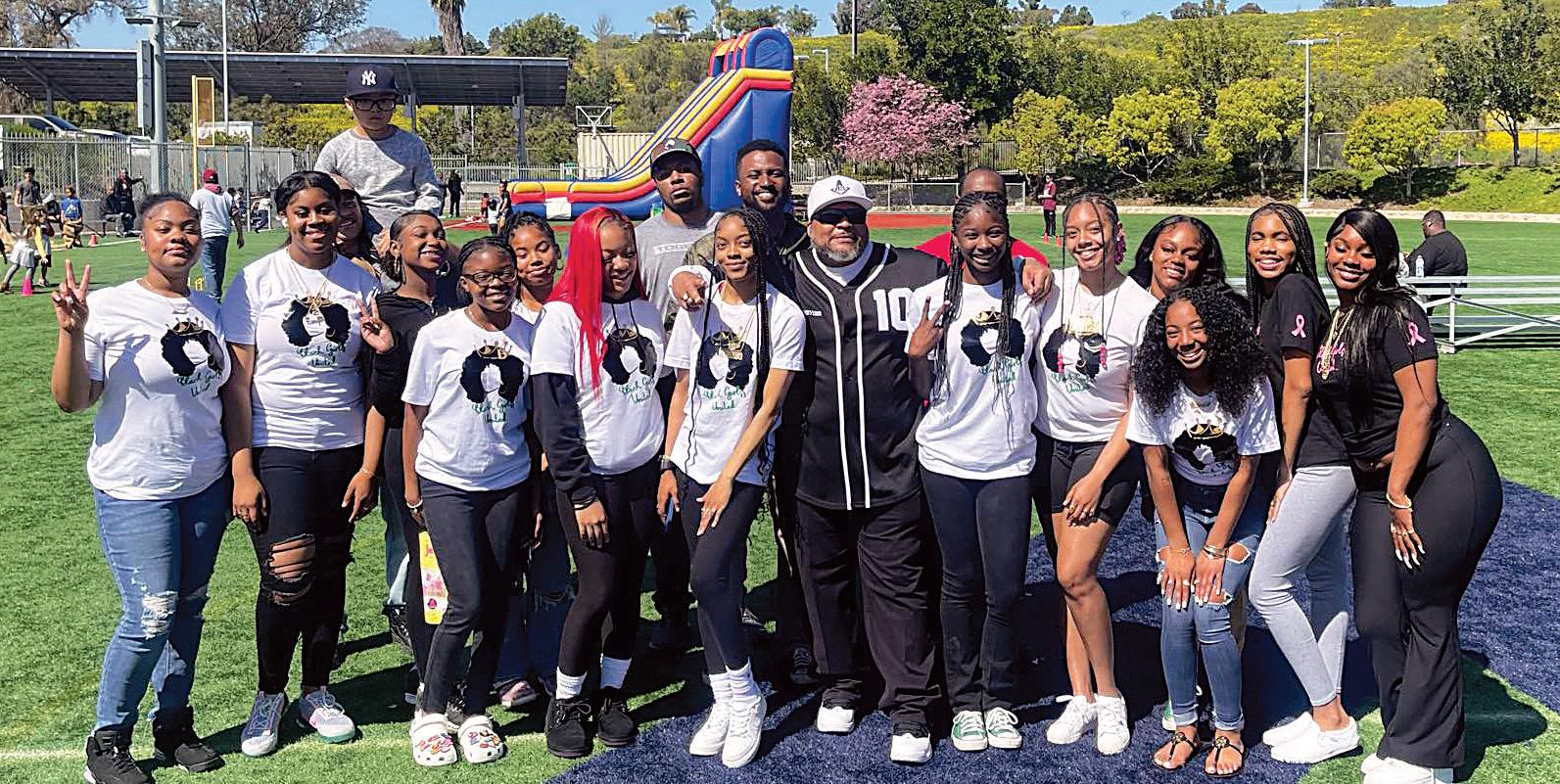
“My end-game is for my kids to be able to play [at] Lincoln High School, go play La Jolla, go up north [of] the 805 and play a basketball game. You win [or] you lose, you walk and still shake hands,“ stated Head Basketball Coach Harper-Harris.

16 th annual

AB1327, sponsored by the California-Hawaii NAACP, would require the California Interscholastic Federation (CIF) to develop a “standardized incident form” to track racial discrimination that occurs at high school and other sports games. The bill would also require CIF to annually post the results of these forms to their website and report them to the CA Legislature every three years.
The creation of this bill has been a major step in this long dance of dealing with race-based hate at high school sports games. Lincoln High’s head coaches, Football Head Coach David Dunn and Basketball Head Coach Jeff HarperHarris, have long suffered the name calling,

Just last October, Coach Dunn in response to Cathedral Catholic students posting photos online wearing shirts that read “Catholics vs. Convicts III,” decided to pull his Hornets from following games against Cathedral Catholic in an effort to stand for “social justice and racial equality.” The announcement of Assem blywoman Weber’s bill shows that these coaches, student-athletes and the Lincoln High admin istration have made the right moves on and off the court and field.
Other speakers included California-Hawaii NAACP Government Relations Specialist Taneicia Herring, San Diego NAACP Chap ter President Kenya Taylor, and Lincoln High School Co-Principal Stephanie Brown.
On April 1, 2023, the FreeMasons from Fidelity Lodge #10, and the Shriners from Azeem Temple #102, presented their 16th Annual Easter Egg Eggtravaganza at the Jackie Robinson YMCA which has hosted it for the last 12 years.

Along with the staff coordinated by Selma Ochoa, Worshipful Master Gabriel Rose, District Deputy Jason Sevier, Azeem Temple #102, and many of the brothers of the Most Worshipful Prince Hall Grand Lodge affiliated houses, they were assisted by Community Service Officer Christopher Jones and his group of youth volunteers that made this event get off without a glitch.
Many children benefited and had wonderful experiences collecting the elusive Easter eggs hidden among various objects around the beautiful ball field. Included on the

field was a jumperslide contributed by Cali Venture Party Rentals.
There were smiles all over as the search for the Golden Eggs was turned in for a spe cial prize. Prizes in cluded scooters, a tricy cle, easter baskets, and YMCA memberships. After the day’s events, the Brothers traveled to the McDonald House Rady’s Children’s Hospital to give Easter baskets to the children, showing their love of community service.
Future planning is already underway for the 17th Annual Eggtravaganza 2024.
Search: Pastor John E. Warren San Diego
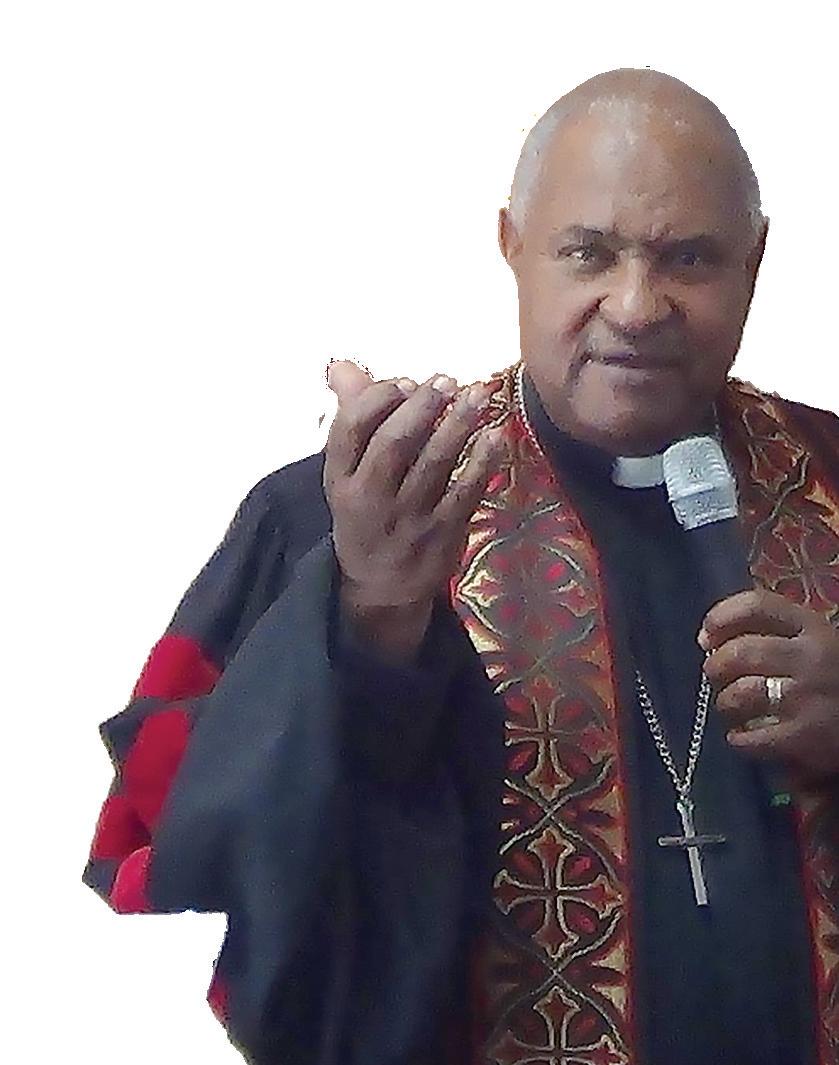

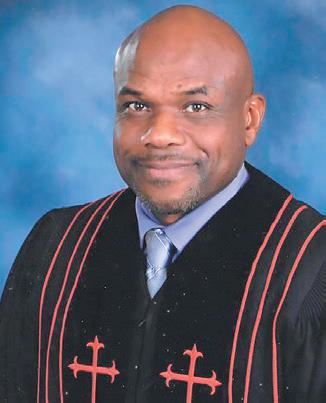

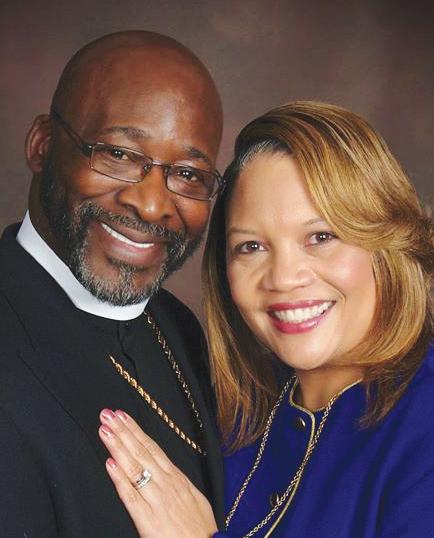

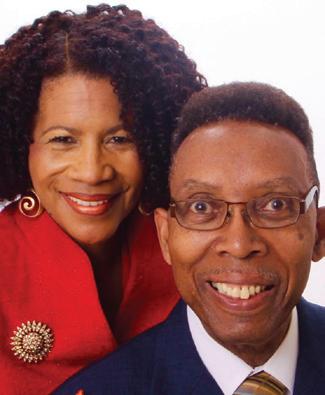
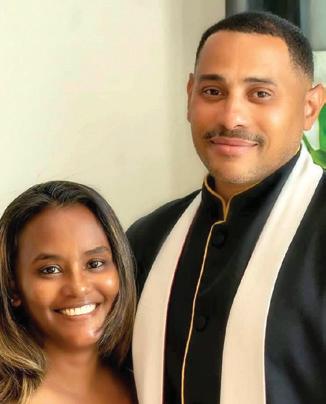


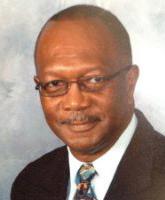
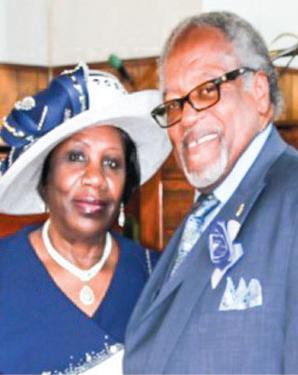
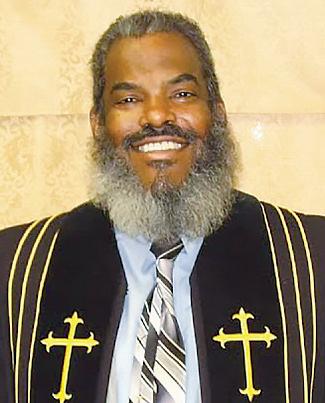


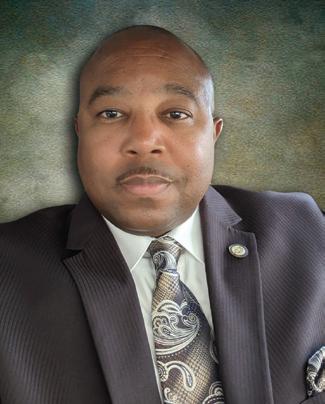
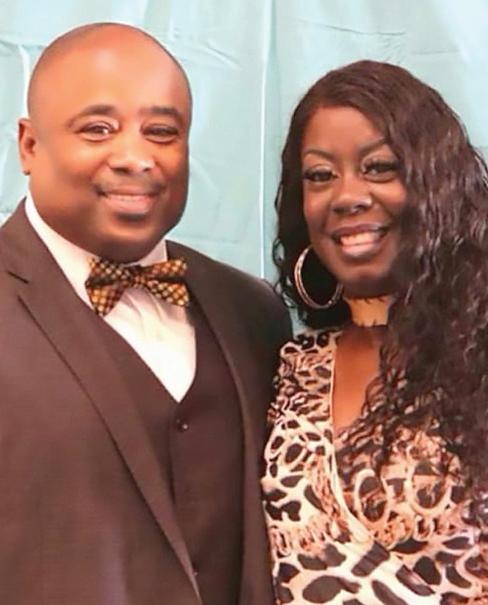
We are a non-denominational full fellowship of believers dedicated to reach our community with the gospel and providing a place for believers to workship, learn, fellowship, serve and grow into the fullness of Christ Jesus. This ministry is to build people of Purpose, Prayer, Power, Praise and Prosperity. This mandate is being fulfilled by reaching the reality of the gospel in a simplistic fashion, and a result, learning how to apply it in everyday life.

On May 5th, 1932 at 3:00 a.m. in Natchitoches Parish, LA, God gave a tremendous blessing to Nellie Davis and Marshall Baker, a beautiful baby girl named Mae Pearl Baker. She was one of the eight children that Nellie Hayson gave birth to. The early years were difficult in Natchitoches Parish, having lived through the Great Depression. Nellie met and married Andy Hayson, he decided to move his family to Vallejo, CA.
Mae Pearl or “BillieJo” as she loved being called by her brothers and sisters. Her sons called her Momma, grandchildren called her Grandma, Granny or Nanna.
Mae Pearl professed Christ at an early age at Union Baptist Church in Vallejo, CA. She completed her schooling in the Vallejo Unified School District. Her career started as a Nurse Assistant at Morningside Community Hospital in South Central LA, with quite an achievement she retired from her passion for helping people.
Mae Pearl was a gregarious and personable person, leaving her mark on all she encountered. She brought laughter to the hearts of many. However, her greatest love was her Love of God and her church, True Faith Missionary Baptist Church, pastored by Rev. Dorsey.
On Friday, March 24th, 2023 at the ripe age of 90, the Lord called our dear beloved Mother, Sister, Auntie, Grandmother, and Great-grandmother to her eternal resting place. She leaves an amazing legacy of an amazing life of service and love for Family. Her cup overflowed!!!!!
She is preceded in death by her husband Howard Davis, they were married for over 40 years and traveled everywhere together; Sister Gladys Allen; brothers Joseph Hayson, Vernis Hayson, and Tommy Curry. She will surely be missed by her entire family: sons Alonzo E. Neal, Bruce W. Henderson, and Derwin L. Johnson; daughters-in-law Deborah Neal and Sheryl Johnson; Brothers Valentino Hayson, Allen Hayson, Andrew Hayson; sister-inlaw Dolores Curry; and a host of grandchildren, great-grandchildren, nieces, nephews, cousins, and friends.
Funeral services were held on 03/24/2023 at Heart Revolution Church, with a burial following at Cypress View Mausoleum. Final arrangements were entrusted to Anderson Ragsdale Mortuary.


Mary Killens was born Mary Lee Manson in Marshall, Texas on March 4, 1932, to Daniel Manson Sr. and Beatrice Craver Manson. Mary attended grade school in Marshall, Texas. Mary attended Frontier Grammar School and Dana Memorial Junior High School. She accepted Christ as her Lord and Savior at an early age.
Several years after joining the workforce, she met and married Earnest White from Memphis, Tennessee. To this union, five children were born: Gertha, Frank, Virginia, Earnestine, and Elaine.
After relocation to San Diego Mary helped manage her fathers’ and his wife’s café called Shady Mae’s on 25th and Imperial. With her experience working with her dad, she opened her own café called Mary’s Tavern.
Around 1962 Mary met and married Ray Killens. To this union one child was born, Randy.
After many years of working Mary retired in 1986. After retiring Mary could not sit still so she opened a State Certified Board and Care Home called “Love and Care.” For over 25 years Mary provided service to her community taking care of people from all walks of life, from the youth to the most senior. Everyone knew and loved Mary and she loved them.
At 1:00 a.m. on Sunday, March 6, 2023, Mary Killens was called to her eternal home and her daughter Virginia was there to greet her.
She is survived by her children, Frank White, Gertha Bracks, Earnestine Green, Elaine Johnson, and Randy Killens; three sisters, Gloria Manson, Gladys White and Lisa Manson; Two brothers, James Manson, and Danny Manson; Twenty Grandchildren; Forty-four Great-Grandchildren; Three Great-GreatGrandchildren; and a host of nieces, nephews, cousins and other relatives and friends and a special longtime friend, Miss Bobbie Hayes.
Funeral services were held on 04/06/2023 at Community Baptist Church, with a burial following a Greenwood Memorial Park. Final arrangements were entrusted to Anderson Ragsdale Mortuary.
Wilson Avery, Jr. was born on June 24, 1933, in Louisville Arkansas to Wilson Avery, Sr. and Lizzie McCowan-Avery. He was the second of nine children born to this union. Wilson attended grammar, middle and high schools in Louisville, Arkansas. Wilson was attending high school when he met his sweetheart, Helen Nero.
As time passed, love grew and in 1951 Wilson and Helen were joined in holy matrimony and remained husband and wife for over 72 years. From their union a son was born, Willie James Avery.
In 1964, The Avery’s moved to San Diego, California. Wilson also began to work for General Dynamics as an Assembler for Air Crafted Parts and tenured over 40 years of service, eventually retiring in 1998.
Shortly after moving to San Diego The Avery’s united with the Community Missionary Baptist Church. He served on the Deacon Board. He was a very compassionate person and loved to see people happy. He was always faithful and in good standing as a servant of God at Community Baptist Church. After 59 years of membership at Community Baptist Church, Wilson and Helen’s health began to fail. Wilson remaining a devoted husband, yet not well himself, never stopped caring for his wife and stayed consistent until his passing.
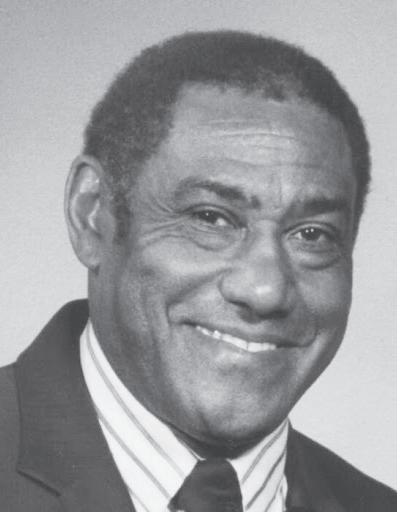
On March 21, 2023, God whispered a soft voice to Wilson and said “Thou good and faithful servant, it’s time to rest.”

Left to cherish his life and memory: His loving Wife Helen Avery; granddaughter: Vondale Avery; great-granddaughter: Cianna Robbins, both of San Diego, CA; 3 Sisters: Easter Baker (Charles) from Mt. Morris, Michigan, Lizzie Prescott and Retha Roper, both from Flint, Michigan; Extended daughter, Donnetta E. Moore; as well as a host of nephews, nieces, relatives, extended family and friends.
Funeral services were held 03/30/2023 at Chosen Life Ministries, with a burial following at Mt. Hope Cemetery. Final arrangements were entrusted to Anderson Ragsdale Mortuary.

Steffon Daniel Henderson was born on March 15, 1985, in Honolulu, Hawaii. He was the son of Consue Henderson and the late Alan Dale Henderson. Steffon graduated in 2003 from Mt. Miguel High School in Spring Valley, CA., attended San Diego City College where he studied photography, and graduated from UEI School.
Steffon was a devoted member of Chosen Life Ministries. He made this decision knowing he would soon marry Keisha and wanted to be sure that he built his family on a foundation of faith. They went on to marry on 03/08/2016. Steffon succumbed to his heavenly home on March 18, 2023. He is survived by his loving and devoted wife Keisha Henderson; two daughters: Madison and Mya Henderson; mother: Consue Henderson; sisters: Alisha Samuels and Asia Watson; two brothers: Alan Henderson II and Dijoun Henderson; fatherin-law: James Willingham Jr.; mother-in-law: Lucinda Willingham; sisters-in-law: Rebecca Henderson and Christina Johnson; and a host of nephews; nieces, aunts, uncles, cousins, and friends.
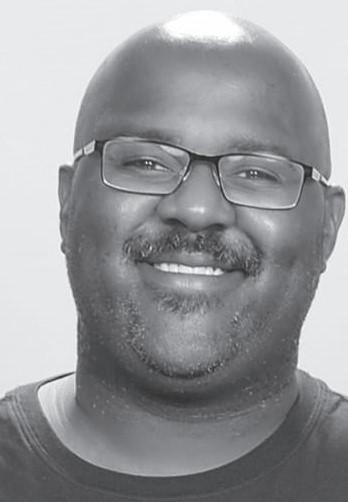
ARRANGEMENTS BY ANDERSON-RAGSDALE MORTUARY


Funeral services were held on 04/14/2023 at Highland Avenue Baptist Church, with a burial following at Greenwood Memorial Park. Final arrangements were entrusted to Anderson Ragsdale Mortuary.
Billie Ruth Stanley-Miller was born on Wednesday, July 9, 1947, to AT and Hattie B. Stanley in Shreveport, LA. She was the second of seven children born to this union. Billie was affectionately known by family members as “Grandma Billie,” “Auntie Billie,” “Wild Bill,” and “The Beeve.”
In 1954 she moved with her family to San Diego, CA. Billie was baptized at Noah’s Temple Free Church of God and Christ in Jesus’ Name by Bishop Stephen Flower Sr. Billie received her formal education in the San Diego Unified School District, graduating from San Diego High School in 1966. While attending high school, some of Billie’s favorite activities included track and field, modern dance, art classes and gymnastics.

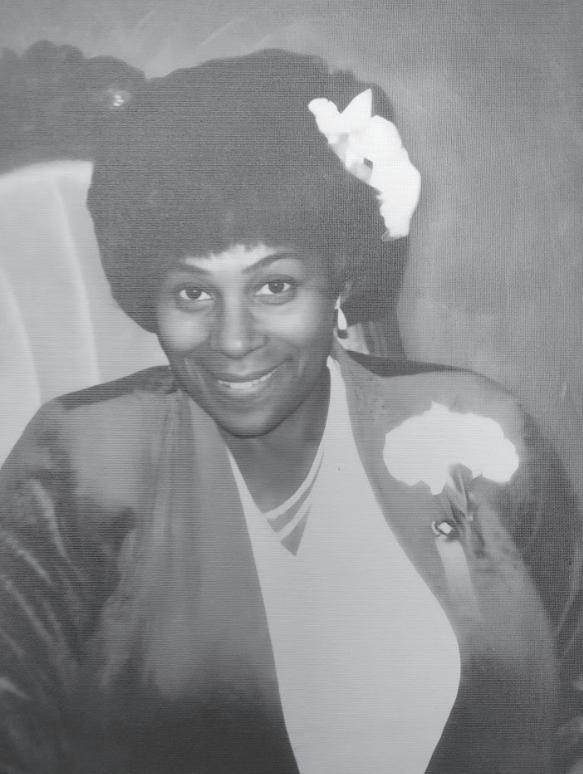
Billie married twice and to those unions, four beautiful children were born: William Morris (1967), Mia Nichelle Morris-Luce (1968), Myesha Michelle Miller (1976), and Larry Lavette Miller Jr. (1979).
Billie attended the San Diego College of Business where she pursued a degree in Business Administration. After thirty-five years of dedicated employment with the San Diego Unified School District, Billie retired to travel and spend more time with her mother and best friend, Hattie B. Stanley.
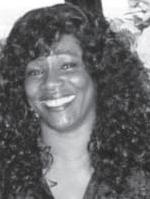
Our Lord and Savior Jesus Christ called Billie home on Saturday, March 18, 2023, after a courageous thirteen-year battle with breast cancer. She was preceded in death by her son: William Morris; parents: AT and Hattie B. Stanley; and younger brother: Johnny Stanley Sr.
Left to cherish Billie’s sweet and precious memories are her three loving and devoted children: Mia Nichelle, Myesha Michelle and Larry Lavette Jr.; step-daughter: LaKisha Miller; five siblings: Bettye Jean Brown (Roosevelt), Connie Jean Pruitt (Floyd), Annette Stanley, LaVonnie Stanley, and Arthur Thomas Stanley (Marsha); ten grandchildren: Tatiana (Tata-Baby), Joel III (Kelly) Alexander, Brandon, Robert Jr., King, Kailani, Ziemann, Zeno and Skjjonning; four great-grandchildren: Jakob, Levi, Olive and Blessen; and a host of nieces, nephews, cousins, other relatives and friends.
SUNSET 04/09/2023
Arrangements by Community Mortuary 855 Broadway Chula Vista, Ca. The homegoing celebration service was held Wednesday, April 26, 2023, at St Stephen’s COGIC 5825 Imperial Ave. San Diego, Ca 92114 at 11 am.



Christopher Scott Mitchell was born December 17, 1962, to Alfonzo and Erma Jean Mitchell in San Diego, Ca. He accepted Christ at an early age and was tutored by Bishop George D. McKinney and assistant pastor Charlie Clark. Chris proudly maintained many consecutive titles, namely handyman, hauling, chef of Chris’ Delicious BBQ, poet, and Neighborhood Street Evangelist; speaking the word and testifying with the intention of leading all he met to embrace the Holy Spirit. Stating to those much is given, much is required, gone too soon and never to be forgotten.
Chris met his wife Norma Jefferson at St. Stephens COGIC where they began their friendship which grew until they were joined together in holy matrimony almost two years later on October 29, 2016, by Bishop George D. McKinney at Harbor Island, in San Diego, Ca. They shared nine years of loving Christianfilled togetherness. He constantly referred to her as “Baby Cakes” or Norma Jean, giving her his mother’s middle name always stating she reminded him so much of her.
They continued to worship at St. Stephens and later moved their membership to University Ave. Baptist Church where he joined the choir and delighted in his devotion to Christ. Christopher was a walking testimony of the greatness of God and shared his beliefs with all that he encountered on a daily basis. Christopher passed on April 9, 2023. Mourning his passing with his devoted wife Norma Jefferson Mitchell are two sons Christopher S. Mitchell Jr and JaShawn C. Mitchell; daughter Jalia E. Mitchell; stepsons Rahsaan, Jamal & Jamel Davis of San Diego; father Alfonzo Mitchell; Aunt Audrey Nash; Uncles Charles and Ellis Mitchell; siblings Theresa Williams, Mark Mitchell and Myron (Joshalyn) Mitchell of San Diego Ca; sister in law Josephine Mitchell; loving nieces and nephews; relatives and many lifetime friends. He was predeceased by his mother, Erma J Mitchell; brother Alvin Mitchell; Aunts Marie and Myrdis Mitchell; Uncles Eugene, John, and Jeremiah Mitchell. His last discussion with family was about the song, My Soul Has Been Anchored In the Lord.
ARRANGEMENTS BY PREFERRED
CREMATION & BURIAL MORTUARY
Julia A. Clark was born on March 19, 1944, in Chicago, Illinois to Amanda Davis. She became Julia McCoy when her mother married Frank McCoy who adopted her.
Judy relocated to San Diego in 1967. She worked at the United States Postal Service from 1970 until her retirement in 1992.
She was then able to spend more time on her passion Grandma Incorporated (grandmainc). Judy also loved learning and practicing crafts with and for her grandkids and great-grandkids.
On March 14, 2023, Judy left this earth. She is proceeded by her Gran, her mother Bubby, and her Auntie Heddy.
She leaves to cherish her memory, loving husband Ransey Clark; children, Michael Miller, Edward Miller, Cyrstal Miller and Michelle Clark; grandchildren Brandi Alston, Michael Miller, Jr., Kristin Williams, Keierra Mitchell, Tyler Clark, Michelle Miller, Ariana Clark-Futrell, Jonnae Williams, and Rashad Williams; great-grandchildren Mariah, Kaliyanna, Jayla, Kaylanni, Jamir, Johanna, Malayvia, and Kaliyaa; Siblings, Dennis McCoy and Marguerite McCoy; and a host of other relatives and friends.
CREMATION & BURIAL MORTUARY
Funeral Services were held on March 14, 2023.
Joyce Annette Anderson was born on October 2, 1948, to Eva and John Cooper.
She was raised in Chicago, IL., and attended Walter Scott Elementary and Hyde Park High School.
She accepted the Lord Jesus Christ and was baptized at an early age. Thereafter, she attended Simpson Temple Church of God in Christ (COGIC) in Oakland, CA. She sang solos in the choir and loved hearing and studying the word of God.
Joyce met Kenneth Anderson and married him after their courtship. They had three beautiful children; Deserrae, Kenneth Jr., and Maurice. Kenneth enlisted in the Navy to support his growing family and was stationed in California. As a military wife, Joyce had the opportunity to live in many cities in the United States and traveled around the world. Her favorite place to live was Yokohama, Japan. She loved the local people and learned to speak Japanese.
After a twenty-year life as a military dependent, Joyce moved back to Chicago to be closer to her mother and other siblings. Several years later she moved to California to be closer to her children and grandchildren.
She was preceded in death by her ex-husband; Kenneth Eugene Anderson, daughter; Deserrae Fischbach, parents; John Cooper and Eva Cooper and brother; John Cooper.
Joyce Annette Anderson was called to heaven on March 30, 2023.

Left to cherish her memory are sons: Kenneth Jr. (Debra) of Fairfield, CA., Maurice of San Diego; siblings: Francesca Glinsey of Chicago, IL, Dmitri Cooper (Deborah) and Kelvin Cooper of Chicago, IL.; seven grandchildren; four great-grandchildren; several nieces and nephews and a host of relatives and friends who loved her and will miss her dearly.
Funeral Services were held on April 5, 2023 at Mt. Sinai Baptist Church.
Viola Webb was born in Corpus Christi, Texas to Mary and Will Allen Hall on April 17, 1935. She was the second child born in the family of eight.
Viola attended Holy Cross Catholic Elementary School and graduated from Solomon Melvin High School in 1953.

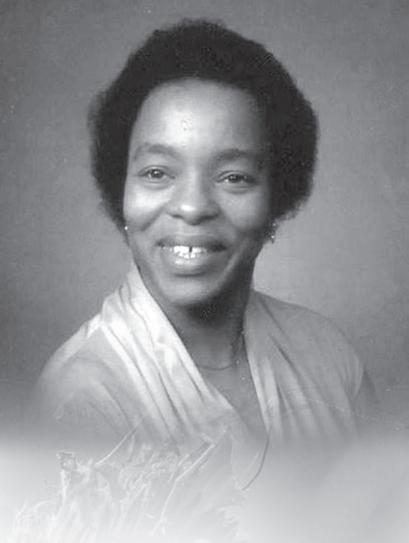
Viola was that “Virtuous Woman” and more! Vi was Rare - ValuableTrustworthy - Good - Willing - Motivated - Diligent - Resourceful - Dedicated and Discerning.
After high school, Viola worked and helped to see that her younger siblings had what they needed, assisting her parents in teaching and guiding them in the right direction. She kept everybody in line with her sweet spirit.
Viola married the love of her life, Eugene D. Webb, a young Navy man in 1958 and began her life as a young Navy wife. They were stationed in Washington State, Okinawa, Japan and California making each one home.
In 1961, after the death of her parents, Viola and her husband, before becoming parents themselves took on the responsibility of raising her three younger siblings, moving them to California to live with them. After a few years they were blessed with the birth of a daughter and son.
Viola was employed at the 32nd St. Navy Exchange in San Diego, CA for over thirty years before retiring, receiving many recognitions and awards.
Viola was a loyal member of Mount Sinai Baptist Church, singing in the choir, a member of the Women’s Mission Team, Bible Study Group and serving wherever she was needed.

Viola passed March 13, 2023. She is survived by husband Eugene Webb; children Eugenia Webb Rankins and Reginald (Debra) Webb; grandchildren Chaunteal Webb Candler, Eugene Webb and Reggie (Katherine) Webb all of San Diego; eleven great-grandchildren; siblings Ethel Webb, Sacramento, CA, Lula Jo Bell, Corpus Christi, TX, Blanche Topps, Santa Clarita, CA, Lonnie Hall, Humble, TX, William (Phyllis) Hall, San Antonio, TX, and Richard (Susan) Hall, Troutdale, OR; and a host of nieces, nephews, friends, and church family that will miss her dearly.



Funeral Services were held on April 16, 2023, at Mt. Olive Church of God in Christ. MarKeith Aaron Henderson was born July 27, 1972, to Christine and Rocky Henderson in Chicago, Illinois.
MarKeith accepted Christ as his Lord and Savior at an early age which served him well throughout his life in becoming a man of immense faith and integrity. After graduating from Ribet High School in 1990, MarKeith received a basketball scholarship to Mississippi Valley State. He continued to maintain a strong commitment to learning and in 2017, he earned his diploma in Nondestructive Testing Technology from Spartan College of Aeronautics and Technology. MarKeith was later employed by the University of California, San Diego Health in the Perioperative Services Department where he worked tirelessly to bring comfort and care to those in need.
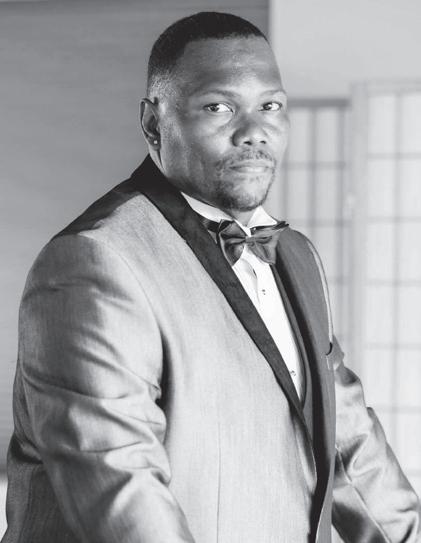
In 2010, MarKeith met the love of his life and his soulmate, Shaniqua Martin. They were united in marriage in San Diego, California on August 22, 2015. He was a devoted husband, a loving father, and a doting grandfather who took great pride in watching his grandchildren grow and thrive.
MarKeith had genuine kindness and a love for God for his family and friends which was displayed in every aspect of his life. He was also a prolific writer whose creativity knew no bounds and was evident in his thought-provoking social media posts and poetic writings.

MarKeith later rededicated himself to the Lord and decided to join Adonai Ministries Christian. He never hesitated to lend a helping hand in support of the church and helped support others’ dreams and goals as well. Markeith was called home to his eternal rest on April 10, 2023, at Kaiser Hospital in San Diego. He was surrounded by family, friends, and loved ones.
MarKeith leaves to cherish his memories wife Shaniqua Henderson; daughter Sierra McGhee (Volney, Jr.,); son Jaiden Henderson; four grandchildren; father Rocky Henderson; mother Christine Henderson; sister Octavia Henderson; aunts, uncles, cousins, nieces, nephews, other loved ones and friends.
Brothers and sisters, we do not want you to be uninformed about those who sleep in death, so that you do not grieve like the rest of mankind, who have no hope. For we believe that Jesus died and rose again, and so we believe that God will bring with Jesus those who have fallen asleep in him.
1 Thessalonians 4:13-14
“
Memory is a way of holding on to the things you love, the things you are, the things you never want to lose. ”
The Lord is close to the brokenhearted and saves those who are crushed in spirit. Psalm 34:18
In an effort to provide access to in-person library services every day of the week, the City of San Diego Public Library (SDPL) is adding Sunday hours at 14 of its 36 library locations. As of April 16, the 14 library branches will open 1 to 5 p.m. on Sundays, the last step to bringing library service hours back to pre-pandemic levels.


“The City is excited to restore these vital library services to residents,” said Chief Operating Officer Eric Dargan. “The success of the recent City career fair allowed the San Diego Public Library to fill the positions that make these Sunday hours possible. More than 200 people applied to work at the library, which is a testament to the great work that
SDPL does every day.”

Filling vacant positions has been a crucial step in expanding library hours. Starting this weekend, the following locations will offer Sunday hours:


• Carmel Valley Library.
• Central Library.
• City Heights/Weingart Library.
• La Jolla/Riford Library.
• Logan Heights Library.
• Mira Mesa Library.
• Mission Valley Library.
• North University Community Library.
• Otay Mesa-Nestor Library.
• Pacific Beach/Taylor Library.
• Point Loma/Hervey Library.
• Rancho Bernardo Library.
• Serra Mesa-Kearny Mesa Library.
• Valencia Park/Malcolm X Library.
“We know Sundays are popular with many of our patrons and families who can’t get to the library during the week,” said Library Director Misty Jones. “Restoring Sunday hours helps the library deliver on what our patrons are asking for and allows our staff to expand the services and programs the library offers.”
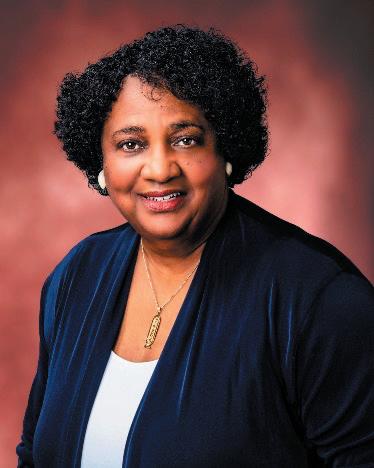
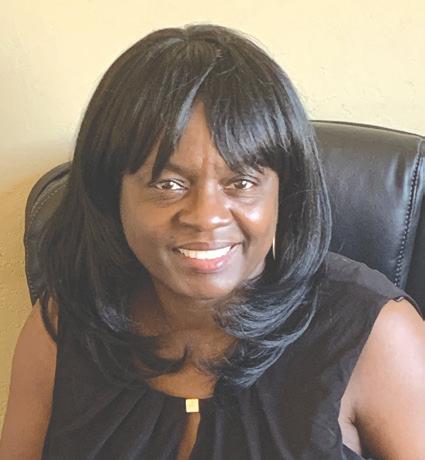
During open hours, library patrons can browse materials, attend pro -
grams, access public computers and check out mobile hotspots to connect devices to the internet. A listing of resources and educational programs for all ages is available on the Library Events Calendar.
All 36 SDPL locations are open

11:30 a.m. to 8 p.m. on Monday and Tuesday and 9:30 a.m. to 6 p.m. Wednesday through Saturday. Book drops are open 24 hours a day, seven days a week. For a full list of SDPL locations and services, visit sandiego.gov/publiclibrary.


Earth Day celebrators converged on Balboa Park last Sunday, April 24th, to pay homage to the planet.



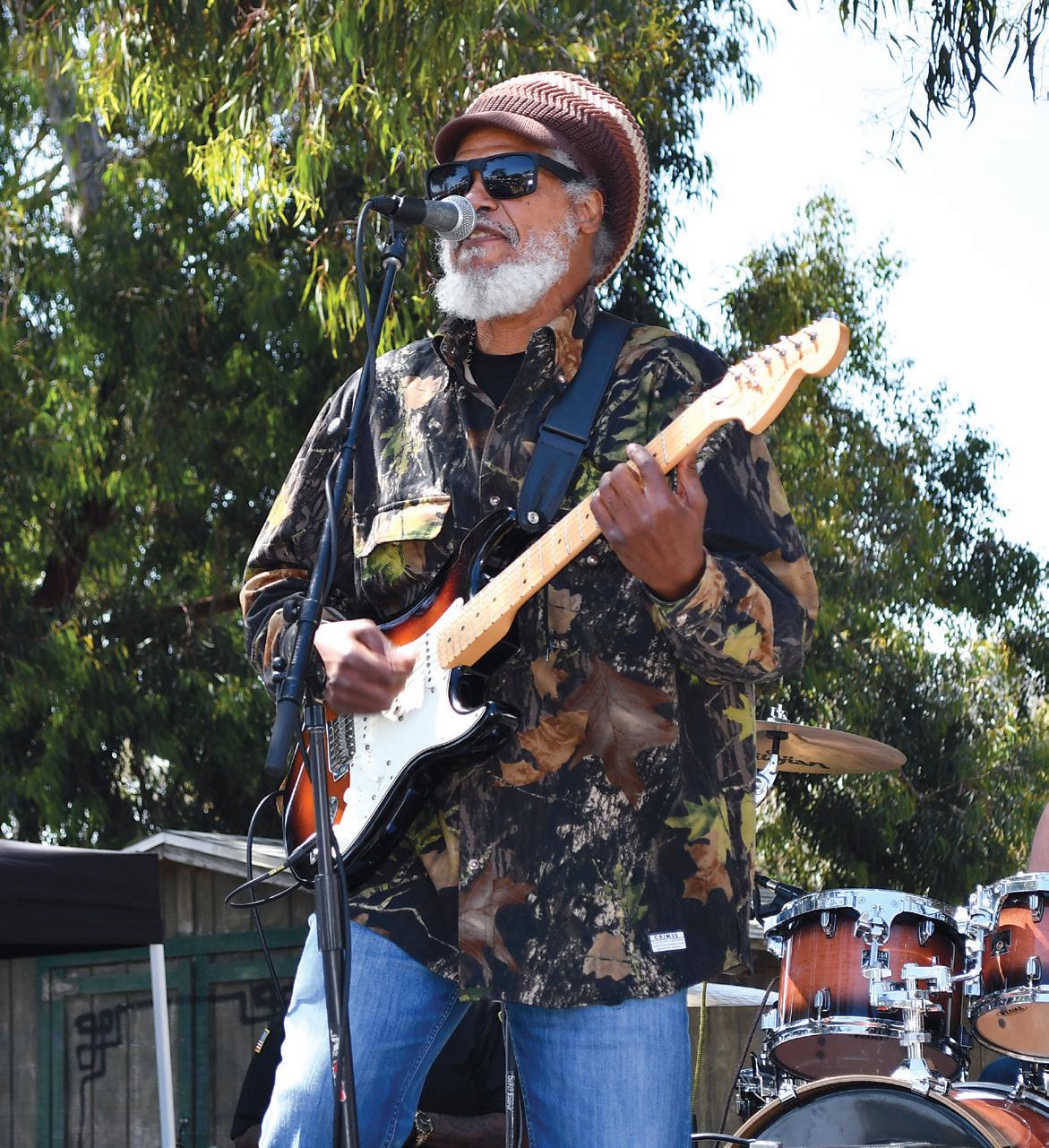
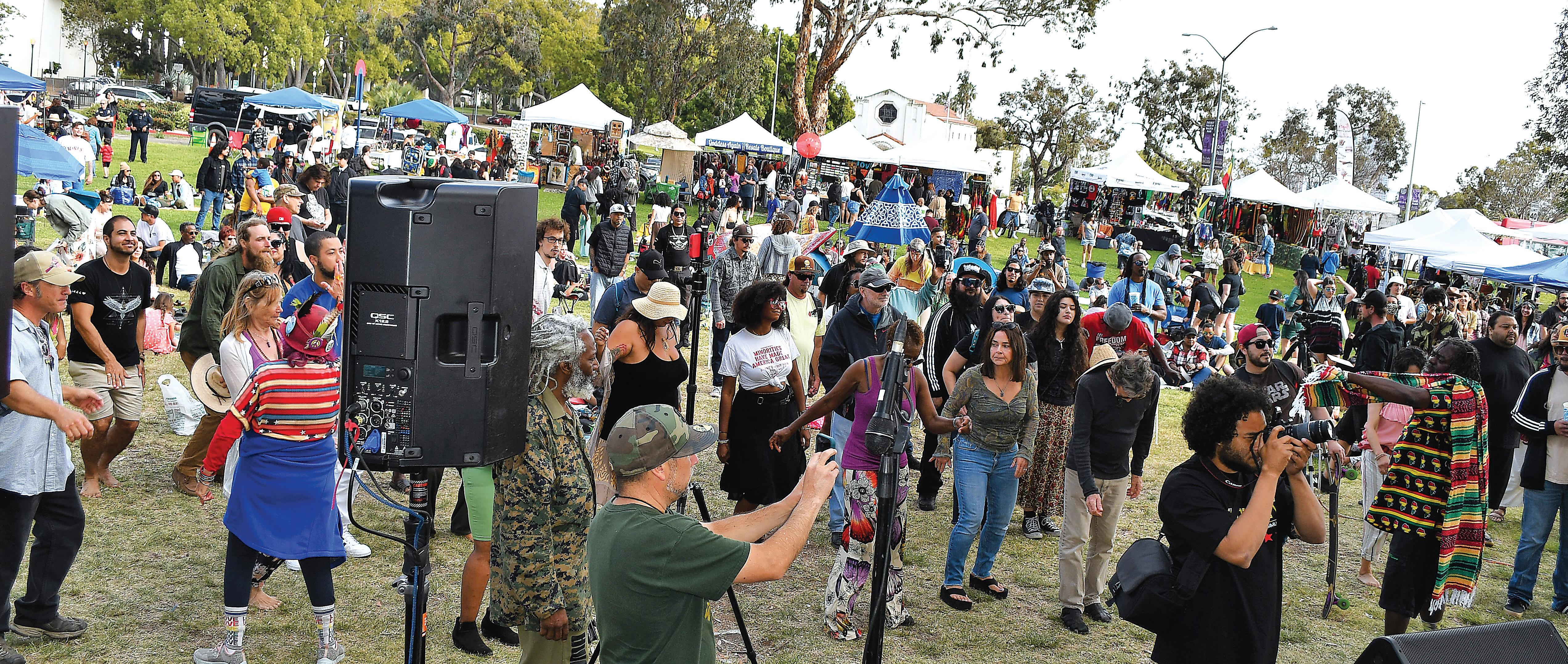
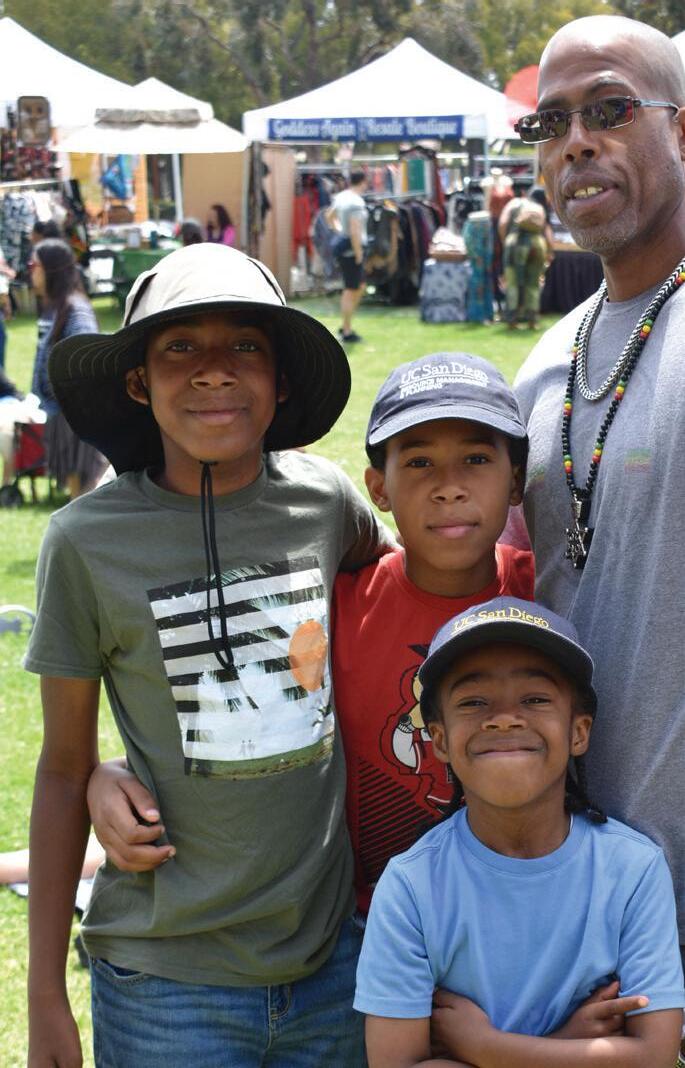
Covering a large spectrum of Earth’s issues, people chose the day to spread valuable information concerning Mother Earth, soak up some sunshine and promote peace, Children’s activities, food, dance-classes and much more kept the big park busy.

The Worldbeat Cultural Center was the musical hub for all things Afro-centric, featuring reggae music from local and nationally known recording artists. Worldbeat hosted its Annual Multicultural Earth Day Celebration Sunday afternoon. The smell of African food and the sounds of Reggae music filled the air. The sounds were provided by DJ Dub Carlos of Righteous Street Productions.
Along with the many vendors, was a Reggae concert that featured Andrew Bees (Black Uhuru), Intent (Steel Pulse), Rob

Symeonn, Princess Akua and special guest speaker Yah’Ki Awakened, who gave a message of healing.
“When you live together on one accord, supporting one another, loving one another, embracing each other’s cultures, and recognizing we are all one people, that’s when The Most High God steps in and the great peace comes. The Worldbeat Center is a place where you can experience that and that’s why I’m here,” said Alice Smith-Cooper, a vendor at the event.
“It’s good to see us all together in a symbiotic relationship. It’s going to take these types of things to literally save Earth, to save our seeds, our soil, save our herbs, to start shopping organically and to start eating organically. To really have longevity for the future generations of our children to thrive and survive,” said guest speaker Yah’Ki Awakened.
“The Worldbeat Center is a consistent place and source of rich
history and culture. For years this place has been a rallying place for our community and it’s very important we support the Worldbeat Center like it supports us,” said an attendee at the Earth Day Celebration.
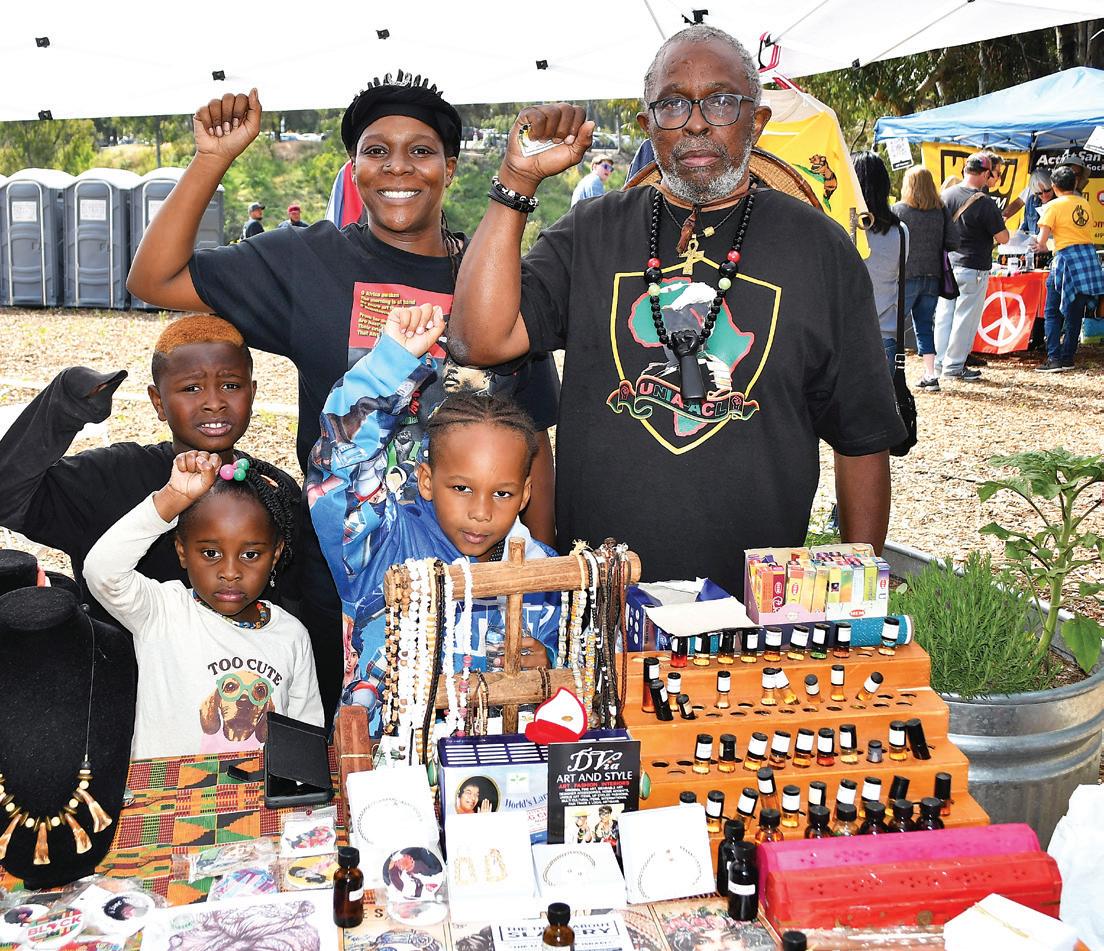
The Worldbeat Center is a pillar of the community of San Diego and its founder and Executive Director, Makeda Makossa, at 80, does not appear to be slowing down.

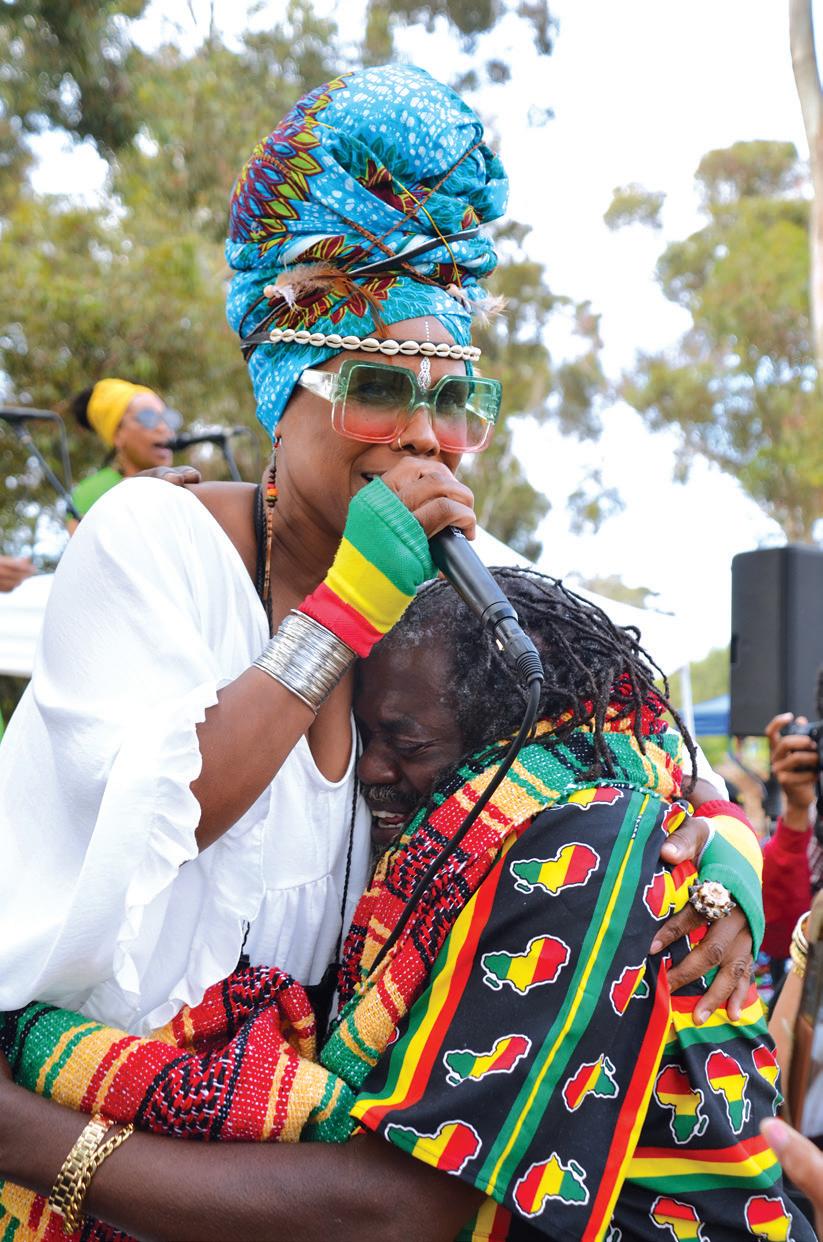
Vendor booths were a very important component to the Balboa Park’s Earth Day landscape. Vendor Johnny Ray of UNIA-ACLRC 2020 had this to say about this year’s Earth Day experience: “I think this a very important event with all this positivity going on. People sharing their information on healthy eating, how to grow food and how to take care of our earth. We only have one. This is a beautiful day.”

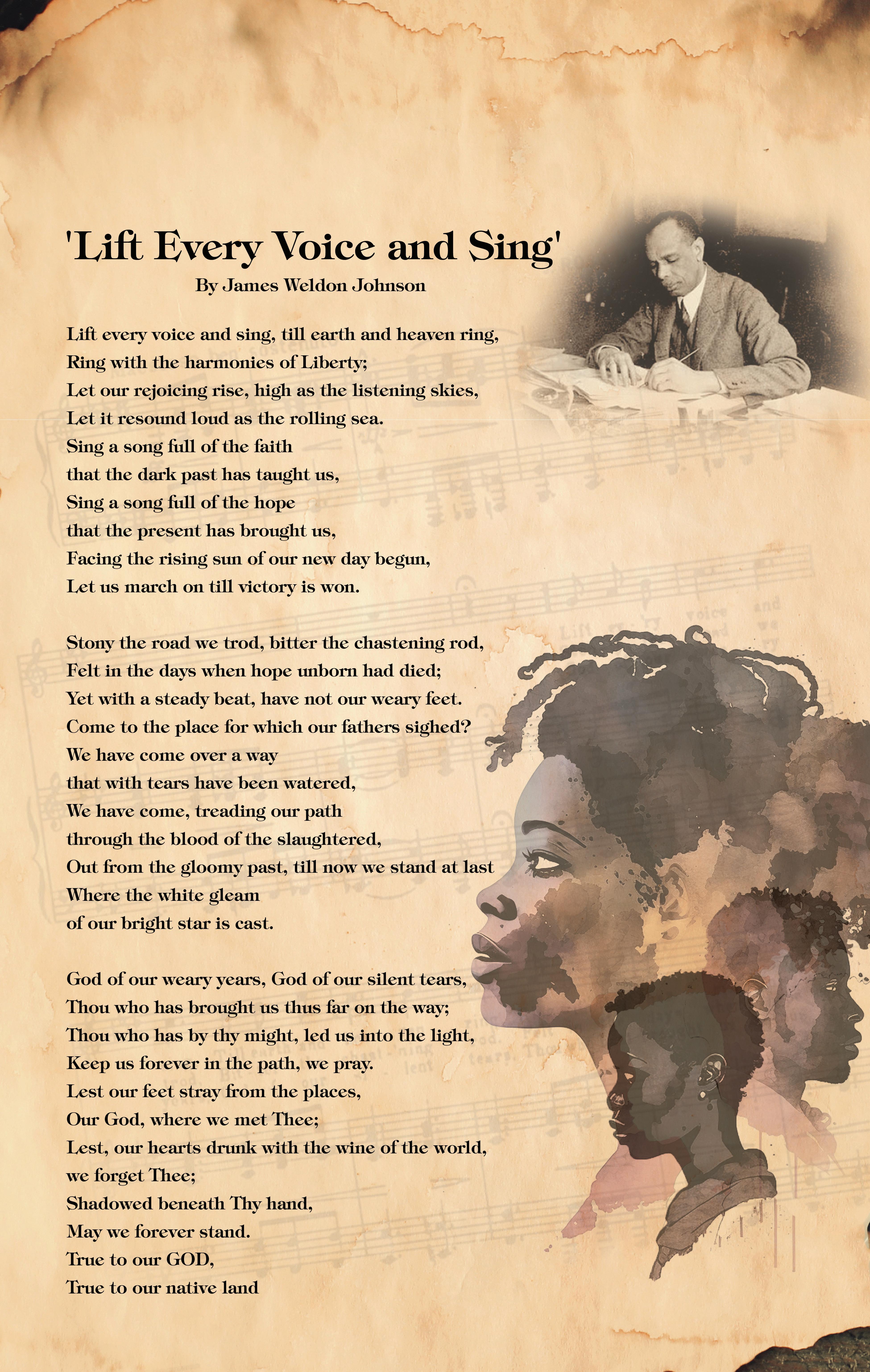
Continued from cover
Among Black Americans, suicide is having a unique impact on Black men.
This fact is well-known to Etienne Maurice, the founder and CEO of WalkGood LA, a community wellness-focused organization based in Los Angeles and led by Black and Brown individuals.
“When I was going through my psychosis and I was manic, I did have suicidal thoughts. I never thought I was going to actually commit to doing it, but the thought was scary enough,” Maurice told California Black Media (CBM) at his Black men’s healing circle event in Los Angeles, titled YouGood.
The high-profile suicides deaths of Boss and Alexander and the rising suicide rate among Black men –while tragic and unsettling – are not surprising to Jamal Averett, an actor and attendee at YouGood, who told CBM many Black men are “screaming inside.”
Data from the California Mental Health Services Oversight and Accountability Commission, indicates that the suicide rate for Black individuals in California rose by
Continued from cover
Autism Speaks has an Autism Response Team that comprises a trained team of individuals who provide information, referrals and access to no-cost resources and tools for all autism-related needs.
According to the latest analysis from the CDC, one in every 36 eight-year-old children in the United States has been diagnosed with ASD. While all previous CDC reports show higher rates of ASD in White children compared to Black or Hispanic children, the latest report shows the opposite. This is the first year that overall rates of ASD were consistently higher among Black (2.9%), Hispanic (3.2%) and Asian or Pacific Islander (3.3%) children compared to white (2.4%) children.”
According to the Autism Developmental Disabilities Monitoring Network, 1 in 22 (4.5%)
Continued from cover
Lester told police he had just gotten in bed when he heard the doorbell. Before answering, he grabbed his revolver. Lester said he then saw Yarl pulling on the storm door handle, something Yarl disputes, according to the probable cause statement.
Lester told police he thought the teen was attempting to break into the home and he was “scared to death,” the statement said. Without saying a word, Lester fired twice.
Yarl said the first shot struck him in the head, knocking him to the ground. As he lay there, the second bullet pierced his arm. Yarl told police he fled as the homeowner yelled, “Don’t come around here,” the statement said.
Yarl said he went to “multiple” homes asking for help. A neighbor ultimately used towels to stem the bleeding until paramedics arrived.
Lester was charged with first-degree assault Monday, April 17 and turned himself in Tuesday, April 18.
Some civil rights leaders have called for a hate crime charge, but Zachary Thompson, Clay County prosecuting attorney, said first-degree assault is a higher-level crime with
31.1% between 2010 and 2019, a substantial increase when compared to other ethnic groups.
“I think in order for us to really get those rates down, we have to build community with other Black men,” Averett said.
YouGood brought in 181 Black men to participate in guided yoga, meditation, journaling and exercises designed to encourage expressing their feelings. One of the goals of the event was to challenge the stigma of emotional vulnerability among Black men.
“Growing up, we’re always taught to hold it in. Just be tough,” Averett said.
The organizers stated that another significant objective of this monthly event is to create a safe and supportive community for Black men, who have been conditioned to exhibit stoicism from a young age, to initiate the process of healing from the historical and daily traumas they have experienced.
Maurice explained how traumas, left unchecked, can take hold of someone’s life and spiral out of their control.
“I’d be in bed and be arguing with my mom, because I didn’t want
children in California are diagnosed with autism. That number is significantly higher—almost double— than those stated in a December report, which stated 1 in 44 Golden State children are autistic.
April is Autism Acceptance Month (AAM). During AAM, especially on World Autism Day on April 2, individuals and organizations around the world educate the public about autism spectrum disorder (ASD) and the stigma people living with the neurodevelopmental condition and their families face. ASD is a disability that can inhibit social interactions and make learning difficult, depending on the severity of the autism.
Advocates hope increased awareness will help the people across the world become more sensitive, inclusive and empathetic to autistic people and the myriad challenges they and their loved ones navigate each day.
The Autism Society declared the
a longer sentence — up to life in prison. Lester also was charged with armed criminal action, which has a penalty range of three to 15 years.
Lester was to be arraigned April 19. An attorney was not yet listed for him.
The wounded teen is recovering at home, but his mother, Cleo Nagbe, said the trauma is evident.
She told “CBS Mornings” co-host Gayle King that her son is “able to communicate mostly when he feels like it, but mostly he just sits there and stares and the buckets of tears just rolls down his eyes.”
“You can see that he is just replaying the situation over and over again, and that just doesn’t stop my tears either,” she said.
Yarl’s classmates rallied for him last Tuesday, holding signs that read, “We Walk For RALPH,” “Stop The Hate” and “Justice 4 RALPH.”
The shooting outraged many in Kansas City and across the country. Civic and political leaders including President Joe Biden demanded justice. Biden also invited Yarl to the White House. Thompson said last week that
to get out of bed,” Maurice said, sharing memories of interactions with his mother, the actress Sheryl Lee Ralph of Moesha and A bbott Elementary fame. “And I didn’t know why because I wasn’t that person — my mom never raised me to be that person, and she didn’t know me to be that person. So, it can be frustrating on all levels.”
Maurice noted that there is evidence that his inability to express his inner turmoil is something that some other Black men who have struggled with suicidal ideation have experienced.
“I didn’t even have a language for mental health. I think what drove me to that point was not having control,” Maurice said.
Rodrego A. Byerly is the President and CEO of EVITARUS, California’s only Black-owned-and-led public opinion and market research firm. He echoed Maurice’s point.
“There are a number of contributing factors I would point to, first and foremost a need for greater education and resources at our fingertips for how to cope with stress in all of its forms in life,” Byerly said.
What makes this crisis unusual and alarming is that the suicide rates for non-Hispanic White peo-
first National Autism Awareness month in 1970. Over the last five decades, advocates have organized fundraisers, walks, public forums and social media conversations to raise public awareness around the neurodevelopmental condition.
Although there are other programs across California (and the United States) that try assisting in the de-stigmatization of autism diagnosis among minority communities, rates among Black Californians are becoming alarmingly worse.
Areva Martin, an award-winning civil rights attorney and special-needs advocate, says that it is common for African American families to struggle getting accurate diagnoses or early intervention for their children’s ASD.
“The awareness of the racial disparities in families with autistic spectrum disorder is becoming more,” says Martin. “But I would not say that we have seen a vast improvement across the board in the way
ple decreased by 4.5% between 2019 and 2020, while the rate for non-Hispanic Black people increased by 4% according to a Centers for Disease Control and Prevention (CDC) report.
Shakari Byerly, Managing Partner and Principal Researcher at EVITARUS, pointed to racism and social unrest as potential explanations for this phenomenon.
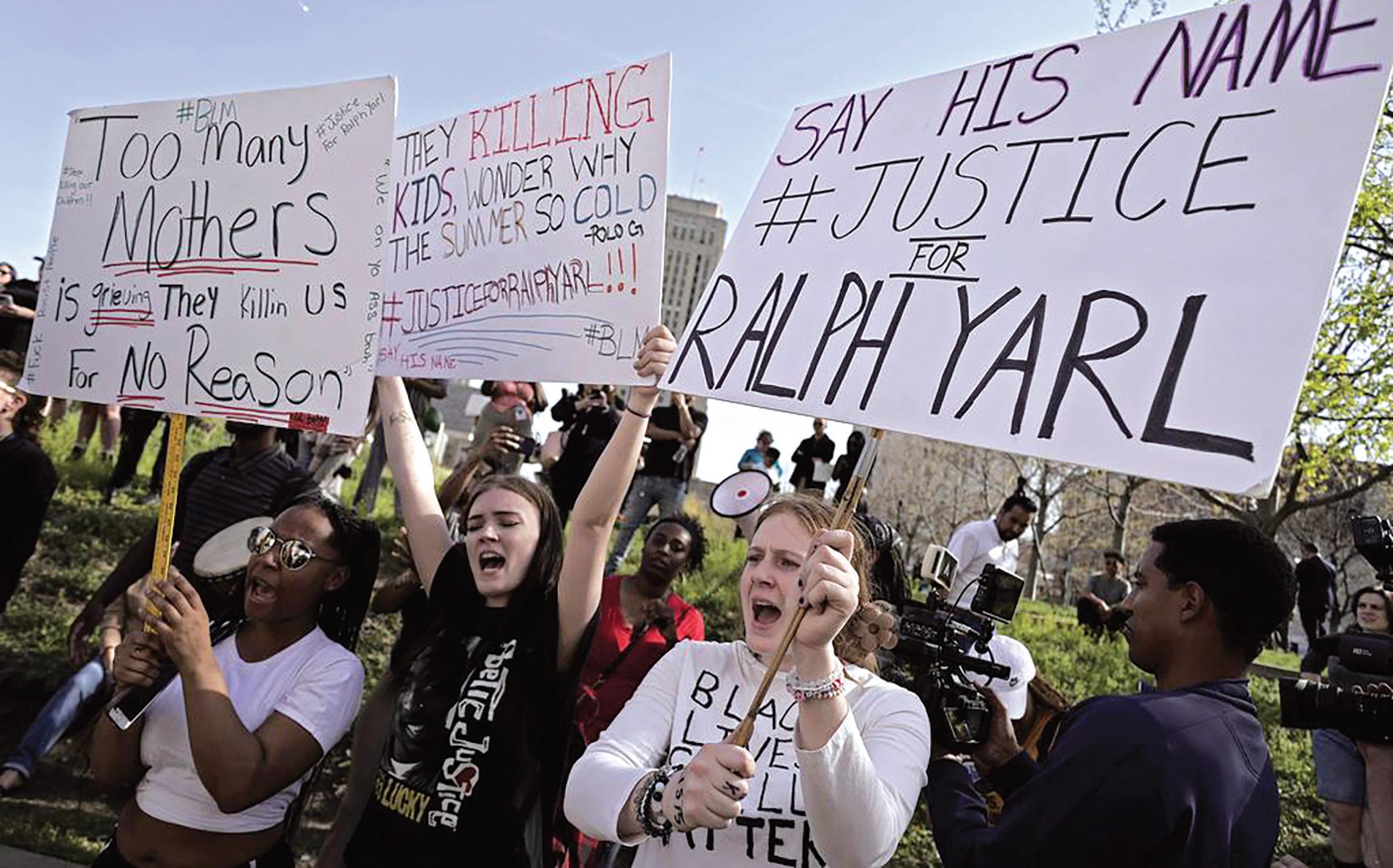
“Everyday discrimination is associated with higher rates of depressive symptoms, and also what’s called suicide ideation, which are thoughts or contemplations of suicide,” Ms. Byerly said. “I think also the fact that depression and anxiety are gateways to suicide ideation as well.”
Dr. Kristee Haggins, Executive Director of Safe Black Space, said that while disproportionate violence targeting Black people is not a new occurrence, the level of exposure to incidents of anti-Black violence has increased.
“There’s this heightened view again, because it was splashed all across the media,” Haggins explained. Maurice told CBM that repeated, highly publicized murders of Black men – specifically the murder of Ahmaud Arbery – is what inspired
that African American children are provided a diagnosis, let alone early interventions.”
Martin pointed out that Black families must often hire private attorneys to help them navigate through the services that are supposed to be freely provided to families who have autistic members.
“I have seen and heard many parents with horror stories about trying to access free public services through their children’s schools, but it is a hassle for them because the process can be too bureaucratic,” added Martin.
Black families, historically, have faced numerous obstacles to accessing resources that are easily available to others. This difficulty can be attributed to numerous factors, such as a bias against helping the Black community, challenging environmental circumstances, or needlessly complicated processes that can prove overwhelming for those who are unaware of where to turn.
him to build his organization, stating that he started WalkGood to “fight for Black lives.”
The Black transgender community is also witnessing a surge in suicidal rates and this population has also been subjected to heightened levels of violence and hate crimes.
Rhonda Smith, Executive Director of the California Black Health Network, statewide organization committed to promoting health equity for African Americans and Black Immigrants, advises those struggling with suicidal ideation to reach out to people close to them, utilize resources in the community, such as churches, and call 988 if they are experiencing a crisis.
Smith — as well as Maurice and Averett — assured those who are dealing with depression and desperation that although you might feel otherwise, you are not alone. For suicide prevention resources in your community and to learn more about the subject visit www./focus. senate.ca.gov/mentalhealth/suicide on the California State Senate website.
California Black Media’s coverage of Mental Health in California is supported by the California Health Care Foundation.
This suggests there is an even larger number of Black individuals who have not been diagnosed and/or have never received the necessary services to thrive going forward.
If experts and practitioners agree that an earlier diagnosis leads to more effective interventions, then the process to receiving that diagnosis should not be tedious and discouraging. It is undeniable that when it comes to autism in the Black community, more can be done—and it can be done better.
“It’s a fact that more work needs to be done and researchers will need to create better pipelines to gather the data to create sustainable change within the community,” said JonesJordan.
This California Black Media report was supported in whole or in part by funding provided by the State of California, administered by the California State Library.
there was a “racial component” to the shooting, without elaborating. But Assistant Prosecuting Attorney Alexander Higginbotham clarified in an email to The Associated Press that “there is not a racial element to the legal charges that were filed.”
Still, some — including lawyers for Yarl’s family — pressed the racial dimension of the case.
Missouri NAACP President
Nimrod Chapel Jr. said in a statement that a Black suspect would have been in jail from the start.
Legal experts believe Lester’s lawyers will claim self-defense under Missouri’s “stand your ground” law, which allows for the use of deadly force if a person fears for his or her life. Missouri is one of roughly 30 states with such statutes.
Robert Spitzer, a professor emeritus of political science at the State University of New York, Cortland, whose research focuses on gun policy and politics, said the Missouri law provides “wide latitude for people to use lethal force.”
St. Louis defense attorney Nina McDonnell agreed. She said prosecutors have a strong case but the “stand your ground” defense is a “huge hurdle” to overcome.
CLASSIFIEDS / LEGAL NOTICES
of business was:
SENIOR ITS PLANNER Manage the development of Intelligent Transportation Systems (ITS) initiatives. Call (619) 699-1900 or visit https://www.governmentjobs.com/careers/sandag? for information. Open until filled. EOE. EMPLOYMENT Include the following information: • Full Name Billing address Date(s) you want the ad to appear • Contact phone number All classified ads are prepaid. Deadline is Tuesdays by NOON to run that week. LEGAL NOTICES
STATEMENT 2023-9007295 Fictitious business name(s): You Belong Preschool and Child Care Center Located at: 4218 Pepper Dr. San Diego, CA 92105 County of San Diego
This business is conducted by: An Individual Registrant has not yet begun to

PUBLIC NOTICE Classified ads can be placed in person, by phone, fax, or email Monday-Thursday 9:30 a.m. - 3:30 p.m. P:619-266-2233 F:619-266-0533 E:ads@sdvoice.info
COUNTY OF SAN DIEGO ARCC
PROPOSED FEE CHANGES
PUBLIC NOTICE
NOTICE TO BIDDERS
NOTICE IS HEREBY GIVEN that the City of San Diego (City) is seeking to receive Electronic Bids for the below named Public Works project. The solicitation, including plans and specifications, may be obtained from the City's website at: https://www.sandiego.gov/cip/ bidopps
Contractors intending to submit a Bid must be prequalified. Please refer to the solicitation for instructions.
Project Name: Energy Efficiency, Renewable Energy, Energy Resiliency, and Zero Emissions Retrofits
To Municipal Facilities
Project Number: K-23-2177-
DB2-3
Mandatory Pre-Bid Meeting: 4/27/23 at 1:30 PM. Pacific at Team Meetings
License Requirement:
It is the policy of the City of San Diego to encourage equal opportunity in its Construction and Consultant contracts. Bids or proposals from local firms, small, minority-owned, disabled, veteran-owned, and womenowned businesses are strongly encouraged. Contractors are encouraged to subcontract with and/or participate in joint ventures with these firms. The City is committed to equal opportunity and will not discriminate with regard to race, religion, color, ancestry, age, gender, disability, medical condition or place of birth; and will not do business with any firm that discriminates on any basis.
Bids shall be received no later than the date and time noted above at: City of San Diego's Electronic Biding Site PlanetBids at: https://www.planetbids.com/portal/ portal.cfm?CompanyID=
17950
Claudia C Abarca, Director Purchasing & Contracting
Department
April 17, 2023
4/27/23
CNS-3691467# VOICE & VIEWPOINT
FICTITIOUS
BUSINESS NAME
4/20, 4/27
FICTITIOUS BUSINESS NAME STATEMENT 2023-9007022
Fictitious business name(s): Cybertron Solutions Located at: 2533 Ulric St. San Diego, CA 92111 County of San Diego 31853 Victoria Pl. Menifee, CA 92584 County of San Diego
This business is conducted by: An Individual Registrant has not yet begun to transact business under the name(s) above

This business is hereby registered by the following: Marvan Clemons 2533 Ulric St. San Diego, CA 92111
This statement was filed with the Recorder/County Clerk of San Diego County on March 29, 2023
This fictitious business name will expire on March 29, 2028
Clerk of San Diego County on February 27, 2023
This fictitious business name will expire on February 27, 2028
4/13, 4/20, 4/27
FICTITIOUS BUSINESS
STATEMENT 2023-9004460
business name(s):
Craft Shop SD Located at: 2616 Meadows Trail Ln. Chula Vista, CA 91915 County of San Diego
This business is conducted by:
Married Couple Registrant has not yet begun to transact business under the name(s) above This business is hereby registered by the following: Mayra Jones 2616 Meadows Trail Ln. Chula Vista, CA 91915
James Anthony Jones 2616 Meadows Trail Ln. Chula Vista, CA 91915
This statement was filed with the Recorder/County Clerk of San Diego County on February 28, 2023
This fictitious business name will expire on February 28, 2028 4/06, 4/13, 4/20, 4/27
FICTITIOUS BUSINESS
NAME STATEMENT 2023-9005761
Fictitious business name(s): KINGME SUPPLY Located at: 2347 Camino De Las Palmas
why the petition should not be granted. If no written objection is timely filed, the court may grant the petition without a hearing. NOTICE OF HEARING Date: June 5, 2023 Time: 8:30 A.M. Dept. C-61 (To appear remotely, check in advance of the hearing for information about how to do so on the court's website. To find your court's website go to www.courts.ca.gov/find-mycourt.htm)
HEARING WILL OCCUR ON THE DATE SPECIFIED IN THE ORDER TO SHOW CAUSE.
The court will review the documents filed as of the date specified on the Order to Show Cause for Change of Name (JC Form #NC-120).
If all requirements for a name change have been met as of the date specified, and no timely written objection has been received (required at least two court days before the date specified), the Petition for Change of Name (JC Form #NC-100) will be granted without a hearing. One copy of the Order Granting the Petition will be mailed to the petitioner.
To change a name on a legal document, including a birth certificate, social security card, driver license, passport, and other identification, a certified copy of Decree
Changing Name (JC Form #NC-130) or Decree
Changing Name and Order Recognizing Change of Gender and for Issuance of New Birth Certificate (JC Form #NC-230) may be required. Contact the agency(ies) who issue the legal document that needs to be changed, to determine if a certified copy is required.
A certified copy of Decree Changing Name (JC Form #NC-130) or Decree
Changing Name and Order Recognizing Change of Gender and for Issuance
THE COURT ORDERS that all persons interested in this matter appear before this court at the hearing indicated below to show cause, if any, why the petition for change of name should not be granted.
Any person objecting to the name changes described above must file a written objection that includes the reasons for the objection at least two court days before the matter is scheduled to be heard and must appear at the hearing to show cause why the petition should not be granted. If no written objection is timely filed, the court may grant the petition without a hearing.
NOTICE OF HEARING
Date: July 12, 2023
Time: 8:45 A.M. Dept. 503
(To appear remotely, check in advance of the hearing for information about how to do so on the court's website. To find your court's website go to www.courts.ca.gov/find-mycourt.htm)
The address of the court is: 1100 Union St. San Diego, CA 92101 4/27, 5/04, 5/11, 5/18
SUPERIOR COURT OF CALIFORNIA County of San Diego 330 W. Broadway San Diego, CA 92101 Civil Division 37-2023-00016081CU-PT-CTL
Petitioner or Attorney: Guadalupe Nunez Luna
To All Interested Persons: Petitioner Guadalupe Nunez Luna filed a petition with this court for a decree changing names as follows:
PRESENT NAME: Guadalupe Nunez Luna
PROPOSED NAME: Luna Nunez Herrera
THE COURT ORDERS that all persons interested in this matter appear before this court at the hearing indicated below to show cause, if any, why the petition for change of name should not be granted.
of New Birth Certificate
(JC Form #NC-230) may be obtained from the Civil Business Office for a fee. Petitioners who are seeking a change of name under the Safe at Home program may contact the assigned department for the information on obtaining certified copies.
If all the requirements have not been met as of the date specified, the court will mail the petitioner a written order with further directions.
If a timely objection is filed, the court will set a hearing date and contact the parties by mail with further directions.
A RESPONDENT OBJECTING TO THE NAME CHANGE MUST FILE A WRITTEN OBJECTION AT LEAST TWO COURT DAYS (excluding weekends and holidays) BEFORE THE DATE SPECIFIED. Do not come to court on the specified date. The court will notify the parties by mail of a future hearing date
Any Petition for the name change of a minor that is signed by only one parent must have this Attachment served along with the Petition and Order to Show Cause, on the other nonsigning parent, and proof of service must be filed with the court.
The address of the court is:
330 W. Broadway San Diego, CA 92101 4/27, 5/04, 5/11, 5/18
SUPERIOR COURT OF CALIFORNIA County of San Diego
330 West Broadway San Diego, CA 92101 Hall of Justice Courthouse
37-2023-00015292CU-PT-CTL
Petitioner or Attorney:
Kaiden Michael Bass
To All Interested Persons: Petitioner
Kaiden Michael Bass filed a petition with this court for a decree changing names as follows:
of New Birth Certificate (JC Form #NC-230) may be required. Contact the agency(ies) who issue the legal document that needs to be changed, to determine if a certified copy is required.
A certified copy of Decree Changing Name (JC Form #NC-130) or Decree
Changing Name and Order Recognizing Change of Gender and for Issuance of New Birth Certificate (JC Form #NC-230) may be obtained from the Civil Business Office for a fee. Petitioners who are seeking a change of name under the Safe at Home program may contact the assigned department for the information on obtaining certified copies.
If all the requirements have not been met as of the date specified, the court will mail the petitioner a written order with further directions. If a timely objection is filed, the court will set a hearing date and contact the parties by mail with further directions.
A RESPONDENT OBJECTING TO THE NAME CHANGE MUST FILE A WRITTEN OBJECTION AT LEAST TWO COURT DAYS (excluding weekends and holidays) BEFORE THE DATE SPECIFIED. Do not come to court on the specified date. The court will notify the parties by mail of a future hearing date
Any Petition for the name change of a minor that is signed by only one parent must have this Attachment served along with the Petition and Order to Show Cause, on the other nonsigning parent, and proof of service must be filed with the court.
The address of the court is:
330 West Broadway San Diego, CA 92101 4/20, 4/27, 5/04, 5/11
Petition will be mailed to the petitioner.
To change a name on a legal document, including a birth certificate, social security card, driver license, passport, and other identification, a certified copy of Decree
Changing Name (JC Form #NC-130) or Decree
Changing Name and Order
Recognizing Change of Gender and for Issuance of New Birth Certificate (JC Form #NC-230) may be required. Contact the agency(ies) who issue the legal document that needs to be changed, to determine if a certified copy is required.
A certified copy of Decree
Changing Name (JC Form #NC-130) or Decree
Changing Name and Order
Recognizing Change of Gender and for Issuance of New Birth Certificate (JC Form #NC-230) may be obtained from the Civil Business Office for a fee. Petitioners who are seeking a change of name under the Safe at Home program may contact the assigned department for the information on obtaining certified copies.
If all the requirements have not been met as of the date specified, the court will mail the petitioner a written order with further directions.
If a timely objection is filed, the court will set a hearing date and contact the parties by mail with further directions.
A RESPONDENT OBJECTING TO THE NAME CHANGE MUST FILE A WRITTEN OBJECTION AT LEAST TWO COURT DAYS (excluding weekends and holidays) BEFORE THE DATE SPECIFIED. Do not come to court on the specified date. The court will notify the parties by mail of a future hearing date
Vista, CA 92081 North County Division 37-2023-00013285CU-PT-NC
Petitioner or Attorney: Solveig Kathrine Henn
To All Interested Persons: Petitioner Solveig Kathrine Henn filed a petition with this court for a decree changing names as follows:
PRESENT NAME: Solveig Kathrine Henn
PROPOSED
NAME: Solveig Kathrine Kinzel
THE COURT ORDERS that all persons interested in this matter appear before this court at the hearing indicated below to show cause, if any, why the petition for change of name should not be granted.
Any person objecting to the name changes described above must file a written objection that includes the reasons for the objection at least two court days before the matter is scheduled to be heard and must appear at the hearing to show cause why the petition should not be granted. If no written objection is timely filed, the court may grant the petition without a hearing.
NOTICE OF HEARING
Date: May 30, 2023
Time: 8:30 A.M. Dept. 25
The address of the court is: 325 S. Melrose Dr. Vista, CA 92081
(To appear remotely, check in advance of the hearing for information about how to do so on the court's website. To find your court's website go to www.courts.ca.gov/find-mycourt.htm)
NO HEARING WILL OCCUR ON THE DATE SPECIFIED IN THE ORDER TO SHOW CAUSE.
signed by only one parent must have this Attachment served along with the Petition and Order to Show Cause, on the other nonsigning parent, and proof of service must be filed with the court.
The address of the court is: 325 S. Melrose Dr. Vista, CA 92081 4/13, 4/20, 4/27, 5/04
SUMMONS
SUPERIOR COURT OF CALIFORNIA, COUNTY OF SAN DIEGO 2851 Meadow Lark Dr. San Diego, CA 92123
CITATION FOR FREEDOM FROM PARENTAL CUSTODY AND CONTROL
Attorney or Party without Attorney: Armando Solis Barrios Case Number: 23AD000134C IN THE MATTER OF Xareni Yezel Zapien (Date of Birth: 11/30/2007 A Minor)
To (name): GUATI ORANIO ZAPIEN
You are ordered to appear in the Superior Court of the State of California, County of San Diego, in Department JC-02 at the court location indicated above on June 09, 2023, at 1:30 PM, to show cause, why (names) XARENI YEZEL ZAPIEN should not be declared free from parental custody and control as requested in the petition. This hearing will be conducted by video or telephone through the 2851 Meadowlark Drive San Diego, CA 92123. See attached instructions and call the court to have the video link emailed to you.
STATEMENT OF WITHDRAWAL FROM PARTNERSHIP OPERATING UNDER FICTITIOUS BUSINESS NAME
2023-9007912
Fictitious business name(s): Clean I Love San Diego
The original statement of this fictitious business was filed in San Diego County on: 12/22/22, and assigned file number 2022-9027728 Located at: 3549 Menlo Ave. San Diego, CA 92105 County of San Diego
The following partner has withdrawn: Jose Sifuentes 3549 Menlo Ave. San Diego, CA 92105 4/20, 4/27, 5/04, 5/11
SUPERIOR COURT OF CALIFORNIA County of San Diego 330 W. Broadway San Diego, CA 92101 Central Division Hall of Justice
37-2023-00014155CU-PT-CTL
Petitioner or Attorney:
Vera A. Livingstone, 182333
To All Interested Persons: Petitioner Reza Behrou filed a petition with this court for a decree changing names as follows:
PRESENT NAME: Reza Behrou
PROPOSED NAME: Ryan Anderson
THE COURT ORDERS that all persons interested in this matter appear before this court at the hearing indicated below to show cause, if any, why the petition for change of name should not be granted.
Any person objecting to the name changes described above must file a written objection that includes the reasons for the objection at least two court days before the matter is scheduled to be heard and must appear at the hearing to show cause
Any person objecting to the name changes described above must file a written objection that includes the reasons for the objection at least two court days before the matter is scheduled to be heard and must appear at the hearing to show cause why the petition should not be granted. If no written objection is timely filed, the court may grant the petition without a hearing.
NOTICE OF HEARING
Date: June 6, 2023
Time: 8:30 A.M. Dept. 61
(To appear remotely, check in advance of the hearing for information about how to do so on the court's website. To find your court's website go to www.courts.ca.gov/find-mycourt.htm)
NO HEARING WILL OCCUR ON THE DATE SPECIFIED IN THE ORDER TO SHOW CAUSE.
The court will review the documents filed as of the date specified on the Order to Show Cause for Change of Name (JC Form #NC-120).
If all requirements for a name change have been met as of the date specified, and no timely written objection has been received (required at least two court days before the date specified), the Petition for Change of Name (JC Form #NC-100) will be granted without a hearing. One copy of the Order Granting the Petition will be mailed to the petitioner.
To change a name on a legal document, including a birth certificate, social security card, driver license, passport, and other identification, a certified copy of Decree Changing Name (JC Form #NC-130) or Decree Changing Name and Order Recognizing Change of Gender and for Issuance of New Birth Certificate (JC Form #NC-230) may be required. Contact the agency(ies) who issue the legal document that needs to be changed, to determine if a certified copy is required.
A certified copy of Decree Changing Name (JC Form #NC-130) or
PRESENT NAME:
Kaiden Michael Bass
PROPOSED NAME:
Kaiden Michael Bernhardt
THE COURT ORDERS that all persons interested in this matter appear before this court at the hearing indicated below to show cause, if any, why the petition for change of name should not be granted. Any person objecting to the name changes described above must file a written objection that includes the reasons for the objection at least two court days before the matter is scheduled to be heard and must appear at the hearing to show cause why the petition should not be granted. If no written objection is timely filed, the court may grant the petition without a hearing.
NOTICE OF HEARING
Date: May 31, 2023
Time: 8:30 A.M. Dept. 61
(To appear remotely, check in advance of the hearing for information about how to do so on the court's website. To find your court's website go to www.courts.ca.gov/find-mycourt.htm)
NO HEARING WILL OCCUR ON THE DATE SPECIFIED IN THE ORDER TO SHOW CAUSE.
The court will review the documents filed as of the date specified on the Order to Show Cause for Change of Name (JC Form #NC-120).
If all requirements for a name change have been met as of the date specified, and no timely written objection has been received (required at least two court days before the date specified), the Petition for Change of Name (JC Form #NC-100) will be granted without a hearing. One copy of the Order Granting the Petition will be mailed to the petitioner.
To change a name on a legal document, including a birth certificate, social security card, driver license, passport, and other identification, a certified copy of Decree Changing Name (JC Form #NC-130) or Decree Changing Name and Order Recognizing Change of Gender and for Issuance
SUPERIOR COURT OF CALIFORNIA County of San Diego 330 W. Broadway San Diego, CA 92101 Civil 37-2023-00013944CU-PT-CTL
Petitioner or Attorney: Tasha Marie Bonutti
To All Interested Persons: Petitioner Tasha Marie Bonutti filed a petition with this court for a decree changing names as follows:
PRESENT NAME: Tasha Marie Bonutti
PROPOSED
NAME: Tasha Grace Bonutti
THE COURT ORDERS that all persons interested in this matter appear before this court at the hearing indicated below to show cause, if any, why the petition for change of name should not be granted. Any person objecting to the name changes described above must file a written objection that includes the reasons for the objection at least two court days before the matter is scheduled to be heard and must appear at the hearing to show cause why the petition should not be granted. If no written objection is timely filed, the court may grant the petition without a hearing.
NOTICE OF HEARING
Date: May 18, 2023
Time: 8:30 A.M. Dept. 61
(To appear remotely, check in advance of the hearing for information about how to do so on the court's website. To find your court's website go to www.courts.ca.gov/find-mycourt.htm)
NO HEARING WILL OCCUR ON THE DATE SPECIFIED IN THE ORDER TO SHOW CAUSE.
The court will review the documents filed as of the date specified on the Order to Show Cause for Change of Name (JC Form #NC-120).
If all requirements for a name change have been met as of the date specified, and no timely written objection has been received (required at least two court days before the date specified), the Petition for Change of Name (JC Form #NC-100) will be granted without a hearing. One copy of the Order Granting the
Any Petition for the name change of a minor that is signed by only one parent must have this Attachment served along with the Petition and Order to Show Cause, on the other nonsigning parent, and proof of service must be filed with the court.
The address of the court is: 330 W. Broadway San Diego, CA 92101 4/13, 4/20, 4/27, 5/04
SUPERIOR COURT OF CALIFORNIA County of San Diego
330 W. Broadway San Diego, CA 92101 Hall of Justice
37-2023-00013067CU-PT-CTL Petitioner or Attorney: Alan W. Cheung, Esq. 185615
To All Interested Persons:
Petitioner Cyrus Shahadi filed a petition with this court for a decree changing names as follows:
PRESENT NAME: Cyrus Shahadi
PROPOSED
NAME: Kourosh Shahedi
THE COURT ORDERS that all persons interested in this matter appear before this court at the hearing indicated below to show cause, if any, why the petition for change of name should not be granted. Any person objecting to the name changes described above must file a written objection that includes the reasons for the objection at least two court days before the matter is scheduled to be heard and must appear at the hearing to show cause why the petition should not be granted. If no written objection is timely filed, the court may grant the petition without a hearing.
NOTICE OF HEARING
Date: May 15, 2023
Time: 8:30 A.M.
Dept. C-61
The address of the court is: 330 W. Broadway San Diego, CA 92101 Hall of Justice
(To appear remotely, check in advance of the hearing for information about how to do so on the court's website. To find your court's website go to www.courts.ca.gov/find-mycourt.htm) 4/13, 4/20, 4/27, 5/04
SUPERIOR COURT OF CALIFORNIA
The court will review the documents filed as of the date specified on the Order to Show Cause for Change of Name (JC Form #NC-120).
If all requirements for a name change have been met as of the date specified, and no timely written objection has been received (required at least two court days before the date specified), the Petition for Change of Name (JC Form #NC-100) will be granted without a hearing. One copy of the Order Granting the Petition will be mailed to the petitioner.
To change a name on a legal document, including a birth certificate, social security card, driver license, passport, and other identification, a certified copy of Decree
Changing Name (JC Form #NC-130) or Decree
Changing Name and Order
Recognizing Change of Gender and for Issuance of New Birth Certificate (JC Form #NC-230) may be required. Contact the agency(ies) who issue the legal document that needs to be changed, to determine if a certified copy is required.
A certified copy of Decree
Changing Name (JC Form #NC-130) or Decree
Changing Name and Order
Recognizing Change of Gender and for Issuance of New Birth Certificate (JC Form #NC-230) may be obtained from the Civil Business Office for a fee. Petitioners who are seeking a change of name under the Safe at Home program may contact the assigned department for the information on obtaining certified copies.
If all the requirements have not been met as of the date specified, the court will mail the petitioner a written order with further directions.
If a timely objection is filed, the court will set a hearing date and contact the parties by mail with further directions.
A RESPONDENT OBJECTING TO THE NAME CHANGE MUST FILE A WRITTEN OBJECTION AT LEAST
TWO COURT DAYS (excluding weekends and holidays) BEFORE THE DATE SPECIFIED. Do not come to court on the specified date. The court will notify the parties by mail of a future hearing date
Any Petition for the name change of a minor that is
IMPORTANT: GUATI ORANIO ZAPIEN please call the court promptly for instructions on how to attend this hearing.
(858) 634-1671
M-F 8:30am - 11:30 PST
At the hearing, the judge will read the petition and, if requested, will explain the effect of the granting of the petition, any term or allegation contained therein and the nature of the proceeding, its procedures and possible consequences, and may continue the matter for not more than 30 days for the appointment of counsel or to give counsel time to prepare. The court may appoint counsel to represent the minor whether or not the minor is able to afford counsel. If any parent appears and is unable to afford counsel, the court shall appoint counsel to represent each parent who appears unless such representation is knowingly and intelligently waived.
Someone over the age of 18 - not the petitioner - must serve the other party with all the forms and complete a proof of service form, such as Proof of Service of Citation (Adoptions) (SDSC Form #JUV-300), telling when and how the other party was served and file that with the court.
If you wish to seek the advice of an attorney in this matter, you should do so promptly so that your pleading, if any, may be filed on time.
Date Filed: 4/11/23 4/20, 4/27, 5/04, 5/11
SUMMONS (Family Law)
NOTICE TO RESPONDENT (Name) AVISO AL DEMANDADO (Nombre): Cesar Payunan Robea Jr You have been sued. Read the information below and on the next page. Lo han demandado. Lea la información a continuación y en la página siguiente.
Petitioner's Name is: (Nombre del demandante): Carina Cruz Quilatan
Case Number: 21FL001535C
You have 30 calendar days after this Summons and Petition are served on you to file a Response (form FL-120) at the court and have a copy served on the petitioner. A letter, phone call, or court appearance will not protect you.
If you do not file your Response on time, the court may make orders affecting your marriage or domestic partnership, your property, and custody of your children. You may be ordered to pay support and attorney fees and costs.
For legal advice, contact a lawyer immediately. Get help finding a lawyer at the California Courts Online Self-Help Center (www. courts.ca.gov/selfhelp), at the California Legal Services website (www.lawhelpca.org), or by contacting your local county bar association.
Tiene 30 días de calendario
después de haber recibido la entrega legal de esta Citación y Petición para presentar una Respuesta (formulario FL120) ante la corte y efectuar la entrega legal de una copia al demandante. Una carta o llamada telefónica o una audiencia de la corte no basta para protegerlo.
Si no presenta su Respuesta a tiempo, la corte puede dar órdenes que afecten su matrimonio o pareja de hecho, sus bienes y la custodia de sus hijos. La corte también le puede ordenar que pague manutención, y honorarios y costos legales.
Para asesoramiento legal, póngase en contacto de inmediato con un abogado. Puede obtener información para encontrar un abogado en el Centro de Ayuda de las Cortes de California (www. sucorte.ca.gov), en el sitio web de los Servicios Legales de California (www.lawhelpca. org) o poniéndose en contacto con el colegio de abogados de su condado.
NOTICE—RESTRAINING
ORDERS ARE ON PAGE 2:
These restraining orders are effective against both spouses or domestic partners until the petition is dismissed, a judgment is entered, or the court makes further orders. They are enforceable anywhere in California by any law enforcement officer who has received or seen a copy of them.
AVISO—LAS ÓRDENES DE RESTRICCIÓN SE
ENCUENTRAN EN LA
PÁGINA 2: Las órdenes de restricción están en vigencia en cuanto a ambos cónyuges o miembros de la pareja de hecho hasta que se despida la petición, se emita un fallo o la corte dé otras órdenes. Cualquier agencia del orden público que haya recibido o visto una copia de estas órdenes puede hacerlas acatar en cualquier lugar de California.
FEE WAIVER: If you cannot pay the filing fee, ask the clerk for a fee waiver form. The court may order you to pay back all or part of the fees and costs that the court waived for you or the other party.
EXENCIÓN DE CUOTAS:
Si no puede pagar la cuota de presentación, pida al secretario un formulario de exención de cuotas. La corte puede ordenar que usted pague, ya sea en parte o por completo, las cuotas y costos de la corte previamente exentos a petición de usted o de la otra parte.
The name and address of the court are (El nombre y dirección de la corte son):
Superior Court of California, County of San Diego Central Division, Central Courthouse, 1100 Union St. San Diego, CA 92101
The name, address, and telephone number of the petitioner’s attorney, or the petitioner without an attorney, are:
(El nombre, dirección y número de teléfono del abogado del demandante, o del demandante si no tiene abogado, son):
Carina Cruz Quilatan 7541 Goode St. San Diego, CA 92139
Tel No. (619) 434-3189
Clerk, by (Secretario, por)
A. Puerto, Deputy (Asistente)
STANDARD FAMILY LAW
RESTRAINING ORDERS
Starting immediately, you and your spouse or domestic partner are restrained from:
1. removing the minor children of the parties from the state or applying for a new or replacement passport for those minor children without the prior written consent of the other party or an order of the court;
2. cashing, borrowing against, canceling, transferring, disposing of, or changing the beneficiaries of any insurance
or other coverage, including life, health, automobile, and disability, held for the benefit of the parties and their minor children;
3. transferring, encumbering, hypothecating, concealing, or in any way disposing of any property, real or personal, whether community, quasicommunity, or separate, without the written consent of the other party or an order of the court, except in the usual course of business or for the necessities of life; and
4. creating a nonprobate transfer or modifying a nonprobate transfer in a manner that affects the disposition of property subject to the transfer, without the written consent of the other party or an order of the court. Before revocation of a nonprobate transfer can take effect or a right of survivorship to property can be eliminated, notice of the change must be filed and served on the other party.
You must notify each other of any proposed extraordinary expenditures at least five business days prior to incurring these extraordinary expenditures and account to the court for all extraordinary expenditures made after these restraining orders are effective. However, you may use community property, quasi-community property, or your own separate property to pay an attorney to help you or to pay court costs.
En forma inmediata, usted y su cónyuge o pareja de hecho tienen prohibido:
1. llevarse del estado de California a los hijos menores de las partes, o solicitar un pasaporte nuevo o de repuesto para los hijos menores, sin el consentimiento previo por escrito de la otra parte o sin una orden de la corte;
2. cobrar, pedir prestado, cancelar, transferir, deshacerse o cambiar el nombre de los beneficiarios de cualquier seguro u otro tipo de cobertura, como de vida, salud, vehículo y discapacidad, que tenga como beneficiario(s) a las partes y su(s) hijo(s) menor(es);
3. transferir, gravar, hipotecar, ocultar o deshacerse de cualquier manera de cualquier propiedad, inmueble o personal, ya sea comunitaria, cuasicomunitaria o separada, sin el consentimiento escrito de la otra parte o una orden de la corte, excepto en el curso habitual de actividades personales y comerciales o para satisfacer las necesidades de la vida; y
4. crear o modificar una transferencia no testamentaria de manera que afecte la asignación de una propiedad sujeta a transferencia, sin el consentimiento por escrito de la otra parte o una orden de la corte. Antes de que se pueda eliminar la revocación de una transferencia no testamentaria, se debe presentar ante la corte un aviso del cambio y hacer una entrega legal de dicho aviso a la otra parte.
Cada parte tiene que notificar a la otra sobre cualquier gasto extraordinario propuesto por lo menos cinco días hábiles antes de realizarlo, y rendir cuenta a la corte de todos los gastos extraordinarios realizados después de que estas órdenes de restricción hayan entrado en vigencia. No obstante, puede usar propiedad comunitaria, cuasicomunitaria o suya separada para pagar a un abogado que lo ayude o para pagar los costos de la corte.
NOTICE—ACCESS TO AFFORDABLE HEALTH INSURANCE: Do you or someone in your household need affordable health insurance? If so, you should apply for Covered California. Covered California can help reduce the cost you pay towards high quality affordable health care. For more information, visit www.coveredca.com. Or call
Covered California at 1-800-300-1506.
AVISO—ACCESO A SEGURO DE SALUD MÁS
ECONÓMICO: ¿Necesita seguro de salud a un costo asequible, ya sea para usted o alguien en su hogar? Si es así, puede presentar una solicitud con Covered California. Covered California lo puede
ayudar a reducir el costo que paga por seguro de salud asequible y de alta calidad. Para obtener más información, visite www.coveredca.com. O llame a Covered California al 1-800-300-0213.
WARNING—IMPORTANT
INFORMATION
California law provides that, for purposes of division of property upon dissolution of a marriage or domestic partnership or upon legal separation, property acquired by the parties during marriage or domestic partnership in joint form is presumed to be community property. If either party to this action should die before the jointly held community property is divided, the language in the deed that characterizes how title is held (i.e., joint tenancy, tenants in common, or community property) will be controlling, and not the community property presumption. You should consult your attorney if you want the community property presumption to be written into the recorded title to the property.
ADVERTENCIA— IMFORMACIÓN IMPORTANTE
De acuerdo a la ley de California, las propiedades adquiridas por las partes durante su matrimonio o pareja de hecho en forma conjunta se consideran propiedad comunitaria para fines de la división de bienes que ocurre cuando se produce una disolución o separación legal del matrimonio o pareja de hecho. Si cualquiera de las partes de este caso llega a fallecer antes de que se divida la propiedad comunitaria de tenencia conjunta, el destino de la misma quedará determinado por las cláusulas de la escritura correspondiente que describen su tenencia (por ej., tenencia conjunta, tenencia en común o propiedad comunitaria) y no por la presunción de propiedad comunitaria. Si quiere que la presunción comunitaria quede registrada en la escritura de la propiedad, debería consultar con un abogado.
Coretta Scott King, wife and widow of Dr. Martin Luther King Jr., was born in Heiberger, Alabama on April 27, 1927.
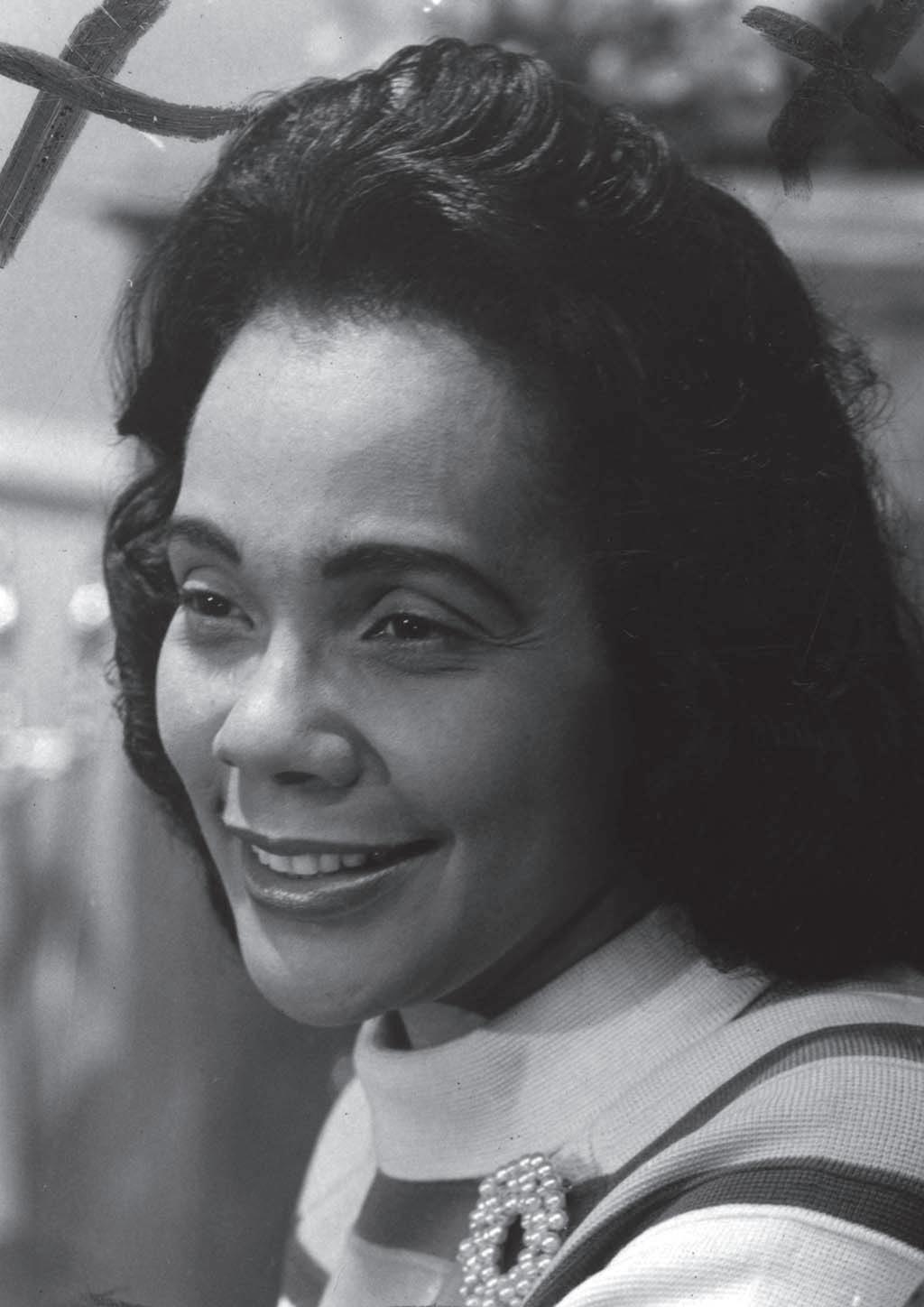
Coretta Scott and Martin Luther King Jr. married on June 18, 1953. By marrying a man committed to civil rights, Coretta Scott King became an activist in her own right.
In 1969 Coretta King announced plans to establish the Martin Luther King Jr. Center for Non-Violent Social Change in Atlanta, Georgia. She also led a 17-year national campaign to establish Dr. King’s birthday as a national holiday. She finally succeeded in 1986 when President Ronald Reagan signed the proclamation.
Coretta Scott King suffered a stroke and heart attack in 2005. Never fully recovering, she passed away on January 20, 2006 at a rehabilitation center in Mexico.
continued from page 6
There is ample evidence of racial inequality in health care. An analysis by the nonprofit Urban Institute published in 2021 found that Black patients are much more likely to suffer problems related to surgical procedures than white patients in the same hospital. And a study published in January, led by Dana-Farber Cancer Institute investigators, found that older Black and Hispanic patients with advanced cancer are less likely to receive opioid medications for pain than white patients. (Hispanic people can be of any race or combination of races.)
“I hear so many stories about how long it takes for people to get their diagnoses,” said Gigi Crowder, executive director of the Contra Costa County chapter of the National Alliance on Mental Illness,. Almost one-third of respondents in the California Health Care Foundation study — which looked only at Black Californians, not other ethnic or racial groups — reported having been treated poorly by a health care provider because of their race or ethnicity. One participant said her doctor advised her simply to exercise more and lose weight when she reported feeling short of breath. She eventually discovered she had anemia and needed two blood transfusions.
“I feel like Black voices aren’t as loud. They are not taken as seriously,” the woman told researchers. “In this case, I wasn’t listened to, and it ended up being a very serious, actually life-threatening problem.”
Southern California resident Shaleta Smith, 44, went to the emergency room, bleeding, a week after giving birth to her third daughter. An ER doctor wanted to discharge her, but a diligent nurse called Smith’s obstetrician for a second opinion. It turned out to be a serious problem for which she needed a hysterectomy.
“I almost died,” Smith said.
Years later and in an unrelated experience, Smith said, her primary care doctor insisted her persistent loss of voice and recurring fever were symptoms of laryngitis. After she pleaded for a referral, a specialist diagnosed her with an autoimmune disorder.
Black patients also take on the additional legwork of finding doctors they think will be more responsive to them. Ovester Armstrong Jr. lives in Tracy, in the Central Valley, but he’s willing to drive an hour to the Bay Area to seek out providers who may be more accustomed to treating Black and other minority patients.
“I have had experiences with doctors who are not experienced with care of different cultures — not aware of cultural differences or even the socialization of Black folks, the fact that our menus are different,” Armstrong said..
While the study shed light on how Black patients interact with medical professionals, Katherine Haynes, a senior program officer with the California Health Care Foundation, said further research could track whether patient experiences improve.
continued from page 8
Disparities in maternal and infant health, in part, reflect increased barriers to care for people of color. Research also highlights the role racism and discrimination play in driving racial disparities in maternal and infant health.
maternal and
resources focused on improving health materials and infant health outcomes and reducing disparities.
In June 2022, the Biden Administration released the Blueprint for Addressing the Maternal Health Crisis. The Blueprint outlines priorities and actions across federal agencies to improve access to coverage and care, expand and enhance data collection and research, grow, and diversify the perinatal workforce, strengthen social and economic support, and increase trainings and incentives to support women being active participants in their care before, during and after pregnancy. Recent federal legislation has expanded access to and helped stabilize Medicaid coverage during the postpartum period. Medicaid covers almost half of births nationally. However, historically, many pregnant women lost coverage at the end of a 60-day postpartum coverage period because eligibility levels are lower for parents than pregnant women in many states, particularly those that have not implemented the Affordable Care Act (ACA) Medicaid expansion.
SOURCE: Latoya Hill and Samantha Artiga, KFF Racial Equity and Health Policy Program; Usha Ranji, Associate Director, Women’s Health Policy
continued from page 11
Services for Veterans: The Courage to Call program is dedicated to improving mental wellness for Veterans, Active Duty, Reservists, National Guardsmen, and their families. The 24/7 helpline is available at 1-877-6987838 or 2-1-1 Option 4.

Services for First Responders: First Responders and their families can receive mental health support tailored to their needs by calling the Fire Captain Ryan J. Mitchell’s First Responders Behavioral Health Support Program at 1-833-YU-FIRST (1-833-983-4778).
Throughout May, visit the It’s Up to Us website at www. Up2SD.org for more resources and information.
Article courtesy of County of San Diego Behavioral Health Services
continued from page 11
Thankfully, people can slow or even prevent the progression from prediabetes to diabetes. Solid evidence demonstrates that people who are overweight and have prediabetes can substantially lower their risk of developing diabetes by losing 5-7% of their body weight (1014 pounds for a 200-pound person) and exercising two and a half hours per week, even by brisk walking.
Those with Medi-Cal, or some commercial insurance, can also enroll in a lifestyle change program under the National Diabetes Prevention Program to have a lifestyle coach to help with weight loss and an exercise journey. Many people became afraid to visit their doctor during the pandemic. In addition, almost everyone knows a friend or family member who has had complications from diabetes.
By typing “Take The Test Diabetes” into Google or an internet search engine, people can see if they might be at risk of prediabetes or diabetes. Those who do so, should discuss the results with their doctor. The most accurate way for a person to find out if they have prediabetes—or even diabetes itself—is through a blood test. San Diego County Public Health Services urges everyone to take control of their health as a partner with their health care provider and don’t let the fear of diabetes take control.
Article courtesy of County of San Diego Public Health Services.
At SDG&E®, our commitment to community begins with our 4,700 employees. We’re your friends, family and neighbors.



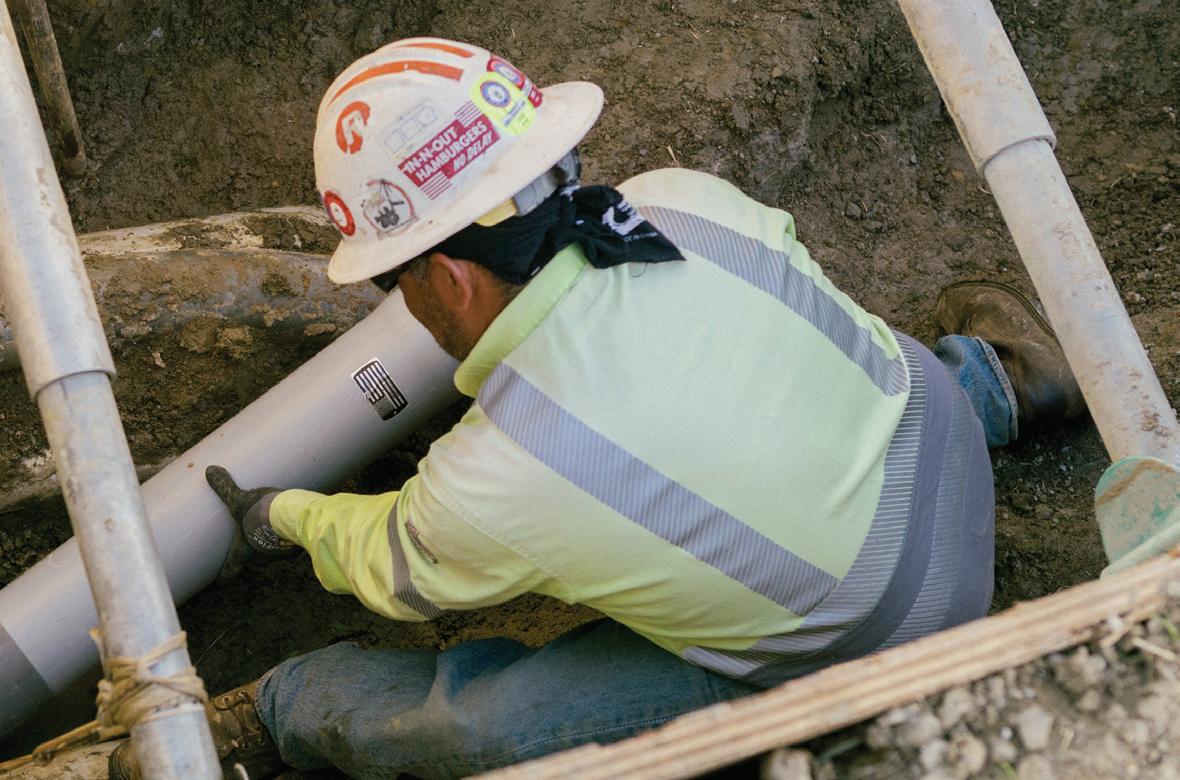
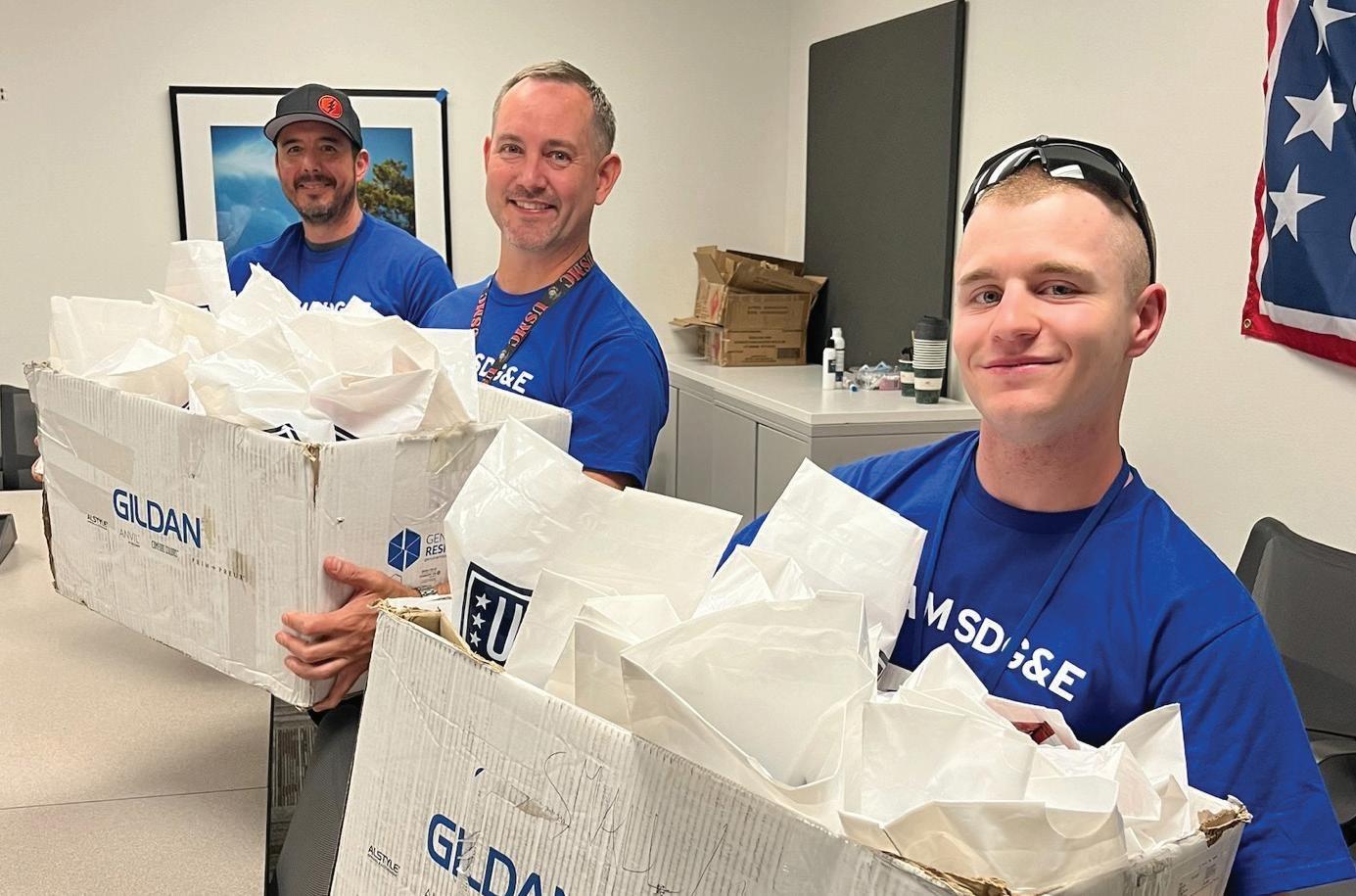
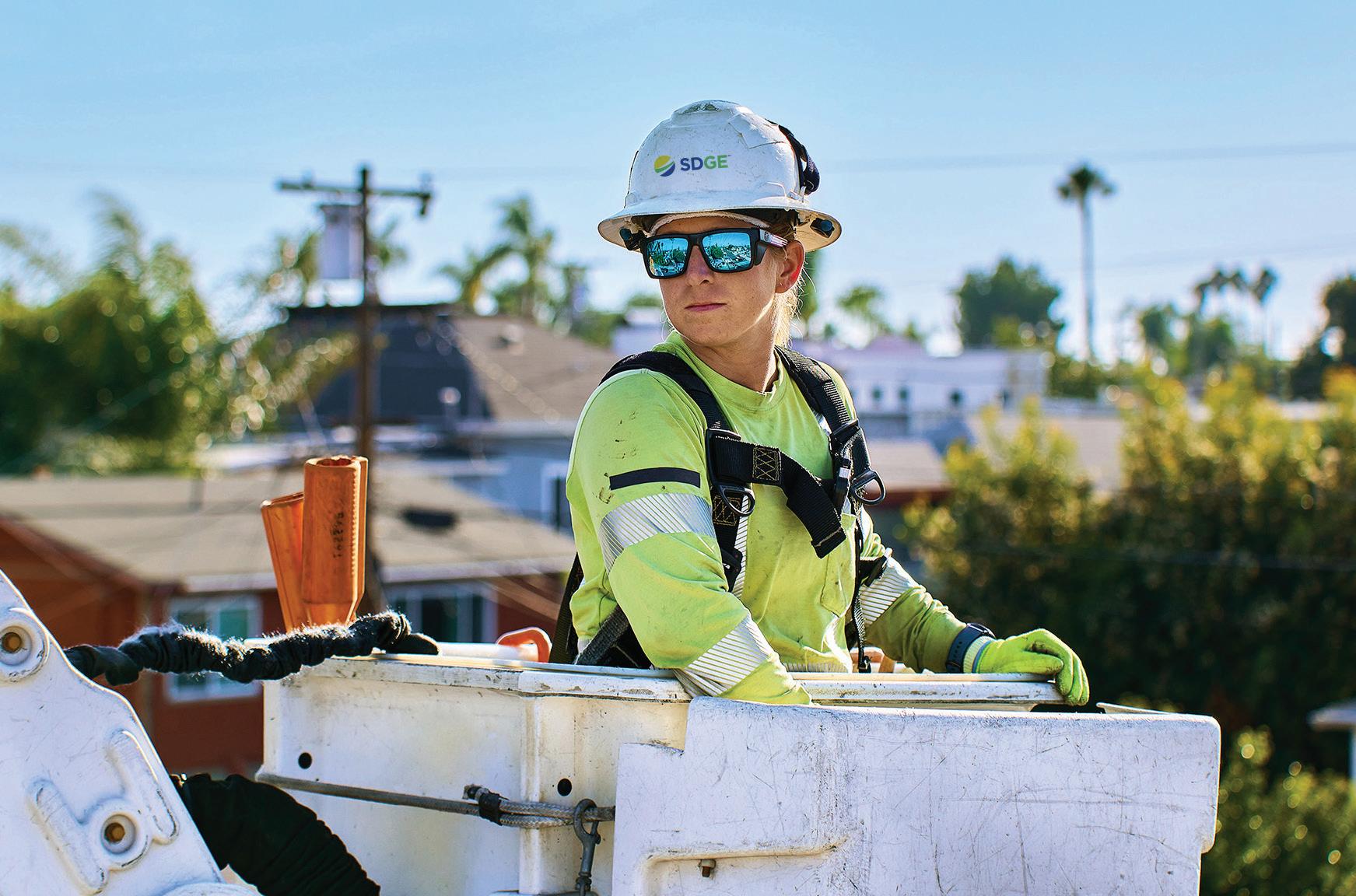
We’re proud of how our work helps power your lives. And, how every day we impact this community we call home.
• Dependable Service – #1 for keeping the lights on in the West for 17 years in a row1
• Clean Energy – 55% of our energy comes from wind and solar2

• Safer Communities – Industry-leading wildfire safety and mitigation program

• Beautified Neighborhoods – 60% of our powerlines are underground vs. the 20% national average
• Community Commitment – Nearly $100 million contributed to local nonprofits over the past decade
• Economic Driver – Over $400 million in products and services from local diverse businesses in 2022
While we are proud to provide these valuable services to you, we understand that affordable energy bills matter more than ever. Although SDG&E customers have on average the lowest residential electricity bills3 among the state’s major utilities, we are listening to you and know more needs to be done.
We’re fighting to remove costs from your energy bill, reforming the way electricity is priced to provide stability and aggressively pursuing federal funds to pay for new infrastructure.
There’s still work to be done, but we’re not going to shy away from it because progress is our promise to you
Always Forward.
Respectfully yours,
The Employees of SDG&E